AS FANNIE MAE’S FIRST LATINA CEO, PRISCILLA ALMODOVAR HELPS LATINOS BUILD GENERATIONAL WEALTH THROUGH HOMEOWNERSHIP P76

 The Leading Latinas Issue featuring leaders from Latino Media Network, Amazon Studios, Spotify, and more P74
The Leading Latinas Issue featuring leaders from Latino Media Network, Amazon Studios, Spotify, and more P74




we’ll do the rest TO GET 30% OFF WITH A MINIMUM QUANTITY OF 100 SCAN THE CODE FOR DISCOUNT For all your custom HOLIDAY PACKAGING enjoy 50% off your first order 50% OFF APPLIED AT CHECKOUT MAILER BOXES SHIPPING BOXES BUBBLE MAILERS & MUCH MORE Direct from Pratt www.pratt.com


For the seventh year in a row, our Leading Latinas issue spotlights our community’s most relentless champions: Latinas who have not only achieved extraordinary success but also paved the way for future generations


COVER: CASS DAVIS, FARAZ HYDER / ADOBE STOCK
PRISCILLA ALMODOVAR Fannie Mae JAVIERA BALMACEDA Amazon Studios SANDRA MARTÍNEZ Nestle Oceania JULISSA SOTO Julissa Soto Latino Health Equity Consulting CATALINA LAVERDE Spotify MÓNICA RAMÍREZ Justice for Migrant Women LARA BUESO BACH TelevisaUnivision REBECCA NÚÑEZ The MRN Agency STEPHANIE VALENCIA , ROSE-ANNE TIFRE , JESSICA MORALES ROCKETTO , SYLVIA BANDERAS COFFINET Latino Media Network Featuring 76 88 92 96 106 112 118 122 126 2024 3 Hispanic Executive

76
GUARDING AMERICA’S HOMEOWNERSHIP DREAMS
Housing financing expert Priscilla Almodovar is Fannie Mae’s first Latina CEO and, consequently, one of the America’s most influential leaders. A year into her tenure, the Brooklyn-bred Boricua reflects on her lessons learned and the privilege of creating new homeownership opportunities.
CASS DAVIS 4 Contents
HER WAY
Lynn Trevino-Legler took a nontraditional approach to shaping her career. Now, she’s the VP of legal and head of litigation for one of the largest trucking companies in the nation, Yellow.
CHANGE AGENT
Humana’s Alex Bernal shares lessons from working in different countries, in different industries, and various roles
KEEP YOUR EYES AND EARS OPEN
Sony Pictures Entertainment’s Maria Ortega shares lessons from her decades-long career in auditing, finance transformation, and leadership THE
Oracle’s Adriana Torres is a veteran of her industry but also its most eager student
How Catalina Laverde took ownership of her life and career to set the course not only for herself but also to show other Latinas how they can do the same ADVOCATE FOR YOURSELF
Evelina Rojas shares her work/life balance journey and how it’s made her a better leader at On the Border Mexican Grill & Cantina


LEARNING
NEVER STOPS
THE PROMISES WE MAKE
Contents Odds & Ends 6 A LETTER FROM THE EDITOR 10 THE ARTS 147 INDUSTRY INDEX 150 BEYOND THE MAGAZINE
50 62
14 138
62 5 Hispanic Executive MARVIN YOUNG (BERNAL), AMIE SANTAVICCA (TORRES)
42
106
42
America’s Future Is Latina FROM THE HISPANIC EXECUTIVE DESK

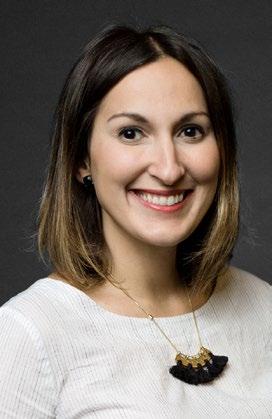 Vianni Lubus
VP, Hispanic Division and Head of Audience & Engagement
Vianni Lubus
VP, Hispanic Division and Head of Audience & Engagement
WELCOME TO OUR ANNUAL LEADING LATINAS ISSUE, A CELEBRATION of extraordinary women who not only excel in their respective fields but also embody the power and potential of a community driving change across the world.
Each year, our mission is simple: to honor those who are at the top of their game, breaking barriers, and paving the way for the next generation.
Our approach to the seventh edition is driven by understanding you, our community of educated, ambitious Latinas (and Latinos and allies). We know that what resonates most are not just stories of triumph but also narratives that surpass the confines of professional success and explore the intricacies of being a woman in business. As Latinas, this is our superpower. Our Leading Latinas embody resilience, courage, and triumph, and they inspire us all to embrace our potential and lead with strength.
Most of all, it’s that orgullo, the deep sense of pride, that deeply connects with our readers. In fact, I vividly recall the day our cover star, Priscilla Almodovar, was announced as the first Latina CEO in Fannie Mae’s eighty-year history. Witnessing her secure that seat isn’t merely a professional accomplishment. It’s a source of inspiration and empowerment, which is at the heart of why we celebrate Latina excellence in this issue and every issue.
As we delve into the stories of twelve remarkable women, we are reminded of our previous Leading Latinas from years past, including the record-breaker Zoe Saldana, actor-turned-business-mogul Jessica Alba, and voting rights activists Maria Teresa Kumar and Rosario Dawson. In
SHEILA BARABAD SARMIENTO 6 A Letter from the Editor
FOLLOW US ON TWITTER @hispanicexecmag
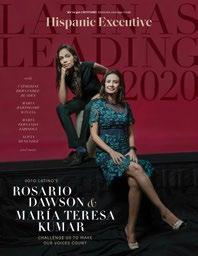

our 2023 issue, we also highlighted Kamala Harris, the first woman and woman of color to serve as vice president of the United States.
And now our 2024 Leading Latinas.
We kick off the issue in conversation with the trailblazer Priscilla Almodovar, who at the time of this writing is the only Latina CEO in the Fortune 500. As the story’s writer, Vivian Nunez, eloquently states, “it is no exaggeration to say that Almodovar’s work will leave a lasting legacy for the country’s housing finance system, and this legacy will likely impact every one one of our readers in one way or another.”
Javiera Balmaceda at Amazon Studios, not to be outdone by her famous actor brother, Pedro Pascal, is bringing Latin America’s most cherished stories to streaming and the big screen. Similarly, storytellerturned-advocate Monica Ramirez, founder of the Justice for Migrant Women, shares her moral and cultural imperative to tell the stories of the migrant workers—especially the women who give so much to the country while often laboring in unsafe conditions.
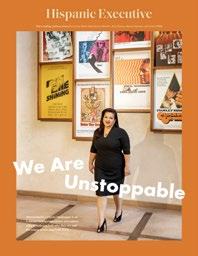

And, of course, no list is complete without the all-Latina C-suite at Latino Media Network, where Stephanie Valencia, Jess Morales-Rocketto, Sylvia Banderas Coffinet, and Rose-Anne Tifre are ensuring the nation’s Spanish-language radio (and other media) are served with the content and entertainment that serves their needs, not panders to them.
As we continue to amplify the voices of Leading Latinas, we invite our readers to share in this celebration. And don’t hesitate to let us know who we should cover next.
Porque —as Monica Ramirez, Eva Longoria, and America Ferrera like to say—she se puede
SUBSCRIBE TODAY AT HISPANICEXECUTIVE.COM/NEWSLETTER
Scan the QR code with your smartphone camera to subscribe to the newsletter.
7
Hispanic Executive
Featured Contributor
Edra Soto is an interdisciplinary artist and codirector of the outdoor project space the Franklin. Her work has been presented at the Smart Museum, the Museum of Contemporary Photography, the Chicago Cultural Center, Albright-Knox Northland, and more.
Creative
Editorial Director
Frannie Sprouls
Senior Editors
Melaina K. de la Cruz
Michele Cantos Garcia
Brittany Farb Gruber
Staff Writers
Noah Johnson
Billy Yost
Contributors
Zach Baliva
Will Grant
Frederick Jerant
Hispanic Executive® is a registered trademark of Guerrero, LLC
©2024 Guerrero, LLC. guerrero.co
1500 W. Carroll Ave., Suite 200 Chicago, IL 60607
Facebook: @hispanicexecutive
LinkedIn: @hispanic-executive
Twitter: @HispanicExecMag
Instagram: @hispanicexecmag
YouTube: bit.ly/youtubehemag
Reprints
Reprinting of articles is prohibited without permission of Guerrero, LLC. Printed in China. For reprint information, contact Reprints & Circulation Director Stacy Liedl at stacy@guerreromedia.com.
Natalie Kochanov
Vivian Nunez
Claire Redden
Joseph Stark
Art Director
Anastasia Andronachi
Designer, Hispanic Executive
Arturo Magallanes
Designer
Rebecca Kang
Photo Manager & Video Director
Cass Davis
Contributing Photo Editor
Sarah Joyce
Audience & Engagement
VP, Hispanic Division and Head of Audience & Engagement
Vianni Lubus
Director, Events
Jill Ortiz
Community Engagement & Communications Manager
Cristina Merrill
Social Media Manager
Suleidys Tellez
Corporate
CEO & Publisher
Pedro A. Guerrero
President, Group Publisher
Kyle Evangelista
Chief of Staff
Jaclyn Gaughan
Sales
VP, Enterprise Solutions
Aaron Meier
Senior Director, Sales
Hannah Tanchon
Director, Sales Onboarding
Shannon Borner
Enterprise Sales Executive
Stuart Ziarnik
Lead Recruiter, Guerrero Search
James Ainscough
Senior Director, Corporate Partnerships & DEI Solutions
Krista Horbenko
Director, Talent Acquisition & Engagement
Haylee Himel
Talent Acquisition Managers
Josie Amidei
Jordyn Gauger
Content & Advertising Managers
Allison Kolosick
Roman Magallanes
Alexis Ringquist
Aleksander Tomalski
Operations
Chief Operating Officer
Tere Pérez Lobatón
VP, Finance
David Martinez
Director, Circulation
Stacy Liedl
Staff Accountant
Natallia Kamenev
Head Developer
Jose Reinaldo Montoya
Senior Director, Client Operations
Cheyenne Eiswald
Account Manager
Abigail Stern
Senior Manager, Client Services
Rebekah Pappas
Manager, Client Services
Brooke Rigert
Communications Coordinator, Creative
Santiago Giordano
Industry Partners






8 Masthead
Hispanic Executive is published quarterly by Guerrero, LLC. To subscribe, visit hispanicexecutive.com/subscribe. For editorial consideration, please email info@hispanicexecutive.com. By submitting a letter, you agree to let us use it, as well as your full name, city, and state, in our magazine and/or on our website. We may edit for clarity. Hispanic Executive, 1500 W. Carroll Ave., Suite 200, Chicago, IL 60607, (312) 447-2370.
DON ’ T PANIC... IT’S JUST HIS-PANIC!
Have you ever gotten frustrated at someone who doesn’t know the difference between “año” and “ano”? Have you gotten offended at a Hispanic colleague who showed up late to your party, or wondered what the heck is up with all the new Latinx/Latine variants?
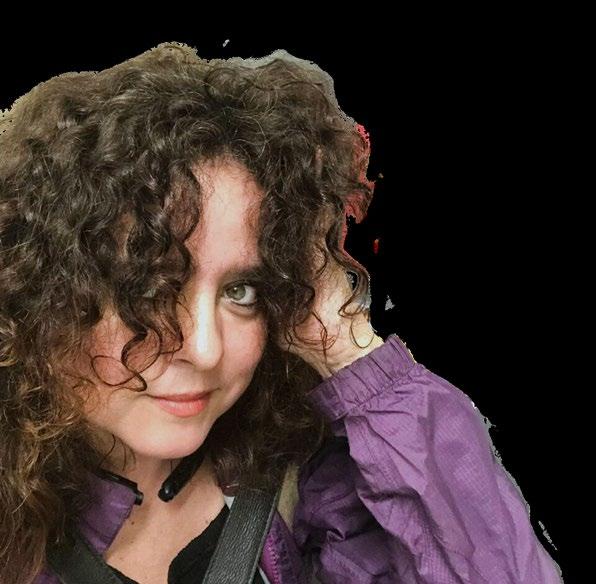
If so (or if you’re simply looking for a bit of a laugh), check out Laura Martínez’s new Hisplaining column. She began writing the column in 2022 to help today’s leaders smoothly navigate the multicultural business world, and Hisplaining has quickly become a favorite of our readers. But be warned—this column is handled with a serious dose of humor.
CHECK OUT LAURA’S COLUMNS ON OUR WEBSITE:
hispanicexecutive.com/ hisplaining
Second Languaging
WORDS AND INTERVIEW BY EDRA SOTO
NAVIGATING THE VAST LANDSCAPE OF art is a lifelong journey, where artists carve their unique path through years of experimentation and inspiration. Artist Dianna Frid has emerged on the other side of this exploration, confidently blending media, mediums, and textiles to create mesmerizing works of art.
Frid’s creations seamlessly bridge material texts and textiles, weaving touch and language into a captivating body of work. Her artist’s books and mixed-media pieces employ embroidery to unravel the interplay between writing and drawing, delving into the worlds of transcription, translation, and legibility. Her early experiences in her grandfather’s sewing shop profoundly shaped her artistic journey and her now-ability to merge art and needlework without rigid hierarchies.
As a professor at the University of Illinois at Chicago’s art department, Frid has earned international recognition, including the prestigious 3Arts Award, and support from institutions such as the Canada Council for the Arts and the Illinois Arts Council. Join us in this interview as we delve into Frid’s artistic odyssey and explore her creative process.
As a Mexican who initially immigrated to Canada, what led you to eventually settle in Chicago, where you’ve been for over two decades now?
I was born in Mexico City, and my family immigrated to Vancouver when I was a teenager. My family of origin still lives in Canada, and I have deep connections to the extraordinarily beautiful landscape of Western Canada and its cultural ramifications.
I went to college in the US, [first] in Massachusetts and then Chicago. That was my first foray into the city I now call one of my homes. I got my BFA from the School of the Art Institute of Chicago (SAIC), and shortly after I lived

in Oaxaca, Mexico, for several months before returning to Canada. It wasn’t until I decided to get an MFA in Fibers and Materials Studies at SAIC that I began to set roots in Chicago.
I have been living in Chicago since 1999. [Many] opportunities arose that kept me here. Eventually, the community, friendships, family, and my students kept me here. I am someone who has multiple homelands, and I have come to make peace with the beauty and challenges of that.
Your work regards the relationship between material texts and textiles. How has this relationship evolved through the years, and how have these materials become paramount to your work?
One develops a voice over a long period of time. In my case, only after working for many years—with my hands on materials and with words—have I been able to articulate in language what I do.
This is what I have learned: sewing is a form of drawing. For many years, through sewing on cloth, I’ve been reconstituting words to transform aspects of written language. Some of your readers may not know that the words textile and text come from the same Latin root,
texere. Texere means to weave. We wear texts when we wear cloth, so to speak. We can also say that books are woven texts.
I am a transcriber of texts, and this is akin to translation. Cloth and thread are part of the materials for translation. There are other materials, too. My work is truly a mixture of mediums, where cloth and thread keep recurring.
My maternal grandfather immigrated to Mexico City just before World War II. In Mexico, he became an established women’s tailor, [and his] workshop was packed with treadle sewing machines. His feet, and those of his small staff, set the mechanism of the Singers [sewing machines] in motion.
I remember the rhythmic sounds of the machines and the bodies gently swaying. These experiences of listening and paying attention were formative. Nobody expected me to learn how to sew, and, as a result, I was not taught. But I gravitated to textiles on my own, particularly when I was an undergraduate figuring out how to splice film together and how to weld. I needed to touch the thing I was making, and this remains true today. I basically taught myself how to use thread. To this date, my technique is pretty rudimentary and crude. That does not mean it is not by choice that I work “half-knowing.”
10 The Arts
“Songbook #1 (After James Baldwin),” 2021. Canvas, cloth, thread with pewter, aluminum, and silver leaf Closed, 12 x 10 inches.
TOM VAN EYNDE
You have temporarily relocated to Oaxaca, where you have been developing a series of artworks inspired by a collection of rare books in the Burgoa Library. Why are you pursuing this project there?
Many of the Burgoa Library’s holdings consist of rare books where larvae and other insects once nested. These wormholed books are extraordinary, and they have been the focus of my research for many years. Instead of seeing the Burgoa books as damaged, I have come to understand their beautiful, wormholed pages as invitations to witness the inevitable transformation of all matter. There is a thin line between seeing previously inhabited books as destroyed and seeing them as imaginatively legible. My project raises questions around this fragile tension and focuses on the latter.
My curiosity concerning wormholes comes from my human love for books, through which I also recognize a parallel nonhuman need for these books to function as nests: as places where we can also be born and transformed. As a bibliophile and as an artist, it makes sense for me to explore the ideas and possibilities that arise in response to the collection of these rare books.
You are an avid reader who also makes artist’s books. You have referred to the book, as form and as vessel, as the perfect technology. What goes into making an artist’s book?
Typically, an idea for an artist’s book arises years before I know how to realize it, and it quietly obsesses me until I figure a few things out. At other times, the sequences of pages that constitute the book form arise from a mysterious place, and it seems that the book makes itself and I become a channel. The latter is rare.
The artist Ulises Carrión said that “a book is a sequence of moments.” When I first read that sentence as an undergraduate, I experienced a bolt of resonance. So, when I begin a book, I start by very loosely envisioning a sequence. Occasionally, when there is text that flows linearly, the sequencing is informed by this. I work with what will eventually become bound as a book, with the pages out of sequence arranged on a wall. At that early stage, the book is a puzzle with movable parts, and my motto is “edit, edit, edit.” It can be a rich process, albeit a humbling one.
Lately, I have been thinking of how an artist’s book is akin to a good song. It starts and lures you through a melody or tune that is not linguistic at all. There is an emotional buildup that you arrive at through the combination of rhythm (sequence), form, and content. If by the end of a song if you are moved, the song stays in you. This is what I seek.




EVAN JENKINS 11 Hispanic Executive
“We Have No Word in English For This,” 2021. Canvas, aluminum, paper, paint, embroidery floss, 76 x 60 inches.
“Notations #5 (Boustrophedon),” 2015. Image transfer on cotton, embroidery floss, paper, linen, 14 x 10 inches.
“Weave,” 2015. Canvas, paper, embroidery floss, silk, aluminum, fabric, paint, 78 x 60 inches.
Dianna Frid Artist

Besides literature, what other things influence or inspire your visual arts practice?
Second languaging is an undercurrent in my work. English is my second but most fluid language because I have lived as an adult mainly in English. Yet, I can feel things shifting. Different emotions arise in different languages. You may ask, what does this have to do with my work? When there is a meaning [and] description for something in one language but lacks [some] correspondence in another, this accentuates how language and translation are mere approximations. I see my work as an act of transla-
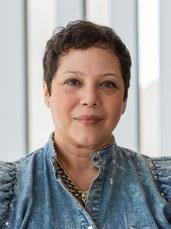
tion, whether there is syntactical language (literature, poetry) or not.
What types of reflections do you hope viewers take from experiencing your work?
Hopefully, my work invites the viewer to engage in acts of interpretation—and this can happen visually, sensually, and intellectually. At the same time, I hope is that if someone doesn’t understand the work, that they rest assured that it is OK to have an experience of it, nonetheless. Understanding is fluid and enriching, even when one cannot articulate it. Every so often, I only
Puerto Rican born, Edra Soto is an interdisciplinary artist and codirector of the outdoor project space, the Franklin.
Recent venues presenting Soto’s work include Crystal Bridges Museum of American Art’s satellite, the Momentary (Arkansas); Albright-Knox Northland (New York); Chicago Cultural Center (Illinois); Smart Museum (Illinois); and the Museum of Contemporary Photography (Illinois).
Recently, Soto completed the public art commission titled Screenhouse, which is currently at Millennium Park in Chicago. Soto has attended residency programs at the Skowhegan School of Painting and Sculpture, Beta-
begin to understand aspects of my work after it’s out in the world.
What are some of the upcoming projects you are the most excited about?
Right now, I am fully devoted to making work for a considerable exhibit that will take place in Oaxaca close to 2025. This exhibit is the culmination and a response to the books with wormholes that I have been studying in Oaxaca for nearly ten years.
I’m in the thick of the process of planning, testing, and making all kinds of work [including] embroideries, texts, photographs, artist’s books, video, drawing, sculpture, and, on top of all that, a catalogue.
As you can deduce, the exhibit will be a constellation of works. Video is new to me, and I am thrilled to be collaborating with Karen Michelsen-Castañón, a Peruvian artist that I met in Vancouver years ago. MichelsenCastañon is coming from Berlin to work with me in Oaxaca. Writer and scholar Dr. Carla Nappi has been writing experimental fiction alongside photographs that I have taken. I’m at an exciting moment in this project, as I am trying new things and have yet to give form to myriad ideas. It is a time for experimentation, for sure. Trying new ways of working can also be challenging. And yet, I don’t believe an artist can grow without experimentation and risk.
So, this is where I am now. It is both humbling and emboldening.
Local, the Robert Rauschenberg Foundation Residency, the Headlands Center for the Arts, Project Row Houses, and Art Omi, among others. Soto was awarded the Efroymson Contemporary Arts Fellowship, the Illinois Arts Council Agency Fellowship, the inaugural Foundwork Artist Prize, and the Joan Mitchell Foundation Painters & Sculptors Grant, among others. Between 2019 and 2020, Soto exhibited and traveled to Brazil, Puerto Rico, and Cuba as part of the MacArthur Foundation’s International Connections Fund.
Soto holds an MFA from the School of the Art Institute of Chicago and a bachelor’s degree from Escuela de Artes Plásticas y Diseño de Puerto Rico.
TOM VAN EYNDE, NATHAN KEAY (SOTO) 12 The Arts
“The River, Twice (after translations of two Heraclitus fragments: left, Brooks Haxton, 2001; right, G.T.W. Patrick, 1889),” 2023. Canvas, paper, ink with mica, acrylic paint, embroidery floss, copper leaf, gold leaf, aluminum foil strip, 52 x 34 inches.

14. Lynn Trevino-Legler, Yellow
20. Jeffrey Mercado, Webster Bank
24. Nicolas Perez Stable, Wings Capital Partners
28. Rina Teran, Constellium
32. Estefania Souza, National Instruments Corporation

LEGAL LUMINARIES



Meet the trailblazing leaders who are reshaping the future of the legal industry with their passion for innovation, diversity, and leadership within the legal profession

TKTKKTKTKTKT
HTGANZO / ADOBE STOCK (KNEELING ANGEL, THE THINKER, WINGED VICTORY, SEATED ANGEL, AND LAOCOÖN AND HIS SONS), RAWF8 / ADOBE STOCK (PILLAR) 13 Hispanic Executive
Lynn Trevino-Legler took a nontraditional approach to shaping her career. Now, she’s the VP of legal and head of litigation for one of the largest trucking companies in the nation, Yellow.
 By Zach Baliva
By Zach Baliva
HTGANZO / ADOBE STOCK 14 Legal Luminaries

ALLISON CARENZA
15 Hispanic Executive
Lynn Trevino-Legler VP of Legal and Head of Litigation Yellow
LLYNN TREVINO-LEGLER DOESN’T COME from a family of lawyers, but she has something that can’t always be taught: purpose.
“Any success I can claim is the result of hard work, determination, and having a few critical mentors along the way who believed in me,” she says.
Today, as vice president of legal and head of litigation at Yellow, Trevino-Legler is helping lead the iconic freight and trucking company through one of the most difficult times in its long history. On August 6, 2023, Yellow Corporation filed for Chapter 11 bankruptcy protection after a long public battle with the Teamsters union.
It’s a challenging road for the company, but these are the types of situations TrevinoLegler has spent her entire career preparing for. Actually, the preparation started long before her first day at Yellow and even before she entered Polsinelli as an entry-level litigation associate in 2008.
She was born and raised in Texas. She eventually landed in Kansas City, Kansas, and grew to love life in the heart of America. After earning a degree in journalism, public relations, and Spanish from Kansas State University, she set her sights on law school. “I wanted to go to a small school in a capital city where I would both get to know people on campus and be around the state legislature,” she recalls. Trevino-Legler enrolled at Washburn University School of Law in Topeka, Kansas, which she refers to as the “gem of the Midwest.”
That’s where dedicated professors and educators encouraged Trevino-Legler to take her disciplined approach even further. “A smaller law school helped me thrive because I was able to be more engaged and had more personal attention from professors who became my mentors,” she says.
One professor offered a particularly memorable piece of advice. “Gravitate to the people and jobs that see something special in

RAWF8 / ADOBE STOCK
16 Legal Luminaries
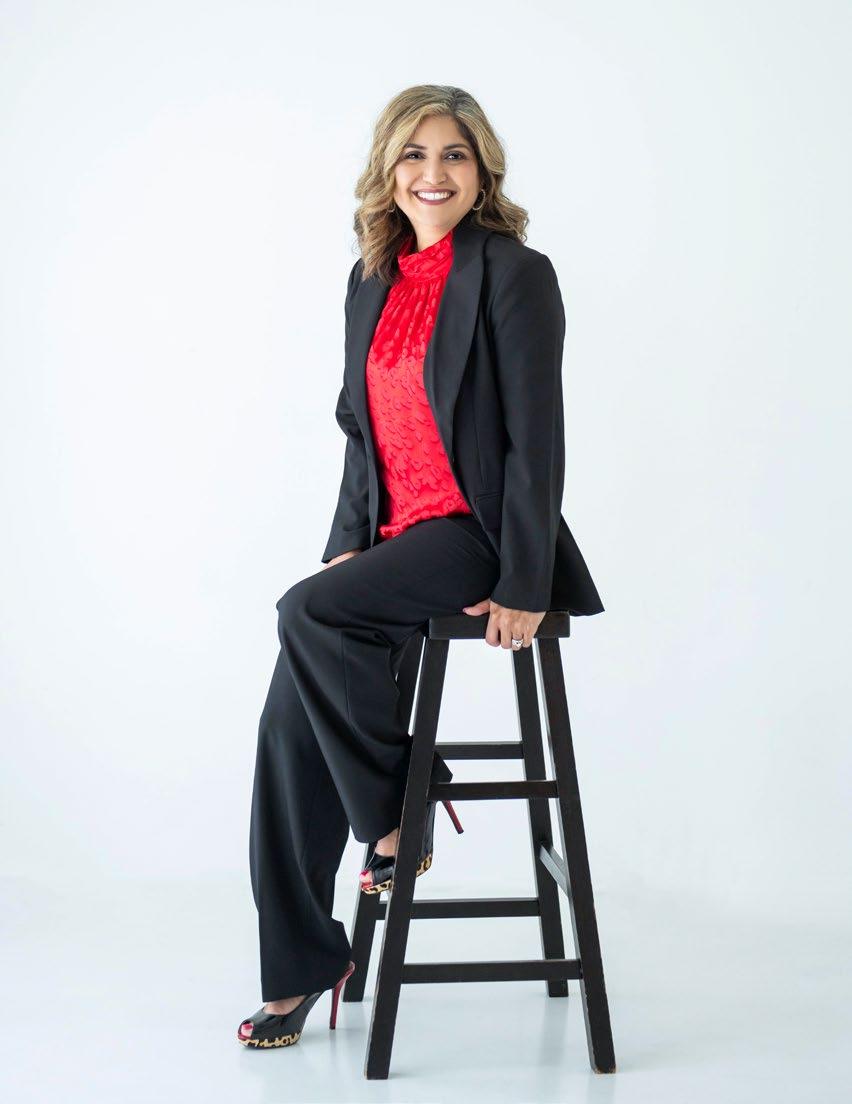
ALLISON CARENZA 17 Hispanic Executive
you and recognize what you have to bring to the table,” Trevino-Legler recalls. “You take the little pieces of wisdom that people share and that you learn from your experiences and put them in your pocket. As you continue your journey, you draw on those experiences and they help shape your perspective and guide your career.”
A decade as a litigator at Polsinelli gave Trevino-Legler plenty of time to collect nuggets of wisdom from her various mentors and experiences. She intentionally took on cases and issues that would give her broad exposure and prepare her for an eventual transition to an in-house position. Trevino-Legler joined a financial services firm as its senior employment attorney in 2018.
“Leaders here saw me and respected me as a female and as a Latina. They respected that I brought something unique to the table through my experience, energy, and passion.”
undergoing an incredible transformation. I wanted to be part of it and build the best team I could to fight for Yellow,” she says.
Trevino-Legler got a big assignment. With fourteen thousand tractors on the road and forty thousand trailers moving freight twenty-four hours a day, Yellow faced a high volume of claims and litigation regarding drivers, trucks, and accidents. She focused on legal operations and created new positions to identify and increase efficiencies in litigation and claims management processes.
In 2022, she joined Yellow, when company was in the midst of a public transformation. Despite the tough landscape, Trevino-Legler remained determined to apply her skills and experience to help a top company. “Advising a large corporation from a critical in-house legal position was my dream. Yellow was
In addition, she leveraged technology to implement automations and other solutions designed to generate faster outcomes and better results for employees, leaders, clients, and shareholders. Trevino-Legler built a team that was equipped with information, technology, and a clear litigation strategy to help mitigate associated risk.
While Trevino-Legler got a big assignment, she also got a lot of support from Yellow’s general counsel and its CEO. “Leaders here saw me and respected me
18 Legal Luminaries
Hispanic Executive
CARR ALLISON is very proud to honor and congratulate our long-time friend Lynn Trevino-Legler.

as a female and as a Latina. They respected that I brought something unique to the table through my experience, energy, and passion. They gave me the opportunity to build a department that was critical [to] the success of the business,” she explains.
When she first went in-house, Trevino-Legler helped advise a financial investment firm through an acquisition. That experience informs how she leads during this difficult phase. “Yellow doesn’t need me less right now. They need me more,” Trevino-Legler says.
Even with everything she’s facing, Trevino-Legler reserves time to
mentor the junior lawyers she encounters. She talks about vision, purpose, and long-term career goals. Most young attorneys, she says, need to be reminded to leverage their resources and learn from those that have come before them.
She also reminds them to take time to fill their cup so they have the energy and stamina to invest in all the priorities in their lives. TrevinoLegler hits the gym at 5:15 a.m. every day. She also makes sure to get plenty of quality time with her family. Doing so refuels her energy so she can keep her high-performing legal teams moving forward.
For more than thirty years, Carr Allison has represented the motor carrier industry in lawsuits throughout the US. We have seen the best. No one has demonstrated more talent and dedication to their responsibilities than Lynn Trevino-Legler. Congratulations on this special honor. No one deserves it more. Your future is bright.

No one deserves this recognition more. Here’s to a very bright future!



HTGANZO / ADOBE STOCK
19
www.carrallison.com
From his own schooling to supporting local scholarship programs, Webster Bank’s Jeffrey Mercado recognizes the value of education and building strong relationships
 By Natalie Kochanov
By Natalie Kochanov
HTGANZO / ADOBE STOCK 20 Legal Luminaries
JJEFFREY
MERCADO REMEMBERS WAITING tables and lifeguarding to help pay for his tuition at the University of Maryland, where he studied economics. But it was a different type of job—an internship in investment management—that truly set him on the path to where he is today.
“I interned at Salomon Smith Barney, and that’s when I got introduced to the world of finance,” Mercado explains. “I realized that I really liked working with clients and coming up with a plan to help them reach their goals.”
Mercado continues to thrive on working with clients in his current role leading the law firm banking group at Connecticutbased Webster Bank. He brings a wealth of knowledge from both his longstanding tenure at Wells Fargo and the educational experiences he has sought out throughout his career.
He got his start as a financial specialist in the branches of First Union, which merged

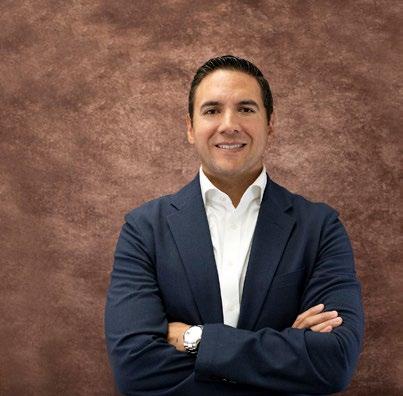
with Wachovia prior to the latter’s acquisition by Wells Fargo. As he advanced within the organization, he moved to Los Angeles to head up Wachovia’s sales expansion in Southern California, before returning to the East Coast in the wake of the 2008 financial crisis. He ultimately moved into the law firm group at Wells Fargo—a precursor to the work he now does at Webster.
In the midst of growing his career at Wells, Mercado became a Certified Financial Planner and earned his executive MBA from Columbia Business School. “My parents moved to the United States [mother from Ecuador and father from Puerto Rico] at a very young age,” he notes. “My mother worked at a sewing factory for many years before transitioning
Jeffrey Mercado Segment Leader and Senior Managing Director for Commercial Banking, Law Firm Banking Webster Bank ANNIE LA, RAWF8
/ ADOBE STOCK
21
Executive
Hispanic
“I used to think that to be a top performer, you had to do things a certain way. I’ve since learned that everyone can be successful in their own way.”
22 Legal Luminaries websterbank.com Every day, you help make our community a better place to live. We do our best to support you, your organization and the people you serve. We’re always proud to help our neighbors. Celebrating your tireless COMMITMENT TO OTHERS. Webster Bank, N.A. Webster, Webster Bank, the Webster Bank logo, and the W symbol are registered trademarks of Webster Financial Corporation. © 2023 Webster Financial Corporation. All Rights Reserved.

to customer service, and my father was a welder for thirty-five years.”
His parents instilled the importance of education in Mercado, as well. “When I went to Columbia, we did an exercise where we had to figure out our values,” he adds. “One of mine was education.”
Indeed, Mercado credits going back to school with shifting his mindset at work, away from merely executing the business strategy and toward thinking about the strategy itself. When he connected with Sterling National Bank, now part of Webster, he recognized it as an organization where he could put that new perspective into action.
“They had an existing law firm banking team. I was brought in to help grow that team, build out the strategy and the products on the deposit and credit side, and to customize the credit underwriting specifics for law firms,” he elaborates.
Mercado quickly identified a way to bolster the bank’s law firm business by targeting a demographic outside the corporate firms on which Wells Fargo and its competitors tended to focus their energy. “I saw an
opportunity for us to offer a similar whiteglove service and similar products on the credit side, but we could offer it to midsize to large law firms,” he says.
Dedicated exclusively to law firm clients, Mercado’s team at Webster has a unique understanding of what its clients need and want. “One of our biggest differentiators—we’re one of only a handful of banks in the country to do this—is that we give law firms the ability to print out official bank checks right from their office,” he says. “And they love it. The bank has spent money investing in technology to make their life easier.”
Mercado also has an understanding of how best to support his team members as individuals. “I used to think that to be a top performer, you had to do things a certain way,” he admits. “I’ve since learned that everyone can be successful in their own way. If I have someone who loves networking, I can leverage that person to attend a bar association conference or an event.”
He strives to lead by example, which means he often sits in on client calls or attends in-person events to keep a finger on the pulse.
He stays involved in the community—and builds relationships with local bar associations—by volunteering, including through partnerships with the Nassau County Bar Association and the Hispanic Bar Association of New Jersey.
“When you sign up to be a corporate partner of the Hispanic Bar Association of New Jersey, part of the sponsorship dollars are automatically allocated toward their scholarship fund to support law students in need,” he notes. “The ability to provide students with financial support through scholarships programs like the Hispanic Bar Association of New Jersey has built should be a model other bar associations should seek to replicate.”
By strengthening ties externally and innovating on internal products and services, Mercado is committed to keeping Webster at the top of its game. “We can compete with any bank out there. I’m confident that our team can talk to any CEO, CFO, or managing partner and find something that we can do for them,” he says. “There are so many different ways we can help law firms of all sizes.”
HTGANZO / ADOBE STOCK
23
Hispanic Executive
 Nicolas Perez Stable reflects on the choices that helped him grow into more significant roles in private equity
Nicolas Perez Stable reflects on the choices that helped him grow into more significant roles in private equity
HTGANZO / ADOBE STOCK 24 Legal Luminaries
By Billy Yost

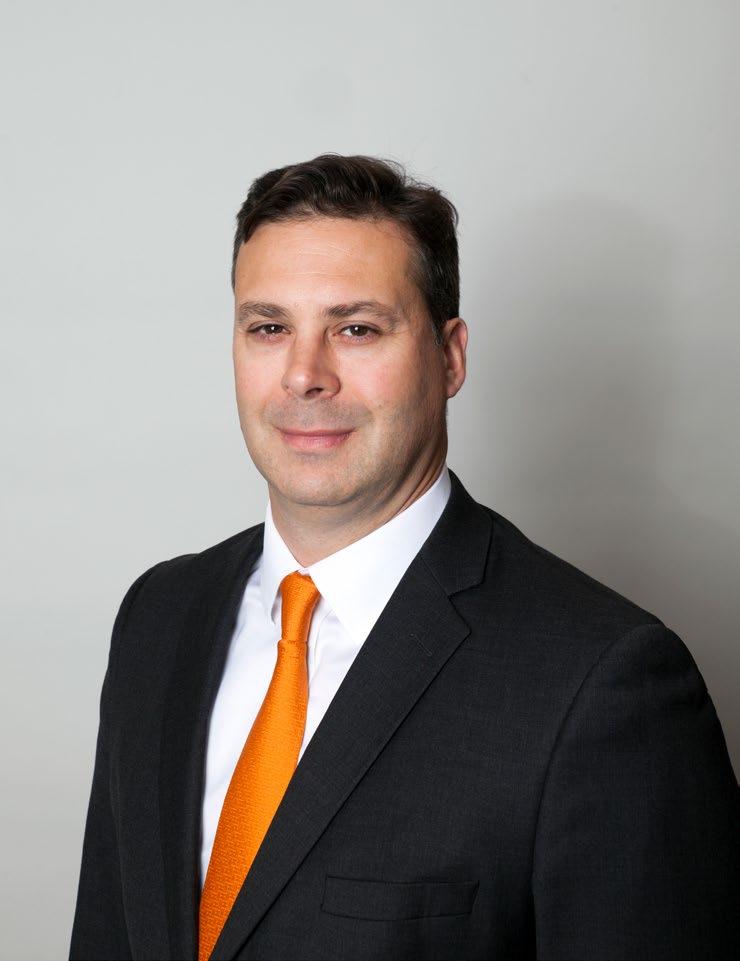 ELIZABETH BOOCKS
ELIZABETH BOOCKS
25
Nicolas Perez Stable COO and Chief Legal Officer Wings Capital Partners
Hispanic Executive
IIT’S NOT EVERY DAY THAT HISPANIC
Executive gets to check in with an executive more than a decade after their first appearance in the magazine. In 2012, Nicolas Perez Stable was serving as senior vice president and lead counsel at GE Capital Aviation Services. In any room he walked into, Stable had the weight of the GE name behind him. But the size of GE, like any massive organization, meant Stable’s chances of continuing to grow into a more prominent role might be a long way off.
“Had I stayed at GE, it might have taken a very long time to get to the role I have today,” Stable says. “Instead of waiting my turn at a larger organization, I decided to take a leap out of the safety of that nest and into private equity, where I knew I could make a bigger impact.”
In essence, Stable spread his wings. As both chief operating officer and chief legal officer at Wings Capital Partners, he has repeatedly gambled on himself over the past decade, seeking out chances to evolve and contribute significantly at the intersection of aviation and private equity.
TAKING FLIGHT
It’s not necessarily a “happily ever after” story but, for Stable, that’s precisely the point. After leaving GE, Stable took on an incredibly challenging turnaround role in oil and gas at a time when the market was at its worst. That private-equity-backed company, CHC Helicopter, went through an extensive restructuring that while successfully culminating in a half a billion-dollar capital raise, wasn’t the long-term business environment where Stable knew he would thrive.
“I have worked through boom times and crisis times at every stage in my career,” Stable says. “When I began at Wings, the challenge was how fast we could grow our aircraft portfolio. And, up until COVID, we doubled the portfolio every year, amassing $2 billion in aircraft at our peak. But then COVID hit, and we faced a different set of operational and financial challenges.”
While the pandemic hit the aviation sphere with severity, Stable says his previous experience continued to pay dividends. He’d already worked through a severe finan-
cial crisis and the deep downturn in oil and gas, so surely, he could help navigate a global pandemic in aviation.
“All of my adaptability and creativity managing through crises just came back to the forefront,” Stable explains. “I’ve spent my career working through complicated and challenging situations, and I was able to bring this experience to the private equity setting. Everyone had to hunker down to make it through COVID, but what I found was that it was imperative to understand the stressors and discuss them openly with our customers and the board to solve the problems.”
Stable believes that openness and transparency are a part of the Hispanic identity that have shaped his leadership and adaptability across multiple spaces and business cycles. Outside of his day job, Stable has been an active member of the Hispanic National Bar Association’s PODER25 initiative to increase the number of Hispanic attorneys occupying senior positions within corporate legal departments.
Stable has spoken on panels on behalf of the organization, but more importantly, he believes
26 Legal Luminaries

in the one-on-one interaction and mentorship he’s always ready to engage in. Stable’s mantra is “My Rolodex is your Rolodex,” and he’s always prepared to make a connection and help others who may be at a crossroads in their career. Stable knows the challenge of leaving a large organization in search of a place where you can make a larger impact, and he wants to help more Latinos find their way to do that in the private equity space.
“I’ve mentored some executives who were a step away from being a general counsel or in private practice looking to go in-house,” Stable explains. “I want to be there to help those people make that big step and encourage them to bet on themselves. Sometimes it’s hard to take the leap and the risk, but I tell people that doing so can be meaningful and life changing.”
THE IMPORTANT TIME
This stage is an important one for Stable, too. He has successfully transitioned into a new space, from a massive organization to a smaller team where his efforts make a far wider impact on the company’s bottom line. He’s helped manage organizations through very tough times, and the bets he’s
placed on himself every step of the way have continued to pay off.
One area, however, in which he is not willing to gamble is his family. The father of four says he proudly wears his family on his sleeve and believes that a balance between work and family is paramount. It’s not uncommon for one of Stable’s children to poke their head into a video call with his team now and then, and the executive says that the value he places on his family has greatly impacted the way he leads his team at work.
“I try to model how much I value my family to my team so that they feel open to doing the same,” Stable says. “The best way to encourage people to take the time they need to be with their loved ones is by doing it yourself.”
For Stable, that means Friday nights will always be family movie nights with his kids. And although it may not be quite as relaxing, the executive also a mean chef who leans into his Cuban heritage by cooking for and celebrating with others. Sprinkle in a weekly pick-up basketball game with his friends, and a dash of yoga, and Stable seems to have found the perfect recipe for having it all, and all of it in service to those around him.

RESULTS YOU CAN TRUST
Founded in 1931, Weil, Gotshal & Manges LLP has been a preeminent provider of legal services for more than 90 years. With offices on three continents, Weil continues to be a pioneer in establishing a geographic footprint that has allowed the Firm to partner with clients wherever they do business.
HTGANZO / ADOBE STOCK
27 Hispanic Executive
Gotshal & Manges LLP
Weil,
weil.com
Rina Teran calls on more leaders to step into sponsorship roles in order to drive change and open doors for women
 By Billy Yost
By Billy Yost
HTGANZO / ADOBE STOCK 28 Legal Luminaries
R
Rina Teran US Chief Counsel, Chief Securities Counsel, and Assistant Corporate Secretary Constellium
RINA TERAN DRAWS A DRASTIC difference between the concepts of mentorship and sponsorship. The words are used interchangeably at present, but the current US chief counsel, chief securities counsel, and assistant corporate secretary at Constellium believes that for more women and Latinas to find their way into senior positions, that difference needs to be understood and acted upon.
“A mentor is that person who guides you, who helps you grow, and cultivates your development, which is incredibly helpful,” Teran says. “Sponsorship is where I see the most critical need today for women, especially for Latinas. For me, a sponsor is someone in a position of power that can actually open doors for you and help push you through those doors. Sponsors are so much more rare, and I really believe we need more people stepping up into that role.”
You don’t need to look around much to understand why Teran is so adamant about the importance of sponsorship in the corpo-
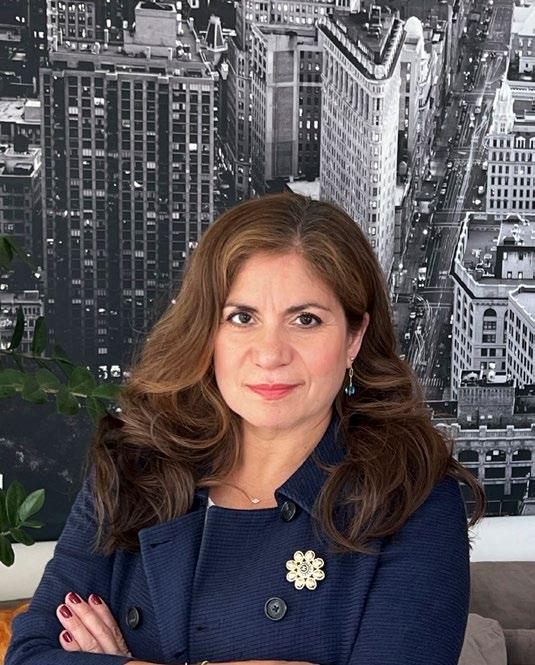
rate arena. When it comes to women in in-house legal roles, even in Teran’s adopted and mostly lifelong home of New York City, gender equity is brutally low. When it comes to diverse women, it’s much worse.
Thankfully there are women like Teran, an attorney with twenty-plus years of experience and a self-identified “securities nerd” who has worked her way up throughout her career to a position where she is able to be that sponsor whenever she has the opportunity. And she’s willing to have those hard conversations to push for change.
Case in point: Teran is tasked with cultivating outside counsel relationships for Constellium in North America. As just one example, during the COVID-19 pandemic, she requested that a firm source a female attorney to lead certain matters, preferably one with
a diverse background. When Teran met the attorney, the outside counsel was honest about the fact that no one had made that request before in her career and unless Teran had specifically requested her, she wouldn’t have had the opportunity to work with Teran— despite being overly qualified for the role. Teran says she is grateful to firms that are embracing diversity and gender equity and making strident efforts to achieve more equality in law.
“I didn’t look for sponsors while I was coming up,” Teran explains. “Frankly, there weren’t many even if I had been. I’ve worked incredibly hard to get where I am, and I want to be that sponsor for anyone that I can. And I am willing to use that voice to propel this much needed change.”
Teran’s voice may have come later in life, at least in the United States. She was a young
COURTESY OF RINA TERAN

“In my career, I’ve had incredible women support me, and it’s now my turn to help open those doors for others. The fight is far from over in this quest, and we need all the support we can get.”
TKTKTKT
WLRK.COM
child in Ecuador when her parents moved to the US, and she and her elder sister stayed behind to live with their grandmother. Teran was just two-and-a-half, and so anytime she saw a plane in the sky, she believed it was her parents returning home. She would become so excited, running from window to window to see the plane, that she once fell down the stairs onto a cement floor and violently slammed her head. It wasn’t just a routine bump—in fact, a doctor wasn’t sure that Teran would make it through the night.
“That experience brought me so close to my sister, who is ten years older than me,” Teran remembers. “She called me her little miracle, as she wasn’t sure that I would live. She became like a second mom to me, and is one of the many reasons I am deeply committed to my family.”
When Teran was almost six, she and her sister came to America and moved to the South Bronx in New York City with their parents. Teran had to learn English and spent years as the “quiet one” in the classroom absorbing as much as she could around her. But soon, her test scores would demonstrate

that the quiet child wasn’t behind in the slightest but, in fact, was capable of doing great things.
Teran stated that education changed her life and credits her teachers with believing in her, helping her apply for scholarships, and opening doors for her early on that her family would not be able to do on its own. The commitment to studies and hard work was a given, but it was mentorship and sponsorship that would ultimately propel her to Columbia University and beyond.
There were constant struggles in the interim, but Teran says those prepared her to be the sponsor she can now be for those women around her who are working to rise. They see an executive leader and a recognized expert in overall legal issues and international securities work, well-suited for a general counsel role, given her constant drive to evolve and continuously learn as well as her
extensive experience throughout her career advising senior and executive management and corporate boards.
In Teran, women see someone willing to speak with them about their goals, desires, and efforts to pry open those doors by any means necessary—politely of course, Teran says with a laugh. Teran’s sponsorees may be in any function—including HR, legal, insurance, or finance—internal or external. She doesn’t care; she just wants to help.
The chief counsel says that now, more than ever, she hopes women will continue to support each other as they work to rise in their own careers. That shared bond of an understood struggle should unite, not divide them. “In my career, I’ve had incredible women support me, and it’s now my turn to help open those doors for others,” Teran says. “The fight is far from over in this quest, and we need all the support we can get.”
TKTKKTKTKTKT
HTGANZO / ADOBE STOCK 31
Executive
Hispanic
Estefania Souza reflects on her personal and professional life experiences that helped her go in-house at National Instruments— and be part of its merger with Emerson
 By Billy Yost
By Billy Yost
HTGANZO / ADOBE STOCK 32 Legal Luminaries
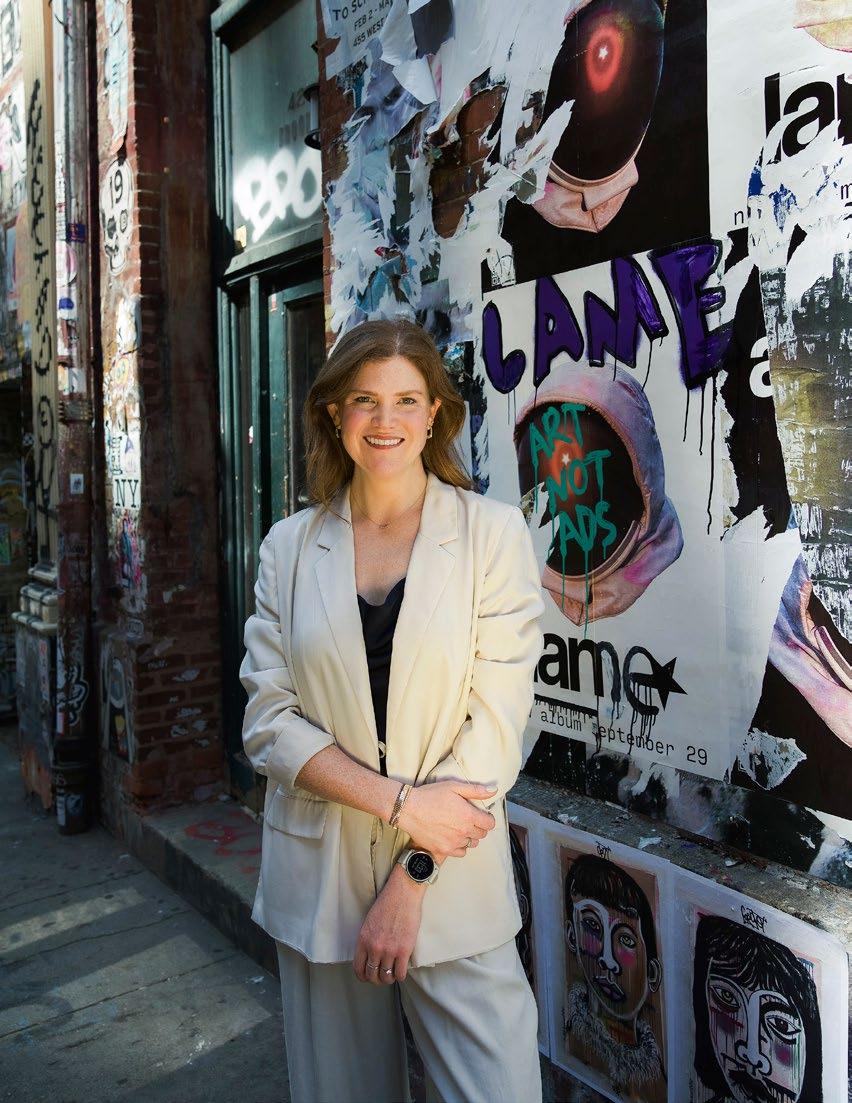
RENATA SOUZA
Estefania Souza Senior Corporate Counsel of M&A, Finance & Securities National Instruments Corporation
33 Hispanic Executive
ESTEFANIA SOUZA FEELS HER OWN
skill set widening in real time. The young attorney, who acts as senior corporate counsel at National Instruments Corporation (NI), is still adjusting to letting outside counsel handle the details—details she’s used to reveling in and ironing out to her exact preferences. The in-house counsel has been feeding NI’s acquisitive appetite on the M&A front and now finds herself navigating the biggest merger of her life.
Souza was deep into the weeds during her August interview with Hispanic Executive Fortunately, her systematic approach, willingness to grow, and bilingual and multicultural upbringing have helped prepare her for a truly wild moment in her career, one she is thankful for and one that is showing her true colors.
ADAPTATION EXERCISES
Born and raised in Mexico City, Souza says her first adaptation obstacle in her life was from her grandmother.
“I don’t personally remember this, but I was told that my grandmother wouldn’t
speak to us in Spanish,” Souza says. “She wanted us to learn English, which was her language, so she’d only speak to us in English. It may have been a bit of tough love, but that’s how I started to be bilingual. Speaking both English and Spanish fluently has really set me up for success.”
It wasn’t just the language. Souza’s family went to great efforts to expose her to a multicultural life, sending her to summer camp in Vermont, which exposed a very different universe to the young child from Mexico City. Back then her Mexican accent may have been strong, but the future lawyer would learn what it meant to make friends from different cultures, build consensus, and just get along in a place outside one’s comfort zone.
That adaptive advantage would serve Souza well. She’d start her legal career in New York, move to Australia two years later, and then move back to Texas, where she attended law school years prior.
“Even though not all of my teams have been multicultural, they certainly have all involved different work styles, personali-
ties, and backgrounds,” she notes. “Having to learn to adapt growing up has made the process easier in my career.”
GROWING BY LETTING GO
One adaptation that has been a little trickier than Souza expected has been moving in-house. Since coming to NI in December 2021—first as counsel before being promoted to her current senior counsel role—the attorney has gotten to engage in the work that appeals to her most: deal work.
In fact, she loves it so much, she’s found herself having difficulty letting go of the small details that, at this point in her career, should be left to outside counsel while she focuses on more strategic work. “I love the wordsmithing, drafting, and checking provisions that you typically leave to outside counsel to handle,” Souza says. “It’s hard to let that go because I love it. That’s still an area where I need to grow.”
Part of the reason Souza must let the smaller details go is because of the breadth of work she’s responsible for, even in a semispecialized role. On her first day on
E
34 Legal Luminaries
“Speaking both English and Spanish fluently has really set me up for success.”
The von BOETTICHER Corporate M&A team congratulates
Estefanía
Our successful cooperation on many transactions makes us proud and thankful.
You have always been more than a client.
You have been an inspiration to our team
At von Boetticher, we think and act globally like our clients


www.boetticher.com
35 Hispanic Executive
BERLIN | MÜNCHEN

the job, she found herself responsible NI’s proxy statement—a multimonth project that could have been overwhelming, but the lawyer saw it differently.
“I won’t say that I loved it,” Souza says, laughing. “But it was pretty amazing in that it skyrocketed me into feeling like part of the company. I got exposure to people from all departments, from the CEO, CFO, and other leadership across the organization. A lot of people I interact with every day now are people I initially met while working through that process.”
Since then, Souza has worked on several M&A, finance and real estate deals at NI.
BIG DEALS ON AND OFF THE CLOCK
And if the lineup of Souza’s deals weren’t enough, she is currently in the middle of one of the largest undertakings of her young
career. In April 2023, Emerson Electric Co. agreed to acquire NI for $8.2 billion. While it has certainly been overwhelming at times, by and large it’s been an incredible experience.
“I’ve learned so much in such a short period of time,” the senior counsel says. “It’s been liberating. It’s been interesting. At times, it’s been a little too much, but mostly, it’s just been awesome.”
Souza says there is still so much to learn, and that goes for her personal life, as well. The lawyer is continually working on learning how to relax. The systematic thinking that makes her so good at her job doesn’t clock out at the end of the day.
But whether it’s cooking with her husband, walking her dog, or letting her mind turn off while engaging in some therapeutic cleaning around the house, Souza continues to find new ways to grow in Spanish, in English, and in life.
HTGANZO / ADOBE STOCK
Editor's note: At the time of press, Estefania Souza is no longer at National Instruments. 36 Legal Luminaries WLRK.COM
MISSION
When one’s work makes an impact in the community, it transcends employment and becomes a calling. These executives have answered their call.
38. Carlos Quezada, Carriage Services 42. Alex Bernal, Humana
An Empathetic for the DISRUPTION Death Care Industry
BY BILLY YOST
TKTKTKT
How Carlos Quezada is transforming a very traditional space at Carriage Services
38 Mission
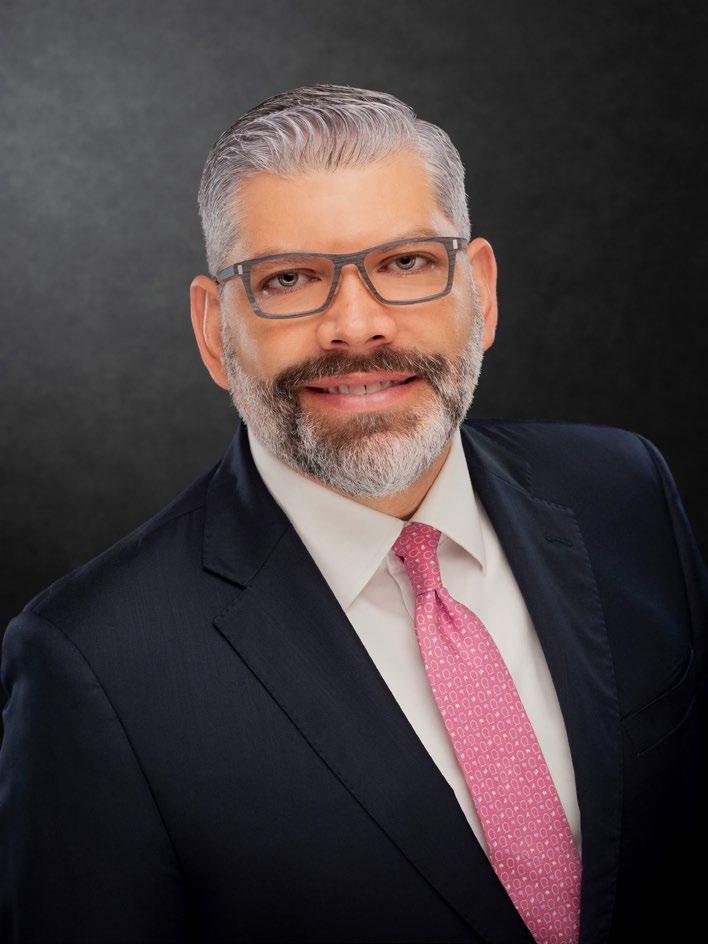
COURTESY OF CARLOS QUEZADA
39 Hispanic Executive
Carlos Quezada Vice Chairman of the Board and CEO Carriage Services

THE INDUSTRIES MOST READY FOR disruption are the ones you can’t conceive of changing—until they do. Carlos Quezada knows intimately that the death care industry can be better, more engaged, and of better service to people going through the hardest period of their lives.
Quezada joined Carriage Services in 2020 after helping kick off significant disruption at Service Corporation International, a major player in the industry. As Carriage Services CEO, he is intent on revolutionizing a very, very traditional industry, not just through technological innovation but also by transforming the customer experience.
“I know this sounds strange, but there is so much opportunity to transform this industry and make it more appealing to our customers,” Quezada explains. “We’re talking about death and mourning and people who are going through tremendous pain, but that doesn’t mean they should have to be content to experience that pain in an environment that never gets any better than right now.”
There is technological innovation, but Quezada begins illustrating his vision with a wealth of areas that can be improved with nothing more than the kind of customer service he learned in his years at hospitality organizations. These are what he calls the “wow moments,” a series of touchpoints for building loyalty with customers.
Those moments might seem small: creating reserved parking spots with client names so they don’t have to wonder about where to park, meeting customers right at the door and giving them a tour of the space prior to sitting down to discuss arrangements, and having customers greeted by a lighted candle in a meeting room with a personalized card to let them know their loved one is being thought about. To Quezada, they’re everything.
“Your first impression is that you know that we’re thinking about you and your loved one,” the CEO says. “This doesn’t cost us anything; it’s an attitude. It doesn’t matter if it’s the most expensive funeral home or not. You can deliver all of these moments just
ERIK DELACRUZ
40 Mission
I want to make sure that the life you’re honoring is remembered by celebrating it. There is obviously grief and sadness, but I also want to allow people to feel the joy of their loved ones.”
intelligence tool that will help the family and friends build a memorial presentation.
It’s not just “an app,” the throwaway solution for any company looking to reinvent its field. It’s a single touchpoint for multiple stakeholders to more easily navigate a process that is usually done in the most difficult of emotional circumstances. What sets Quezada’s vision apart from most is that Trinity seeks to ease the amount of work for everyone involved so that the deceased’s life can continue to be the focal point—and rightfully so.
The Trinity project is still in its early stages at Carriage Services, and there are a multitude of other moving parts on both the funeral and cemetery side of the life celebration. Quezada knows just how much change the organization can potentially bring to an industry that he knows can be better.
by having an [attitude of service excellence] towards the needs of others.”
Then there is the integration of a new ERP and the broader Trinity project undertaken by Carriage and its technology team. When Quezada came to Carriage, he knew there was a chance to utilize technology in a way that would put customers at the center of every interaction.
The ERP will allow funeral directors to build a personalized experience with customers as they talk through the available options for the celebration of life. A family portal will allow multiple family members to check off a list of necessary steps throughout the process, including the ability to collectively assemble photographs, stories, and videos through an artificial
“I’m expecting this to truly be transformative for our employees, for the families we serve, and I think even for the industry,” the CEO says. “Our funeral directors can become event planners and create everlasting memories. I want to make sure that the life you’re honoring is remembered by celebrating it. There is obviously grief and sadness, but I also want to allow people to feel the joy of their loved ones.”
Quezada understands that no one wants to spend a lot of time thinking about his industry, but he says that is partially what has prevented the industry from evolving into something even better than it is today. Carriage Services really does have the opportunity to do something incredible: to make the hardest time a little less hard.
41
Hispanic Executive
BY NOAH JOHNSON
Change Agent
Humana’s Alex Bernal shares lessons from working in different countries, in different industries, and various roles
TKTKTKT
42 Mission
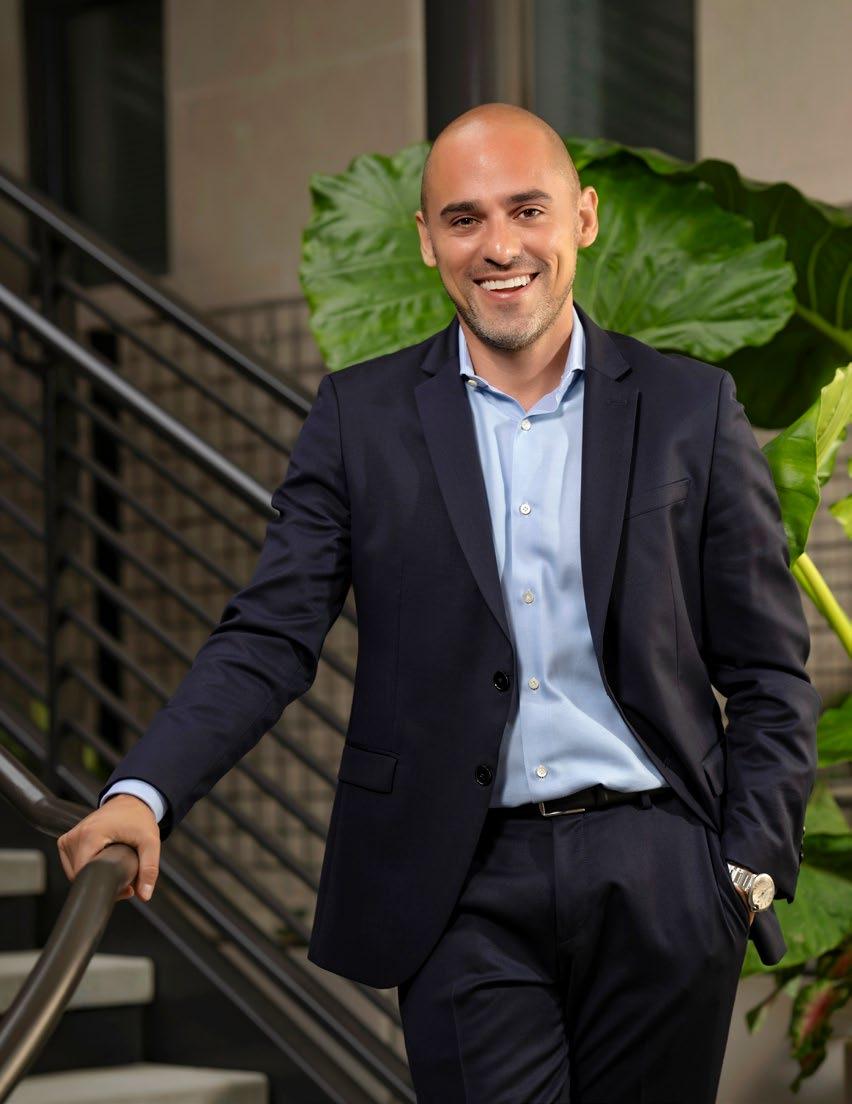
MARVIN YOUNG 43
Alex Bernal SVP of Finance Humana
Hispanic Executive
ALEX BERNAL HAS BEEN IN FINANCIAL services for over fifteen years with more recent experience in healthcare and is no stranger to change. It’s one of the common threads that ties his diverse set of career and life experiences together.
“The variety of experiences I’ve had throughout my career and the ability to excel in different environments has allowed me to bring in a unique perspective from multiple companies and different countries while incorporating a different point of view given my upbringing in Mexico,” the senior vice president of finance at Humana says. “In a way, it gives me the ability to constantly challenge the status quo and question if there might be another way of doing things. It also helps me stay open to new or different ideas.”
That’s what Bernal’s company needs now more than ever as it expands its offerings and services in an industry that’s also constantly evolving. Since it created its own health insurance plan in 1984, Humana has long been focused on being a leading health insurance provider. It has gone on to add healthcare service capabilities to its arsenal, including senior-focused primary care, pharmacy, and home care offerings.
When Bernal stepped into his role in 2022, he worked to support those efforts by transforming the way the finance department delivered services to the business. That has
included adjusting and automating processes, offshoring or outsourcing certain capabilities, and looking at new technology that his team can leverage to drive efficiency in ways the department hasn’t before. He’s proud of the ground he and his colleagues have covered in a short time and is confident their efforts will aid the company’s exponential growth.
“My role initially came as an opportunity to be a change agent, to come in and help drive transformation, and help Humana evolve from where the company was to where it wants to be,” he says. “It’s been interesting to support the leadership team [to] drive that strategy by taking all the best practices I’ve learned at previous companies and incorporating them into my current role.”
“As a Humana partner, it’s inspiring to see the vision and momentum Alex has brought to the finance function,” says Alex Kleinman, healthcare segment leader at professional services firm Genpact. “His drive to improve data and business insights is enhancing Humana’s strategic decision-making. And

his push to harness new technologies such as generative AI encourages us to be more innovative. We know that Alex will generate great results for Humana and its customers.”
Bernal grew up in Monterrey, Mexico, and came of age with an interest in numbers and economics. After graduating from Tecnologico de Monterrey in 2006, he took a leap of faith by moving to Mexico City to start his career as a financial analyst at GE Capital. He worked at the financial services company for nearly ten years, a period that built a strong foundation as a leader.
44 Mission

“Throughout those ten years, the common theme was change,” he says. “Every two to three years I’d take on new jobs, particularly during the time I went through GE’s financial leadership program, which allowed me to work in over fifteen countries and in multiple businesses including financial services, energy, healthcare, and oil and gas.”
By 2015, he had served in various roles including senior audit manager, financial planning and analysis (FP&A) leader for equipment finance, and CFO of GE Capital Fleet Services. He also transitioned from
“My role initially came as an opportunity to be a change agent, to come in and help drive transformation, and help Humana evolve from where the company was to where it wants to be.”
MARVIN YOUNG
45
Hispanic Executive








TKTKTKT HumanaTransform your business with data-led insights CFOs are unlocking growth, agility, and cost management with a data-driven approach to decision making. Finance: turning enterprise vision into reality Find out how at genpact.com
“
As Hispanics, we’re not direct, particularly Mexicans. We like to go around in circles. We don’t like to be confrontational and just go to the point. That was something I had to overcome.”
working in Mexico to corporate America. That was another huge adjustment that he says strengthened the way he communicated and presented himself.
“As Hispanics, we’re not direct, particularly Mexicans,” Bernal admits. “We like to go around in circles. We don’t like to be confrontational and just go to the point. That was something I had to overcome.”
He brought those skills to New York City in 2015, when he worked at JP Morgan Chase & Co. as executive director of FP&A, and eventually got promoted to managing director to become head of corporate FP&A. There, he had a chance to work with the best of the best and to have close access to senior leaders. One of the most valuable lessons he took from them was how to “play a mediumto long-term game while balancing the shortterm business needs.”
“It was knowing that some of the decisions they were taking weren’t going to have an immediate effect, but they would bring benefits overtime,” Bernal says.
He saw an opportunity to have that kind of impact at Humana. Today, he’s a leader who focuses on mentorship and helping others reach their goals. Bernal spends his
Hispanic Executive
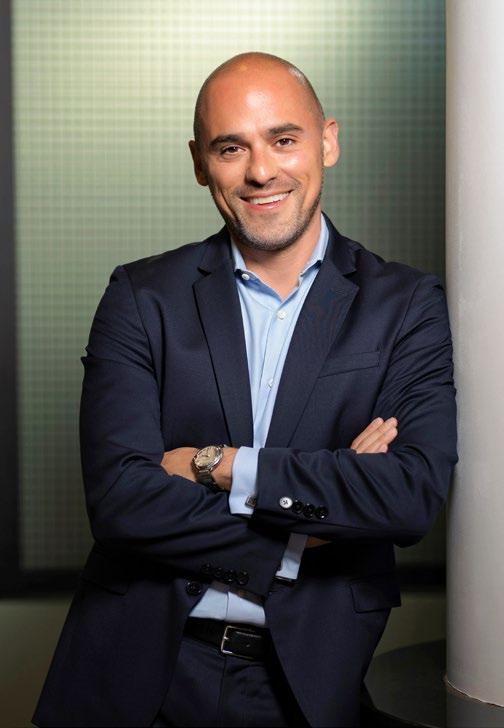
time involved with employee resource groups, recruiting at college campuses, and finding other ways to set others up for success. “I’m a firm believer in meritocracy and I always look at providing the same opportunities and platforms to others that I was given,” he says. “I want to give people jobs that will push them into the next level.”
Another cornerstone of Bernal’s leadership philosophy is diversity, equity, and inclusion, and, in his role, he emphasizes the importance of diverse teams. “As a Hispanic gay man, there are challenges we face and we share some of those with other minorities,” he
says. “I want to help set an equal footing where everyone is given the same opportunity.”
That tenant of his leadership philosophy has become increasingly important as he’s become a more senior leader and has observed less representation among the leadership rank. “You have to balance what you bring to the table and how you come across by demonstrating an ability to adjust and adapt,” Bernal explains. “It’s not just about being unapologetically you because you operate within a company’s culture. In a way, you have to learn how and when to portray things without compromising who you are.”
MARVIN YOUNG
47






48 Mission Written by You, Published by Us Hispanic Executive’s new Publisher’s Circle is a digital-only platform for selected leaders to share their thought leadership through high-quality content. As a contributor to the Publisher’s Circle, you will have the privilege of broadcasting your insights and expertise with both your peers and a readership that is at the forefront of Latino advancement in American business. Let us help you advance your leadership and become an authority. Interested in sharing your insights via the Publisher’s Circle on hispanicexecutive.com? Contact us at info@hispanicexecutive.com. Providing clear and steady leadership Congratulations to Alex Bernal, Senior Vice President in Finance at Humana for this recognition and leadership. KPMG helps organizations like Humana work together in new ways to transform and innovate healthcare. Our industry client teams draw from more than 4,000 US and 6,500 Global partners and professionals across 145 countries. 2023 KPMG LLP, a Delaware limited liability partnership and a member firm of the KPMG global organization of independent member firms affiliated with KPMG International Limited, a private English company limited by guarantee. All rights reserved.
STRATEGY
What is your secret to successful leadership?
The impressive executives featured here share theirs, and they are strategies that engage both the mind and the heart.
50. Maria Ortega, Sony Pictures Entertainment
56. Eric Chico, East West Bank
62. Adriana Torres, Oracle 68. Richard Fernandez, Great HealthWorks
EYES EARS KEEP YOUR AND OPEN
BY NOAH JOHNSON
TKTKTKT
Sony Pictures Entertainment’s Maria Ortega shares lessons from her decades-long career in auditing, finance transformation, and leadership
50 Strategy
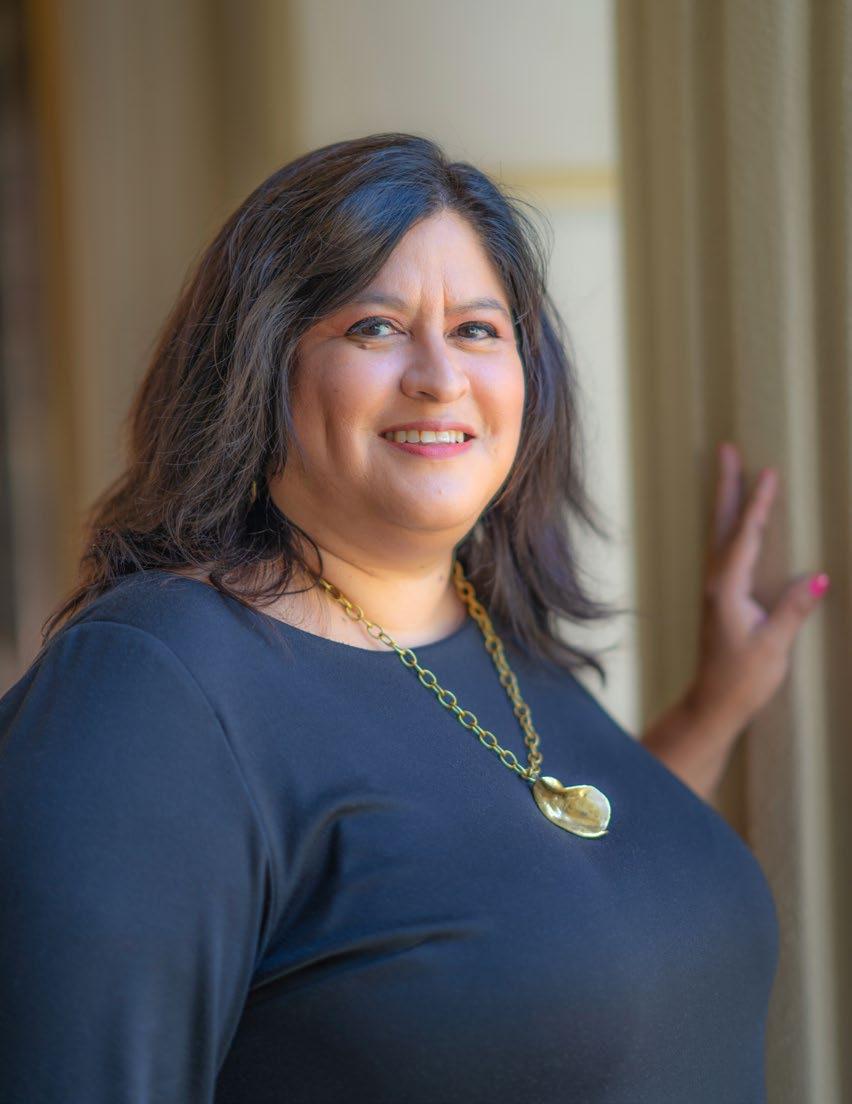
JOE HALL
Maria Ortega VP of Finance Transformation
Sony Pictures Entertainment
51 Hispanic Executive
YOUNG PROFESSIONALS CAN LEARN A lot from Maria Ortega, her career, and her leadership evolution, whether they know what they want their long-term paths to look like or not.
“Early in your career, you have the biggest opportunity to explore and be curious about what you want to do and where you want to work,” she says. “Some people start with a focused path, but there are so many jobs out there that you don’t know about. So, you should look for a job you know you’ll like doing, but also know you’ll learn new things that might be a stepping stone to something different.”
That’s what she did.
After getting an undergraduate degree from the University of California, Riverside and a master’s degree from the University of Notre Dame, she started her career at Deloitte in external auditing and then at Hughes Electronics as an internal audit manager. Up until that point, Ortega always
had a knack for numbers, performing analysis, and understanding how things worked. The Burbank, California-native thought she’d leverage those traits to pursue accounting positions but wasn’t sold on where she wanted to end up.
Ortega found herself gravitating toward the processes behind the numbers as she moved through her internal auditing responsibilities. If she hadn’t had those experiences, maybe she’d never go on to become the vice president of finance transformation at Sony Pictures Entertainment that she is today.
“Now, I’m more a project manager, figuring out the puzzle pieces of how we’re going to get a finance transformation project done, who are the people who need to do it, how much time will that take for a team, and then working on the execution and making sure things are running the way they should,” she explains. “Each job and project was a progression that set me up for this point.
52 Strategy
“My journey underscores the importance of keeping your eyes and ears open and exploring different things,” she continues. “Opportunities aren’t always presented, but you need to listen out for them.”
The VP stepped into her current role in 2010 because of her ability to listen and seize an opportunity. After serving as an executive director of corporate finance compliance at the company for five years, she heard Sony Pictures Entertainment was going to build a department focused on improving finance processes, including implementation of a accounting services framework with two international shared service centers.
She approached her boss and asked to be a part of the group because she would play a pivotal role in designing and driving the implementation of changes rather than auditing a process after the fact. She focused on determining the delivery models for the accounting close and tax processes.
“You should look for a job you know you’ll like doing, but also know you’ll learn new things that might be a stepping stone to something different.”





BOOK RECOMMENDATIONS FROM MARIA ORTEGA
The Digital Mindset: What It Really Takes to Thrive in the Age of Data, Algorithms, and AI
By Tsedal Neeley and Paul Leonardi
“I read it because it’s directed at organization leaders, and [each chapter] describes a different aspect of digital technology and some of the practical applications being developed, like artificial intelligence and machine learning. It’s something finance organizations are moving toward to find cost effective and efficient tools. As leaders, we need to understand what these tools are and know the type of mindset and skills that’ll be needed to get work done.”
Digital Body Language: How to Build Trust and Connection, No Matter the Distance
By Erica Dhawan
“It offers advice about ways of navigating behaviors in a remote work environment. For example, how do you coach team members that are in remote offices around the globe? Or, how do you show support for a colleague’s proposal when listening on teams?”
53 Hispanic Executive
My journey underscores the importance of keeping your eyes and ears open and exploring different things. Opportunities aren’t always presented, but you need to listen out for them.”
Maybe Ortega’s leaders brought her on board because of the years of expertise she had garnered as an auditor, her relentless appetite to improve, or her demonstrated ability to get things done.
One thing is for sure: they saw potential in her as a leader and supported her growth.
Ortega went on serve on the board of Women and Allies of Action, Vision, and Empowerment, an employee business resource group that helped her hone her leadership qualities. She connected with this group’s mission to promote gender equity through Sony’s creative content, culture, and organization. In her VP role, she took on important process improvement projects and oversaw larger teams of people. She went from documenting or making recommendations about new processes to directing the professionals doing that work.
That journey has given Ortega, a selfdescribed introvert, the confidence to lead in her own way. It has also taught her about one of the most important abilities a leader can have: the ability to listen.
“Serving on a board, you’re trying to understand what people are thinking, the challenges they face, and listening to suggestions about solutions,” she explains. “On process improvement projects, I’ve had to listen to the people involved and how they will be impacted by changes, understanding their challenges. You take all of that to create a better outcome for everyone.”
She has also seen the power of how leading by example can drive change. A few years ago, Ortega wasn’t afraid to roll up her sleeves as she and her team experimented with a new project management method that would change the way accounting was done.
54 Strategy
“Everyone saw that me and my boss were using this new approach for the first time,” she explains, “so it wasn’t just us telling the team, ‘Do this going forward.’ They saw how we went through a process of figuring it out and then, being successful with it.”
That ties into a final piece of advice Ortega has for future leaders: you can’t do it by yourself. “You need a team, and the people you’re working with should be people you like working with,” she advises.
In learning from Ortega’s journey, any future leader can find their own success.


Exceptional organizations are led by a purpose. At Deloitte, our purpose is to make an impact that matters by creating trust and confidence in a more equitable society. In the US, we are focusing our efforts to advance sustainability, equity, and trust that come to life through core commitments and support our shared values.
55 Hispanic Executive Be bold Together Inclusive cultures can embrace individuality and give voice to a broad range of perspectives. Because nothing outshines authenticity. See what inclusion powers at deloitte.com/ us/inclusion. www.deloitte.com Copyright © 2023 Deloitte Development LLC. All rights reserved.
The Right ATTITUDE
BY NOAH JOHNSON
How Eric Chico maintains a positive, growth mindset to succeed in his career and help energize the technology finance practice at East
West Bank
TKTKTKT
56 Strategy
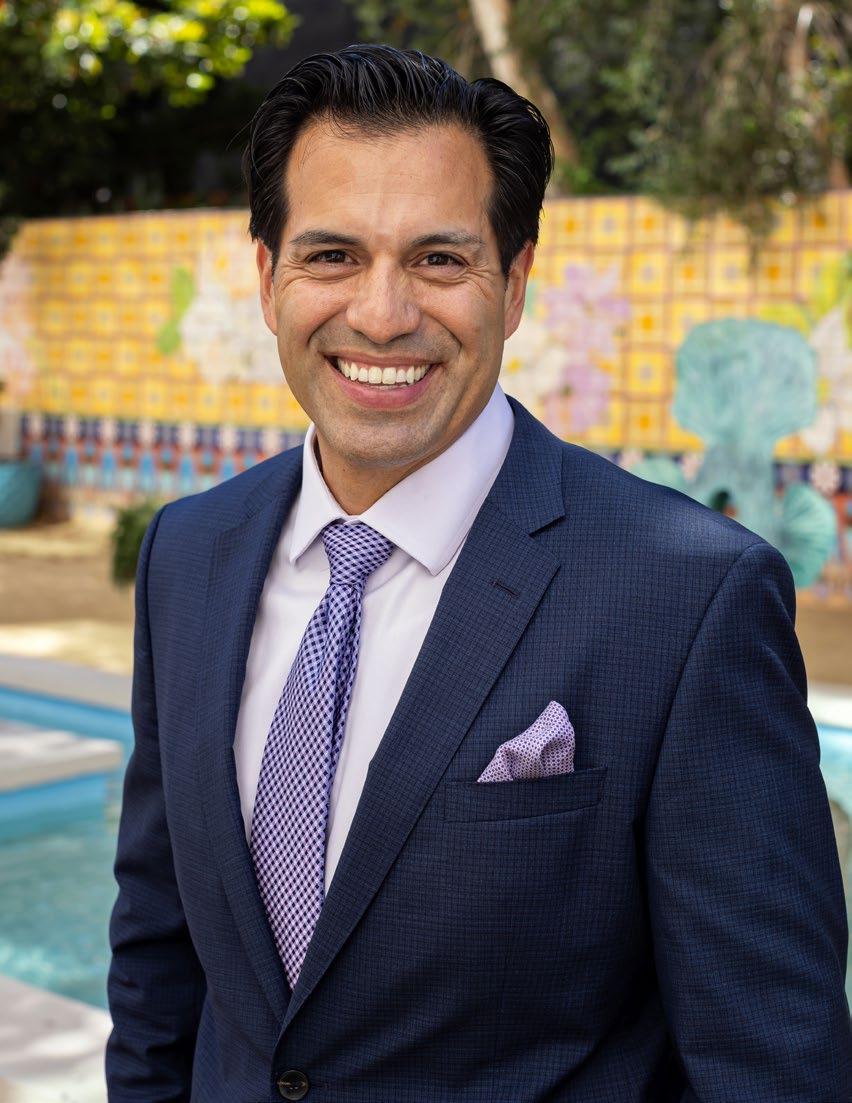
DANNY NGUYEN 57
Hispanic Executive
IN 2011, ERIC CHICO WAS A DECADE into his finance career and a new hire at GE Capital when a senior leader posed a question he hadn’t been asked before.
“‘What can we do better?’” Chico recalls the leader asking him and others at an orientation lunch. “Here’s this senior executive who knows he’s in a powerful position, asking people who just started at the company what he and his team could improve on. At the time, I was thinking, ‘I just got here, why ask me?’ But I also thought it was great he could be so reflective and have an attitude that there were always things to improve on even if they were successful.”
Working with leaders like that throughout his career inspired Chico to be the one posing those kinds of questions to his employees at East West Bank a company that provides an array of banking services to customers all over the world. There, he serves as senior vice president of technology finance, spearheading business development initiatives and overseeing a team that provides loans to middle market tech
companies that generate $10 million to $100 million of revenue.
In addition to supporting those transactions, Chico drives the company’s success by showing up to work with the same infectious attitude and humility he was met with at his GE Capital orientation. “I always tell my team, ‘I want you to get better at this. How can I help you?’” he says.
Maybe Chico’s Southern California technology finance team is such a cohesive and growth-oriented group because it started that way. Chico and two others were its cultural architects, joining East West Bank in 2021 to help build the department from the ground up. At the time, only two of them had transaction experience, and one of them was managing two other verticals. That meant Chico’s plate was full. He was tasked with quickly screening deals, underwriting them, and getting them approved while getting to know the company’s credit policies, systems, and employees at the same time.
For Chico, those conditions paved the way to as many opportunities as there were
58 Strategy
Eric Chico SVP of Technology Finance East West Bank
challenges and drove the small team to perform at a high level. In their first year, they funded fourteen deals with $230 million in commitments, and in the years that ensued, they added more team members and customers and continue to bring more value to the company today.
“As a leader, one of the first things that kicked in was having the right attitude, which I learned earlier in my career,” he says. “There were many leaders who I was inspired by who never looked like they had a bad day, and I saw this as my chance to be one of them. So, I said, ‘Yeah, this is going to be hard, but you have to have a positive attitude. It doesn’t do you any good to sit there and dwell on how you’ll get this done.’
“I also just thought about the big picture,” he continues. “I wanted to contribute to a team where I had an impact to help it grow, so even though we would sometimes work twelve-hour days, I knew this was where I needed to be.”
“Eric is a dedicated originator and demonstrates excellent commitment to client service
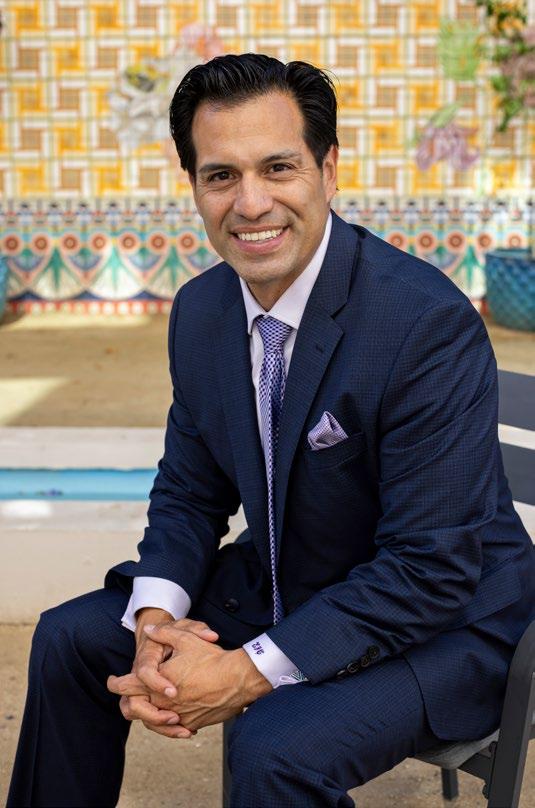
and a superior ability to structure creative solutions for East West Bank customers,” says Maria T. McGuire, principal at Goldberg Kohn Ltd.
Before becoming an influential and impactful leader, Chico grew up as a native of Chicago’s Southwest Side to Mexican parents. He came of age listening to stories from his ninety-six-year-old grandmother and how she immigrated to the US. Over the years, she inspired his innate work ethic and drove him to be good at whatever he put his mind to.
DANNY NGUYEN
59
Hispanic Executive
As a leader, one of the first things that kicked in was having the right attitude, which I learned earlier in my career.”
“My grandmother always says that when she came over, a lot of people thought life would be easier when they got here, but in some ways, it was harder,” he reflects. “Many didn’t speak the language or have an education. Some, like my grandmother, ended up having more kids when they arrived. When I think about that, I’m grateful that I had parents who valued education and pushed me and my siblings to be professionals. How could we have gotten here without their sacrifices?”
After graduating from Villanova University with a finance degree, Chico spent the first two years of his career as an associate at Vanguard before moving on to PPM America to serve as a senior analyst for nine years. Those roles built his finance and accounting expertise.
They also gave him the experience he would need to move to GE Capital Healthcare Financial Services, where he underwrote loans for healthcare companies. There, Chico would gain the credit analysis skills that would be critical for his career. From there, Chico assumed the role of vice president of healthcare finance at Wells Fargo and was ultimately elevated to director prior to joining East West Bank in 2021. In those positions, he was able to sharpen himself as a leader and an underwriter.
Young professionals who want to succeed should “keep the big picture in mind and have an open mind for how the roles you select will impact you down the road,” Chico says. “That requires honesty about what you want to do, what skills you need, and what you need to do to get them,” he advises.
60 Strategy








Congratulates Our Valued Client On His Recognition in Executive Magazine Hispanic E Eric Chico, MBA, Senior VP at East West Bank Tel: 312.201.4000 | Fax: 312.332.2196 info@goldbergkohn.com | www.goldbergkohn.com 55 East Monroe Street | Suite 3300 | Chicago, Illinois 60603 has appreciated the opportunity to partner with Eric on numerous cash flow and asset-based loans to middle market companies.
The Learning Never Stops
BY BILLY YOST
Oracle’s Adriana Torres is a veteran of her industry but also its most eager student
L
PHOTOS BY AMIE SANTAVICCA
62 Strategy

63 Hispanic Executive
Adriana Torres SVP, Global Head of Customer Support Oracle
AS SENIOR VICE PRESIDENT AND GLOBAL HEAD OF CUSTOMER support at Oracle, Adriana Torres is a leader, a mentor, a student, and a career pro when it comes to global operations, transformation, and enhancing the customer experience. Nearly thirty years into her career, Torres continues to inspire those around her by leaning into diversity, equity, and inclusion (DEI) efforts at Oracle and abroad, seeking out board service opportunities, and graduating with a PhD in international business in 2023.
After significant stints at bp, Citi, and Visa, Torres came to Oracle in 2016 initially to help turn around a recent acquisition in the hospitality and food and beverage space. It was a new industry for Torres, but that’s part of the reason she took the role.
“I’ve been in customer experience for my entire career, and the opportunity to work in one of the largest software companies in the world, especially in the hospitality and food and beverage space, was very exciting,” Torres explains.
The success of that effort led to Torres’s role expanding across multiple verticals at Oracle, an organization that works in just about every industry. Torres has also had the opportunity to help move Oracle forward on DEI initiatives and foster more inclusion and belonging for those who may feel like outsiders—a feeling Torres knows well.
Torres’s first outsider role may have been growing up surrounded by boys, but she’d experience a healthy amount of déjà vu when she

64 Strategy
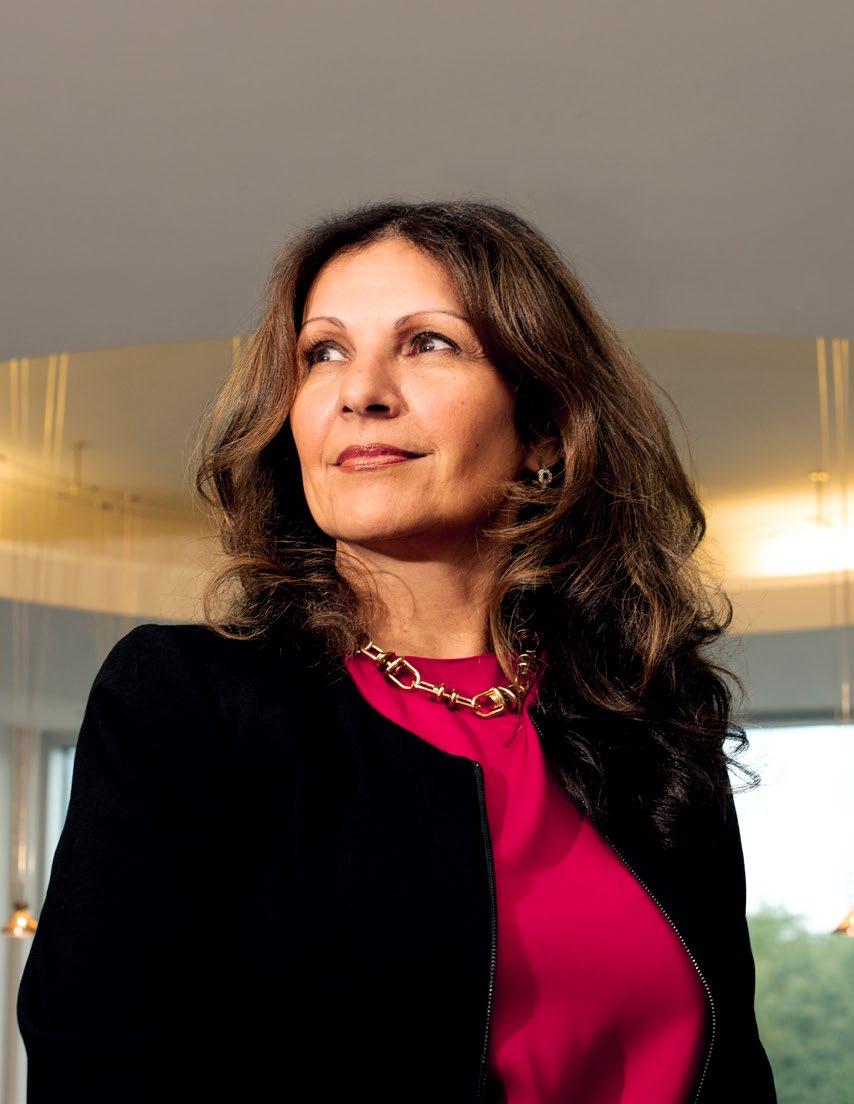
65
Hispanic Executive
began her career. With three brothers, Torres always felt like she was on the outside looking in, trying to get involved in whatever her siblings were doing. She found that connection by being the planner, the orchestrator, for her family. It wasn’t a role that got her much thanks, but it would be the perfect training ground for the rest of Torres’s career.
“When I began my career in Brazil, I was the first female trainee in an operations or business role,” Torres explains. “I, along with the legal head, became the first female managers in the company’s forty-year history. When I moved to the United States, not only was I often the only woman in the room but I was also the only Latina.”
Torres is a perfect DEI advocate given her global experience. The executive has worked across 120 countries and has led global teams of up to 15,000 employees. In fact, Torres has worked globally for so long that she usually can isolate an accent to its country of origin.
“When you work across the world for this long, you can’t help but learn to love the culture of different countries and the incredible people it creates,” Torres says. “You learn that bringing together different people and different perspectives enriches the dynamic of every team. And you learn that we are all connected, even though we come from different places and have different experiences.”
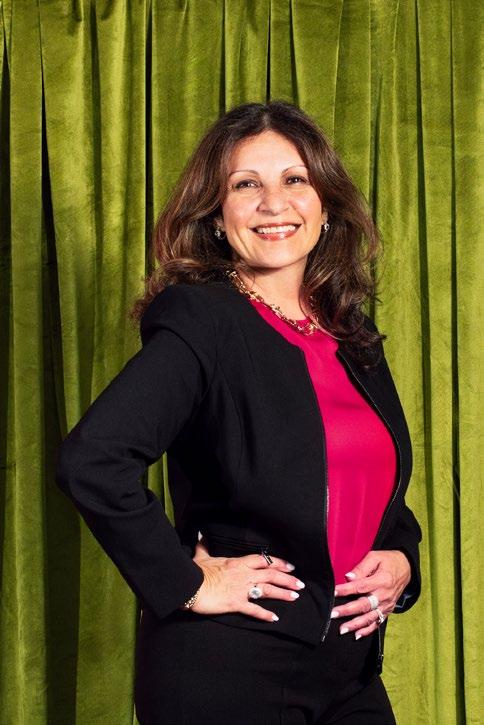
66 Strategy
When you work across the world for this long, you can’t help but learn to love the culture of different countries and the incredible people it creates.”
She may have decades of global leadership, but Torres says she’s always searching for the next opportunity to learn. Torres has two master’s degrees, and she earned her PhD from the International School of Management in late 2023. After a successful stint as a business management instructor at St. John’s University, Torres sees her life in academia growing in parallel with her corporate career.
Though an outsider at times, Torres continues to bear witness to the power of diversity, and the inherent responsibility of helping eliminate potential barriers for the next generation of leaders.
As she has progressed through her career, Torres has found ways to give back to the Latino community and inspire the next generation of Latina leaders. Torres has acted as a board member for the Hispanic IT Executive Council (HITEC) since 2018. Most recently, Torres joined the board of Grameen
America, a nonprofit that provides loans, savings programs, financial education, and credit establishment for women who live in poverty in the United States. The organization recently partnered with Jennifer Lopez to help low-income Latina entrepreneurs.
Torres has been recipient of many industry awards for her contribution and engagement with the community. In 2018, she received the Powerful Women on Bay Awards, and the Executive Excellence Award from great Minds in STEM. She was nominated HITEC 100 Most Influential Hispanic in Technology for five consecutive years and has also been inducted to the HITEC Hall of Fame in 2023.
Whatever comes next, Torres will do so with an open mind and the intention of helping outsiders like her get through the door. “It has been a great journey so far, it sounds ‘cliché,’ but I can’t wait to see what the future holds.”
ADVICE FOR FUTURE LATINA LEADERS
Whenever Adriana Torres speaks with young Latinas, she shares critical advice to help them navigate a corporate environment that is challenging and, often, outright hostile to women of color.
Know what you want
Get things done
Do the right things and do them right
Don’t be afraid to take risks
Learn from your mistakes
Never stop learning
Build positive relationships
Be a team player
Be resilient when you need to but be respectful of others
Recognize and celebrate success
67 Hispanic Executive
BY NOAH JOHNSON
Richard Fernandez shares his finance journey and the exciting initiatives he’s involved in at Great HealthWorks
MORE WITH LESS
TKTKTKT
68 Strategy
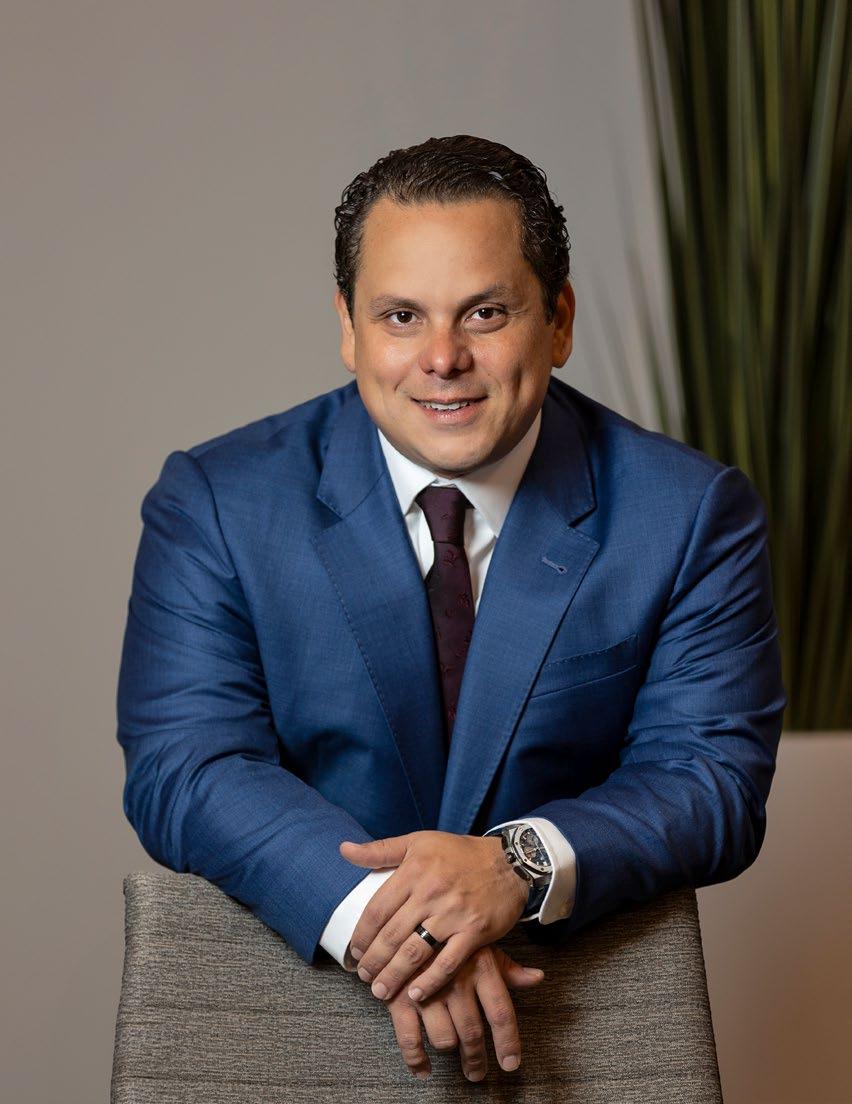 Richard Fernandez CFO Great HealthWorks
Richard Fernandez CFO Great HealthWorks
69
HEATHER CORONEL
Hispanic Executive
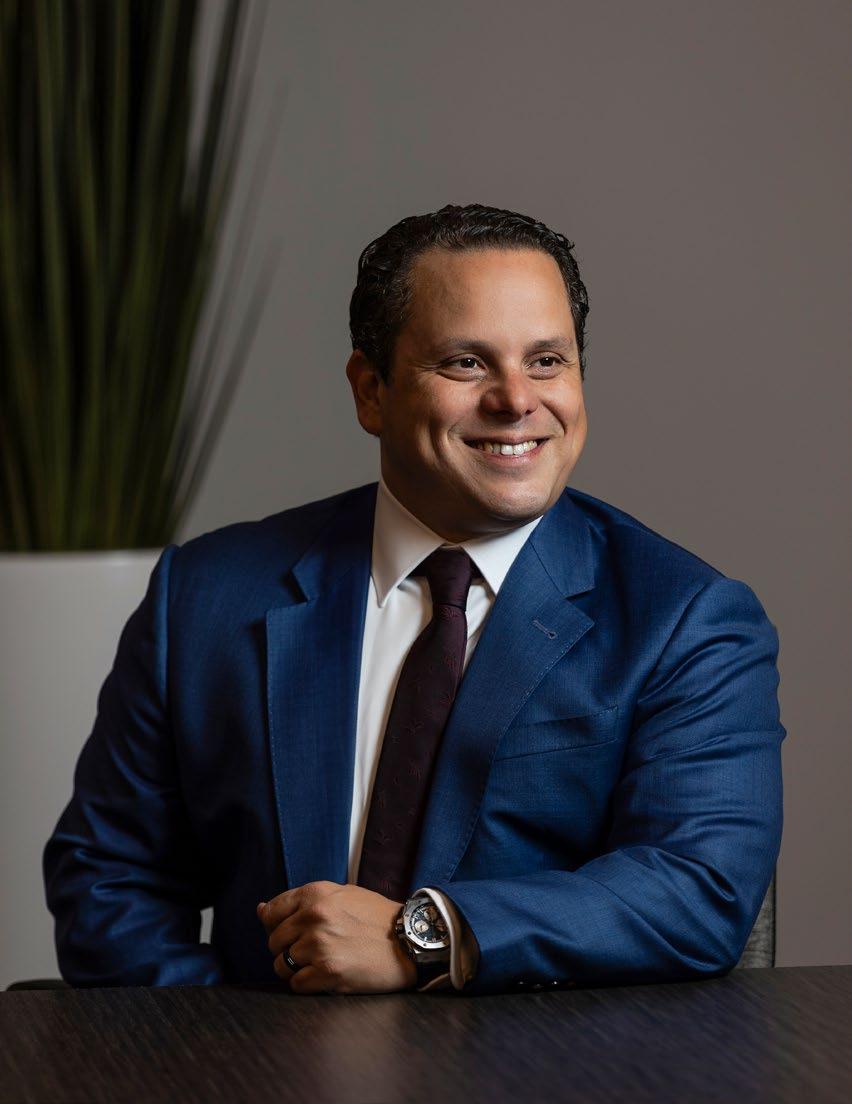
HEATHER CORONEL 70 Strategy
IN THE AFTERMATH OF HIS MOTHER’S
untimely death, nineteen-year-old Richard Fernandez had to grow up quick. He went to school and worked full time while taking care of his elderly grandmother, who helped raise him when his father died over a decade earlier.
He was charged with a sense of responsibility that not too many of his peers had.
“I lost my father at four and my mother when I was nineteen, so I was basically an orphan as a teenager,” he says. “Going to school, working, and taking care of my grandmother built the foundation of being responsible and working hard. Everyone was doing different things in their lives, but my older brother and I were just trying to get by.”
As he navigated those tough times, he also journeyed through the early stages on his finance career. His mother, who worked at a tractor company in the accounts payable department, helped Fernandez secure an entry-level accounting position before she passed. There, he learned about audits, dealership financing, differential, and other
foundational concepts that prepared him for the workforce following his graduation from Florida International University.
Despite the challenges he faced, he went on to have a successful career as a financial professional, helping to open a new international sales division for a multinational media company in the US, and to develop programs and systems that improved organizations’ financial health. In 2013, he decided to bring his expertise to Great HealthWorks, one of the largest vertically integrated direct-to-consumer powerhouses in the country that prides itself on its cornerstone product, Omega XL.
“I was attracted to Great HealthWorks so much because they provided a product that actually makes a difference in people’s lives, which gives me a certain gratification that I do something that changes their lives,” says Fernandez, who currently serves as CFO. “It also requires a heavy responsibility because these are products people take that reduce their pain and inflammation. If you have any problems in the supply chain, it’s really disruptive,
71 Hispanic Executive
but I enjoy taking that on and making sure our customers get what they need.”
He also was drawn to the company’s team-oriented culture, which aligns with his collaborative and lead-by-example leadership style.
“We believe in building strong teams, giving them autonomy to make decisions to the best of their abilities,” he says. “I never ask anyone to do something that I won’t do myself. I’ve always tried to lead by example and when you have a team who sees that in you, it’s easy for them to support you and your vision.”
Fernandez says his vision for Great HealthWorks’ financial future is to position it to continue developing impactful in-house products while expanding to international markets and forging relationships with celebrity endorsers. This year, it has already made strides in those areas, working on products geared toward customers with sleep troubles and those with pets. The company has developed plans to outsource its production studio and is expanding its reach toward Mexico and Puerto Rico. Also, it has gotten buy-in from the likes of Ana María Polo and John Walsh.
In addition to those efforts, Fernandez and his colleagues are focused on preparing the company for the future from an innovation and
We believe in building strong teams, giving them autonomy to make decisions to the best of their abilities.”
technology perspective. They recently added upgrades to their Oracle ERP system and Domo, a reporting tool that leverages machine learning to develop business decisions through analytics. For the CFO, these are the kinds of initiatives that are vital for growth.
“In today’s environment, implementing more technology into our company helps drive the decision process quicker without increasing human capital,” he says. “We can take on more with less.”
Fernandez has no shortage of advice he’d like to share with the next generation of leaders, but one is “to do what you say.”
“Constantly hold yourself accountable,” he advises. “It’ll always keep you sharp and it’ll keep you self-motivated. Also, don’t worry about the things you can’t control. Focus on the process. As long as you take care of the process, the goal will organically be achieved, and you need to be able to communicate that vision too.”
72 Strategy
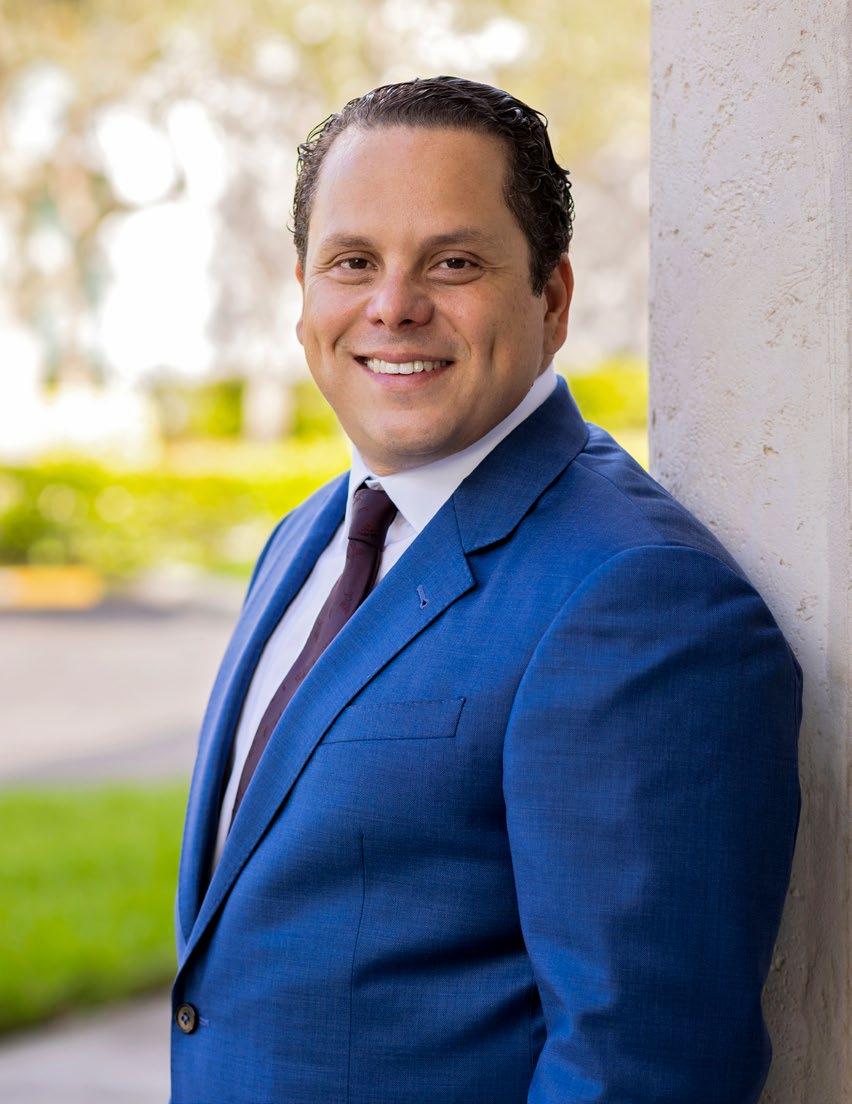
HEATHER CORONEL 73 Hispanic Executive


FARAZ HYDER / ADOBE STOCK 74 Leading Latinas
For

seventh year in a row, our
our
most relentless champions: Latinas who have not only achieved extraordinary success but also paved the way for future

Leading Latinas
spotlights
PRISCILLA ALMODOVAR Fannie Mae JAVIERA BALMACEDA Amazon Studios SANDRA MARTÍNEZ Nestle Oceania JULISSA SOTO Julissa Soto Latino Health Equity Consulting CATALINA LAVERDE Spotify MÓNICA RAMÍREZ Justice for Migrant Women LARA BUESO BACH TelevisaUnivision REBECCA NÚÑEZ The MRN Agency STEPHANIE VALENCIA , ROSE-ANNE TIFRE , JESSICA MORALES ROCKETTO , SYLVIA BANDERAS COFFINET Latino Media Network Featuring 76 88 92 96 106 112 118 122 126 FARAZ HYDER / ADOBE STOCK 75 Hispanic Executive
the
issue
community’s
generations

LATINA AMERICA’S HOUSING
THE AT THE CENTER OF FINANCE SYSTEM
By Vivian Nunez Portraits By Cass Davis
Housing financing expert Priscilla Almodovar is Fannie Mae’s first Latina CEO and, consequently, one of the America’s most influential leaders. A year into her tenure, the Brooklyn-bred Boricua reflects on her lessons learned and the privilege of creating new homeownership opportunities.
FARAZ HYDER / ADOBE STOCK
76 Leading Latinas
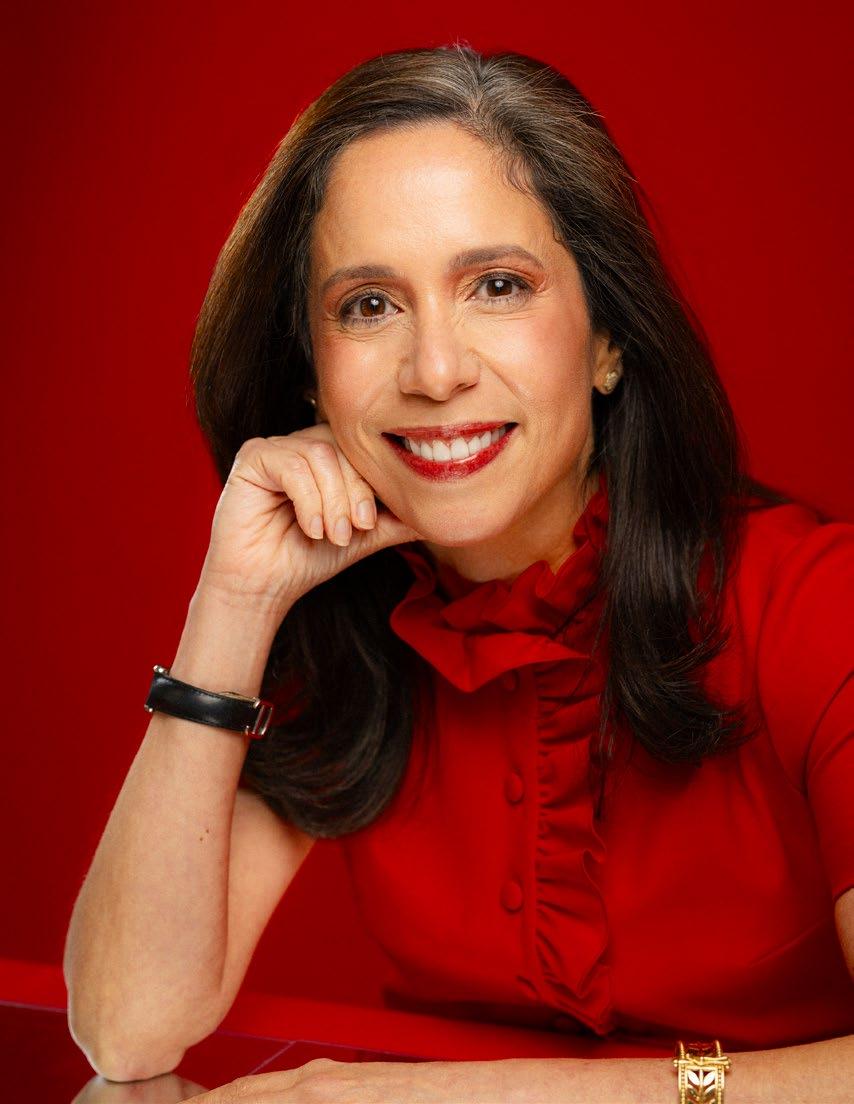
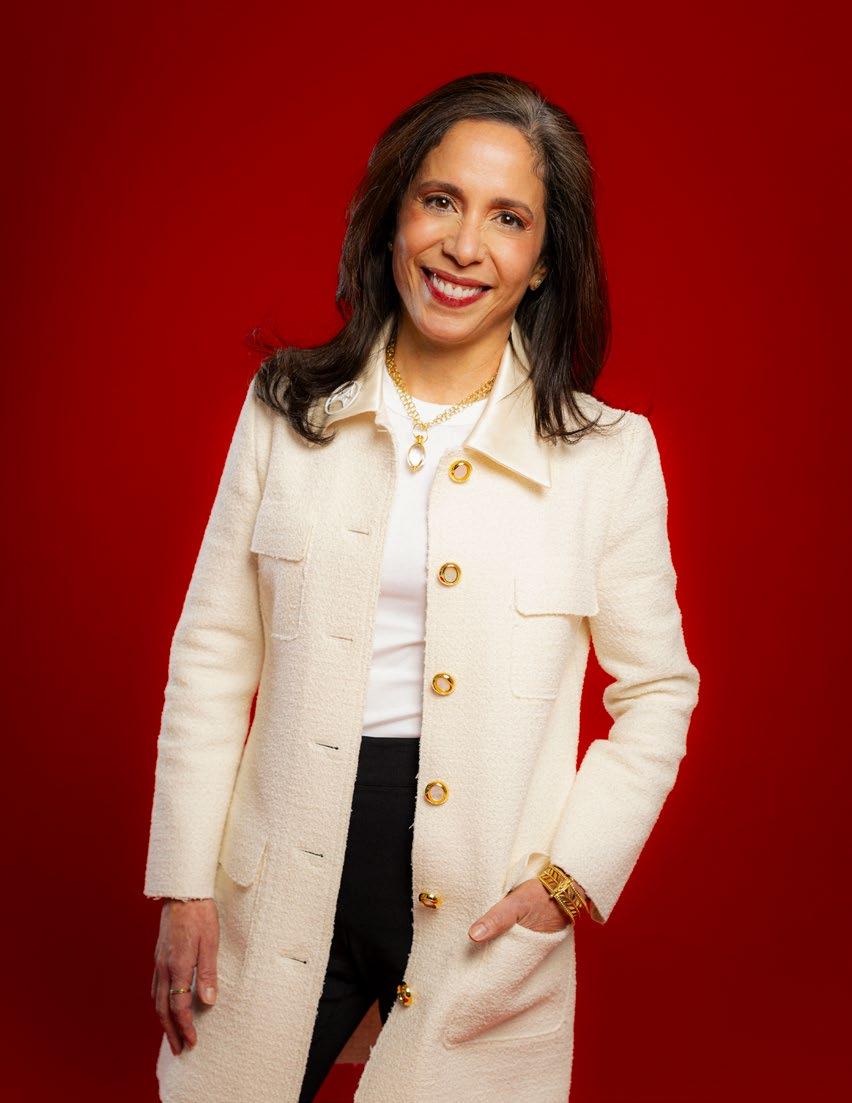 PRISCILLA ALMODOVAR CEO
PRISCILLA ALMODOVAR CEO
78 Leading Latinas
Fannie Mae
life was transformed when her parents became homeowners. The Almodovars had moved from Puerto Rico to Brooklyn in the 1950s, and they kept their goals and hard work centered on going from renters to homeowners. On the day they got their first home, their joy was so palpable that, even as a fiveyear-old, Almodovar understood that it was a life-changing moment for their family.
As the CEO of Fannie Mae, the leading provider of mortgage financing in the US, Almodovar sets the stage for other families to have that same life-changing moment that they can pass on to the next generation— literally and figuratively.
“One of our strategic objectives is to make the housing system fairer for everyone,” says Almodovar, who stepped into the CEO role in 2022 and slated to also take on the role of
president in 2024. “And when we look at who our future homeowners are, they are people of color, 70 percent of whom are Latino.”
It’s why she thinks so fondly about her parents’ journey and the life-changing opportunities that their financial decisions have afforded her. Almodovar often mentions how she still believes that generational wealth is built through homeownership and how that generational abundance isn’t limited to just the physical asset of the house but also the intangibles—the hard work, commitment, and perseverance that transcend generations when a goal like this is achieved.
“To be the first Latina Fannie Mae [CEO], to be the only Latina today on the Fortune 500 is a big deal, and I feel a huge sense of responsibility,” she says. “I bring that sensibility of many immigrants in this country, that I have a
79 Hispanic Executive
sense of gratitude for what the mainland gave to my parents, and that my parents could then pass on to me and me to my children. This is the only place in the world where one generation to the next can see that growth. This is a place of opportunity, and I bring that to my work because if you work hard, hopefully, you’ll see the benefit of your efforts.”
Under Almodovar, over eight thousand employees work to realize Fannie Mae’s mission of facilitating equitable and sustainable access to housing. For context on the scale of the company’s impact, Fannie Mae has a balance sheet of $4.3 trillion and financed one in four single-family mortgages in the US in 2022.
All the while Almodovar, who credits her career success to hard work and mentorship, continues to build upon her role as a leader both at Fannie Mae and, externally, as the company’s first Latina CEO and the only Latina CEO on the Fortune 500 at the time of this writing.
AMERICA’S FORT U NE 500 LATINA CEO
Almodovar knows that others will study her leadership style and career on their journeys to pave their own paths in the business

world, especially other Latinos looking to lead companies of their own. Therefore, she is open to sharing her insights and lessons learned both with Fannie Mae employees and with the business world at large.
For instance, she wholeheartedly believes that while she is one of a few, she will not be the last Latina CEO with this level of influence.
“I do believe it’s going to change,” Almodovar says. “This past year, there’s now more than 10 percent of women on the Fortune 500 as CEOs [and] that was not the case before. Also, when I started my career, the Latino population was 9 percent of the population, [and] today it’s almost 20 percent. And by the way, Latinos are having higher levels of educational attainment [and] their wage growth is higher than the general population. They’re also seeing a faster pace of homeownership. So, it is Latinos’ time.”
When categorizing the specifics of her leadership style, she prides herself on her
FARAZ HYDER / ADOBE STOCK
80 Leading Latinas


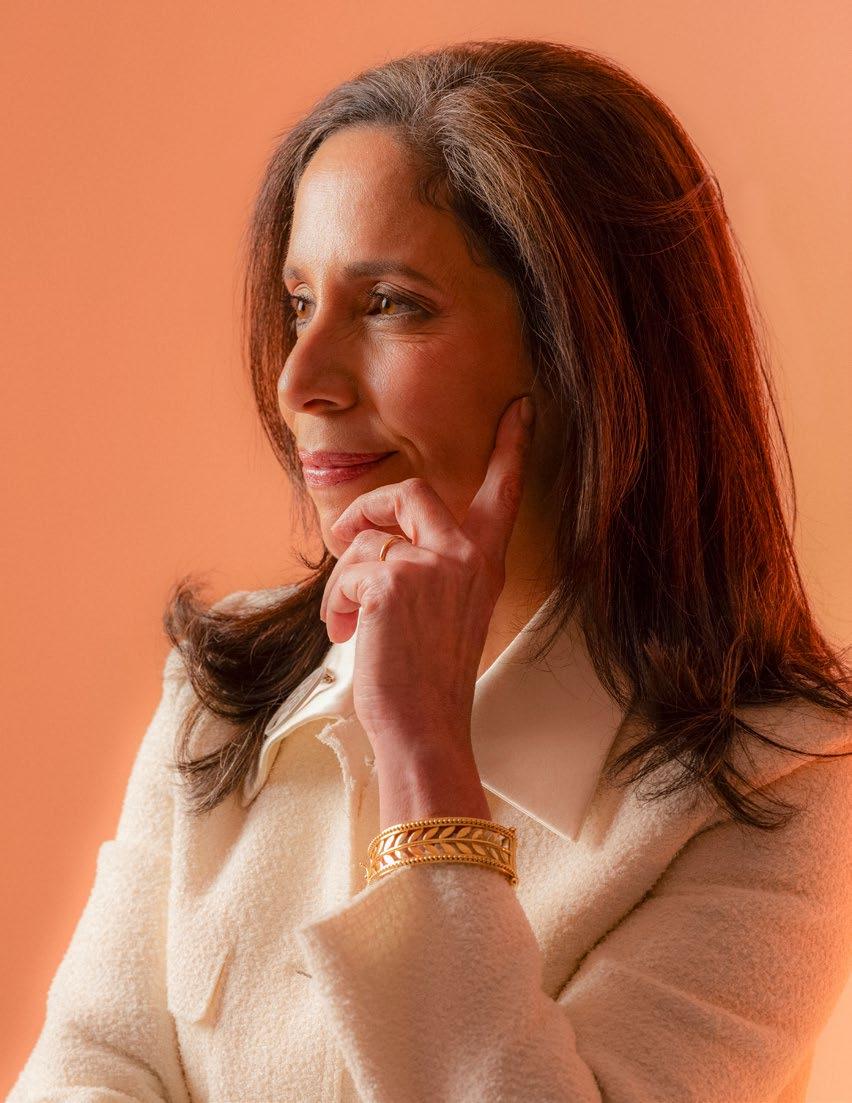
81
Hispanic Executive

82 Leading Latinas




“
I’m a big believer in partnerships, especially in housing. Housing requires every sector to be working together.”
openness and a deep-seated belief that we each hold powerful talents that can make a big impact in corporate America. In Almodovar’s case, a proclivity toward partnerships and listening to others may be of one those powerful talents.
“I genuinely believe that everyone contributes to our mission and what the company and industry is trying to achieve, and I’m a big believer in partnerships, especially in housing. Housing requires every sector to be working together,” Almodovar explains. “I think listening [also] is a very important tool, and it’s something I try to work on every single day.
“[As] a leader, I don’t know everything,” she adds. “No leader could know everything, so because [of this] I like to ask questions. I think there’s confidence in that ability to ask questions . . . I [also] like creating that sense of team and ownership. I like to win like
everybody else, and if we all know where we’re heading, it really makes a big difference.”
Her third leadership pillar is her belief that hard work and continuous feedback can move the needle on a personal and team level. She is very animated when discussing the importance of highlighting others’ successes, as well as the leadership imperative to note when there is room for improvement.
“When someone does a job well done, I’m the first person to call it out and [to] explain why it was well done. Similarly, if someone doesn’t do a good job, I’m the one to share constructive suggestions on how they can make it different. And I think people acknowledge [that], people see that, and they want to work with someone who values their contribution.”
When asked about when, throughout her first year as Fannie Mae’s CEO, she feels like all three of her leadership pillars coalesced,
Almodovar recalls a specific moment early in her tenure. At the end of her first quarter, they faced the collapse of Silicon Valley Bank.
“To see the company in action, how we came together, how we communicated with our stakeholders, how we assessed our risk, I was able to see firsthand the impact and scale of our organization during a potential time of crisis across the financial sector,” Almodovar says. “It really accelerates one’s learning when you’re in it. [We have an] amazing team of people. They’re smart, very committed to what we do, and it’s that mission—what Fannie Mae does—that brings the entire company together.”
IN BUSINESS FOR ALL STAKEHOLDERS
In addition to serving as leaders during moments of crisis, Fannie Mae’s team is
83 Hispanic Executive
Searching for Home
It’s normal—even expected—for Latinos to think of multiple different places or people when we think of the word home, or hogar. Our definitions of home are complicated by our family’s ties to their homeland, by our own immigration stories, and by the spaces where we feel we belong (or don’t).
Priscilla Almodovar is no different. “When I think of home, I think of our first home,” she says. “I remember when my parents bought their first home, I was five years old, and I still remember I had my own bedroom, which was a really big deal. That home, and the home I have today, [are] places where [we] can just be who [we] are.”
“THIS IS THE ONLY PLACE IN THE WORLD WHERE ONE GENERATION TO THE NEXT CAN SEE THAT GROWTH. THIS IS A PLACE OF OPPORTUNITY, AND I BRING THAT TO MY WORK BECAUSE IF YOU WORK HARD, HOPEFULLY, YOU’LL SEE THE BENEFIT OF YOUR EFFORTS.”
committed daily to innovating the housing finance system to better serve those whose American dream includes homeownership.
“I like to say that [at] Fannie Mae we’re a tech company that happens to be in mortgage credit,” Almodovar shares.
The use of technology helps spearhead the company’s commitment to constant innovation and equity within homeownership. Under Almodovar’s leadership, the company has continued to build out its educational resources, which help empower first-time homebuyers to believe that homeownership is not only possible in the future but also attainable in the present day.
For instance, with the use of artificial intelligence, Fannie Mae lenders are now able to identify rent payments in a renter’s bank statements and allow them to factor that into their underwriting decisions.
“Our flagship HomeView program is in Spanish, and it really gets to the core of a lot
of the myths that exist around homeownership, particularly in the Latino community,” she explains. “Issues about credit, what’s good credit, what’s not good credit, what to do with your personal information, social security numbers, and that credit is not a bad thing. [Because] I think culturally, the Latino community thinks that credit is not a good thing.”
At Fannie Mae, another flagship program, HomeReady, empowers the next generation of homeowners by busting the widespread myth that individuals need a 20 percent down payment to buy a home; instead, with the program, the down payment is only 3 percent for qualified borrowers.
No matter the organization or level, Almodovar is proud of how her every part of her career has always served a greater purpose. She has focused on bridging gaps in the housing space that allow families, just like her own parents, to believe that homeownership is for them, too.
84 Leading Latinas
CEO SOFT SKILLS
For instance, Almodovar set the roots for her career in the housing space over twenty years ago. She has been the president and CEO of Enterprise Community Partners, the managing director and co-head of real estate banking at JPMorgan Chase, and the president and CEO of the New York State Housing Finance Agency, the State of New York Mortgage Agency, and the Affordable Housing Corporation.
Each organization she helmed taught Almodovar how she could use her role, expertise, and ability to empower her team to create pathways for a new generation of homeowners.
“I think with everything in life, whether professionally or personally, you can’t do it alone,” Almodovar says. “It takes a lot of partnerships [and] it takes a lot of support . . . I personally get a lot of pleasure as a leader when I see my support elevate someone. I think it just keeps generating others to do the same.”
The cycle of mentorship and reverse mentorship is a cornerstone of Almodovar’s leadership style. She understands how it’s possible to create even more impact when you know who you can turn to for support and when someone knows they can also turn to you.
“I’ve been very fortunate to cultivate relationships that have stayed with me for twenty, thirty years,” the CEO says. “You tap them throughout [your career], and I think that allows them to counsel you because they get to know you, and you get to know them and their sensibilities.”
Almodovar adds that, at Fannie Mae, her approach to open communication and intentional mentorship at all levels opened up new avenues of innovation for the company’s culture and staff. An innovation which, culture leaders often note, is core to developing the more diverse, equitable, and inclusive workplaces of the future.

3 Key Steps to Buying a Home
Priscilla Almodovar still believes wholeheartedly that homeownership is the number one way to build generational wealth in America, and she graciously laid out some first steps for readers who want to embark on their own home ownership journey.
STEP 1: ASK YOURSELF, “DO I HAVE TO SAVE FOR A DOWN PAYMENT?”
Think about how much you have saved or how much you need to go, especially when you consider products like Fannie Mae’s HomeReady product, which only requires 3 percent down payment.
STEP 2: START BUILDING CREDIT
Beyond opening a credit card, learn how you can use your current expenses to build credit. For instance, using your rent payments as proof that you follow through with your monthly payments.
STEP 3: KEEP TRACK OF WHAT COULD HURT YOUR CREDIT
Remember, it’s not just about what can help build your credit but also about what can bring it down if you don’t keep an eye out for it. Fannie Mae’s education modules can help you better understand what a healthy credit journey can look like.
FARAZ HYDER / ADOBE STOCK
85 Hispanic Executive
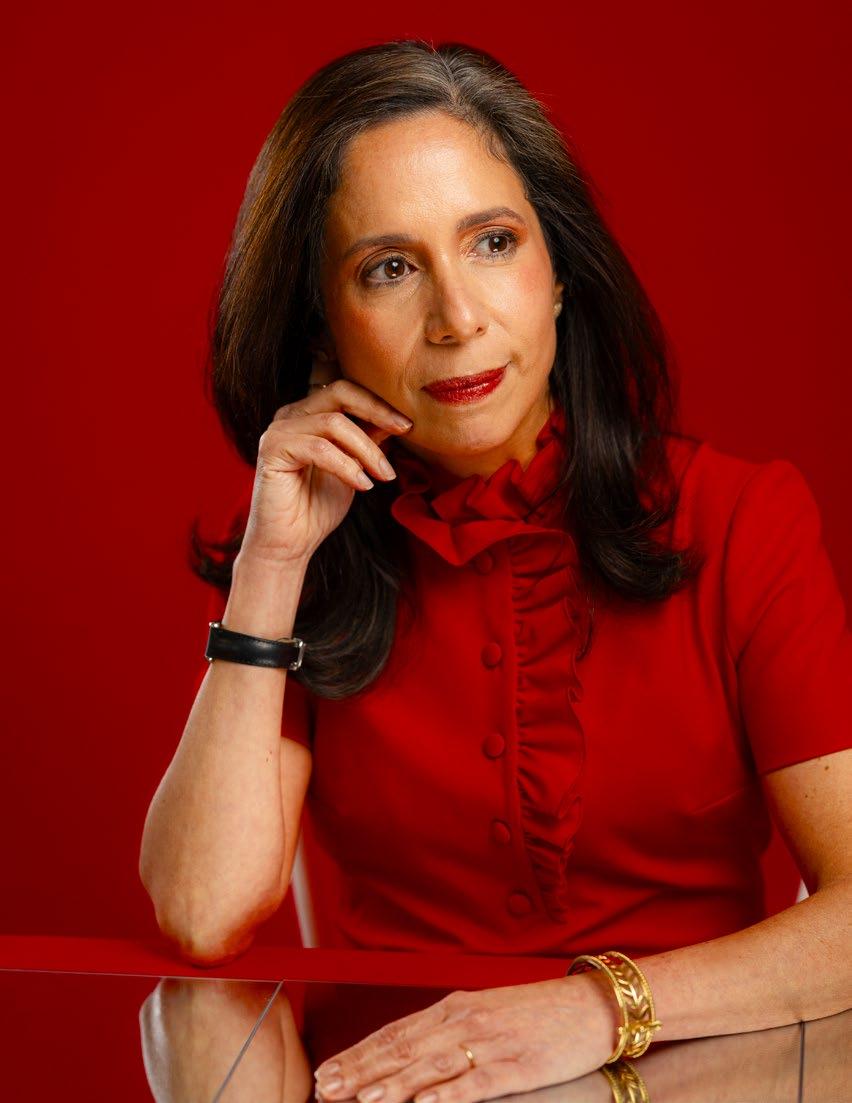
86 Leading Latinas
“I can be pretty tough, too. I hold people accountable. I expect excellence. I work very hard; [it’s] something I learned very early.”

“I think there are leaders amongst all of us,” she says. “At my early town hall, I told the entire company: call me, give me your ideas, stop by. People took me up on it, but it was not the culture of the place. It’s a very collaborative and consensus-driven place, but it’s also very process-oriented as to how decisions get made and how communications are done. Here I was, someone who was very open to talking to everyone and seeing everyone, so the good news is I think the company has realized that it’s all just my desire to learn, to be able to serve the company, and to serve what we do.”
As she closes in on her first year as CEO, Almodovar is committed to continuing to center innovation, opening lanes of communication, and delivering on a greater mission because she knows that, together, all of these decisions can have positive ripple effects on society and the industry at large. Her ability to reach out and reach in has already proven effective in her day-to-day role.
“One thing I do in terms of my leadership is I do reach out [because] I do think you need all types [of people], all levels in a room coming up with ideas, and that’s where innovation starts,” she says. “I see people [and] I like listening to different points of view . . . I am very open, and maybe this has to do with being a person of color myself, but I am very open to different styles. I always tell my children that being nice goes a long way. And look, I can be pretty tough, too. I hold people accountable. I expect excellence. I work very hard; [it’s] something I learned very early.”
And it’s that combination of hard work, empathy, and self-awareness that has helped her continue to build on her family’s definition of “home” and expand on it by reaching in to support other people on their own home journeys. This writer believes it is no exaggeration to say that Almodovar’s work will leave a lasting legacy for the country’s housing finance system, and that this legacy will likely impact every one of our readers in one way or another.
FARAZ HYDER / ADOBE STOCK
VIEW PRISCILLA ALMODOVAR’S FEATURE ONLINE FOR EXCLUSIVE CONTENT. 87 Hispanic Executive
 By Noah Johnson
By Noah Johnson
TKTKTKT
Javiera Balmaceda shares her passion for the movie industry, elevating Latin American stories, and her work at Amazon Studios
88 Leading Latinas

JAVIERA BALMACEDA
Head of Local Originals, Latin America, Canada & Australia Amazon Studios
COURTESY OF AMAZON PRIME VIDEO
Javiera Balmaceda was born in Chile, and ultimately raised in Texas and California when her parents became political refugees.
Growing up, she and her younger brother, Pedro, would spend hours at the theatre as going to the movies was cheaper than hiring a babysitter, and that’s where they cultivated a deep love of film.

“I was always a rule follower, so I would stay at the one movie we bought a ticket for, but my brother would run around watching all the other movies,” Balmaceda recalls, with a smile. “Then, the minute cable dropped, we got HBO. I could tell you the first HBO movie I watched, which was The Terry Fox Story. From there it was MTV and other channels, digging into thousands and thousands of hours of television.”
Her brother, who goes by Pedro Pascal, using his mother’s maiden name, went on to appear and star in several movies and television series, including as the
protagonist of the HBO drama The Last of Us. Meanwhile, Balmaceda brought her passion to the industry behind the camera for the likes of Claro Video, Target Entertainment, Comedy Central, Cartoon Network, HBO, and more. She spent years managing content-related departments for major production companies, helping them develop successful content for Hispanic and international audiences.
Today, she’s the head of local originals for Latin America, Canada, and Australia for Amazon Studios, a role that allows her to place the stories of Latino and Hispanic artists in front of the world.
“What speaks to me the most is being able to show the variety of storytelling that’s coming out of Latin America,” she says. “It’s not just trauma porn, another immigrant
story, or another narco story. There’s so much more to be told about the lives and the people of South America and all of Latin America. That’s what I’m really passionate about, connecting with the different artists and creators from those regions and helping them get their stories told on such a huge platform like Prime Video and having the world be able to recognize their talent.”
That passion is reflected in her body of work. She’s helped the company produce and launch more than thirty movies and series in the last year alone and is currently overseeing a record-breaking content slate concurrently in development.
One of the shining examples of her and her team’s efforts was the critically acclaimed and Golden Globe winner Argentina, 1985, which was the only Latin
90 Leading Latinas
American Oscar nominee in 2023. She was also a force behind LOL: Last One Laughing, which was adapted from the Japanese series Documental LOL has become one of Amazon Studios’ most successful global franchises since the format was first adapted in Mexico in 2018 and has since been localized across in nineteen countries.
While Balmaceda’s career has been filled with many highlights, it’s also had its fair share of challenges. As a woman navigating the industry in the early 2000s, she was usually one of the only women in the room or was one of few. When she thinks of the difficulties associated with that, she feels it was best described in a monologue performed by America Ferrera in Barbie, where Ferrera notes that: “It’s literally impossible to be a woman.”
“It’s amazing because it feels like it encompasses the last twenty something years of my life,” she explains. “How to behave,
how to present, and make sure you’re getting your ideas across when you’re the only woman with power in the room.”
But that didn’t stifle her determination. Balmaceda has an inherent fearlessness and stubbornness to her. At the same time, she believes that part of her success has also come from a privileged place.
“My parents struggled as political refugees and worked so hard to provide for us,” she says. “I was able to graduate from a private university without any debt. If I didn’t like something I knew that I could quit and always had something to fall back on and that’s important to acknowledge. I had a really good support system behind me, knew I’d be taken care of, and that’s helped me be so sure of myself and where I want to be.”
That kind of introspection has been a staple of Balmaceda’s leadership journey.
Recently, she’s been learning a lot from younger generations like millennials and Gen Z. One lesson has come from a quote she read.
“Follow your dreams; dreams are made from hard work, and I’m sure I sound like my dad, but it’s not really about putting in the time but it’s setting up ‘this is where I want to be and this is how I’m going to work towards it,’” she says. “And you can’t be afraid to ask for those things. That’s what young people are teaching me. Have those talks about salary, don’t be afraid to say, ‘I want to be here in the next two years,’ but also know that it’s work.
“Acknowledge the things you need to work on but still ask, ‘What do I need to do to get there?’ Because people in my position [would] rather know where you want to go to help pull you up, rather than say, ‘This is where you should be.’”
91 Hispanic Executive
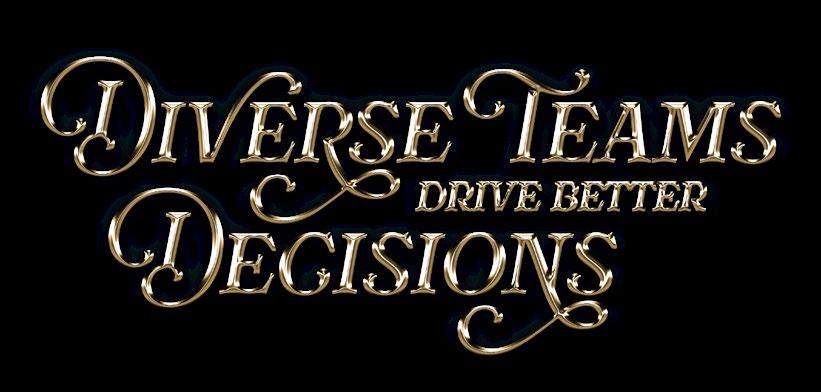 By Noah Johnson
By Noah Johnson
CEO Sandra Martínez understands that different perspectives will help Nestlé Oceania achieve net zero emissions by 2050
TKTKTKT
92 Leading Latinas
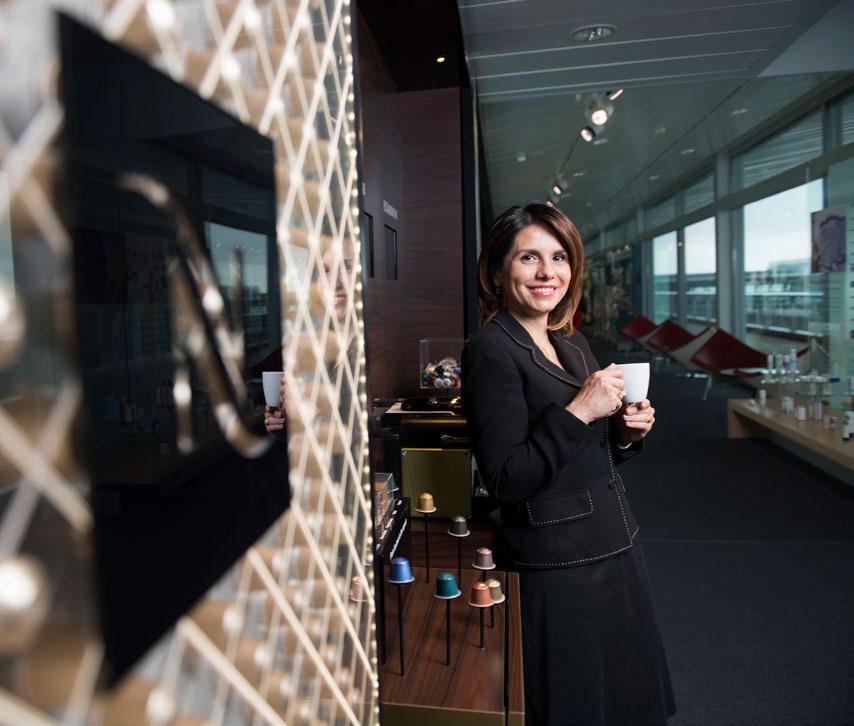
COURTESY OF NESTLÉ
93
SANDRA MARTÍNEZ CEO Nestlé Oceania
Hispanic Executive
Sandra Martínez is the CEO at Nestlé Oceania,
where she oversees a region that includes Australia, New Zealand, and the Pacific Islands and proudly leads teams that are behind the world’s most iconic brands. Prior to that, she successfully led different business units and markets in regions across the globe, building cross-functional teams, and she was the first woman in Nestlé’s history to lead a Latin American country.
Despite siting in one of the most respected seats in the C-suite, Martínez views herself as “an ordinary person who had extraordinary opportunities”—ones that allowed her to grow into the leader she is today.
“The fact that I’ve been given opportunities to work in different cultures and countries has tested me in ways I could’ve never imagined,” says Martínez, who’s been at the company for over thirty years. “I learned that it’s not about how much you know, but about how much you can learn and leverage from your team’s strengths to guide them toward common and ambitious goals.”
That’s been especially important as she’s navigated her teams through supply chain constraints, talent shortages, inflation, and the effects of climate change on the food and beverage industry. The latter issue has been a key focus for Martínez and Nestlé, which aims to transition to net zero emissions by 2050.
“We believe climate change is possibly everyone’s greatest challenge and a significant risk to the viability to every business,” she says. “But what drives me to make it a priority is climate change is also a threat to the future of our children and grandchildren.”
Overall, 5 percent of Nestle’s total greenhouse gases come from its operations, 95 percent comes from indirect activities up and down its value chain, like farming, or end-of-life of sold products. While Nestlé is making progress with changes to their packaging, there are other “system” changes needed to create a circular economy, which can only be achieved working collectively as an industry and in partnership with others.
That’s why Martínez and her colleagues are participating in Australia’s National Plastics Recycling Scheme project, which aims to take hard-to-recycle soft plastic packaging out of waste streams and making it easier for people recycle at home. The goal is to turn used soft plastics back into new food-grade packaging to create a circular plastic loop and cleaner recycling streams for all materials.
Taking on that kind of initiative takes courage, considering its challenges.
“For starters, our industry must work with other industries that sometimes have conflicting goals,” she says. “There’s huge capital investments required for new recycling infrastructure that can help foster a circular economy for plastic packaging, but seeing brand owners, consumers, and manufacturers united in one powerful scheme is really worth it.”
Martínez’s passion for her work expands past Nestlé. “In this past year I attended a conference with Sandra that focused on
94 Leading Latinas
sustainability and waste. I am very impressed with Sandra’s passionate drive to develop supply chains that are progressively sustainable for both Nestle and their suppliers,” says Pratt Industries’ Global CEO Brian McPheely.
This isn’t the first time that Martínez has participated in a diverse team to solve problems. She’s spent her entire career at Nestlé doing it. She started as a trainee and an export manager for Ecuador and, in a short period of time, became a business development manager in Switzerland. From there, she took on a leadership role in Canada, where she transformed the confectionery business unit into a profitable one, and then to Venezuela, where she became the first woman to lead a Latin American country in Nestlé’s history. In the latter role, she achieved high-performing targets amid a time of an economic and political crisis marked by food shortages, hyperinflation, high crime, and a disappearing middle class.
She derives her fondest and most intense career memories from this challenging time. “I had an incredible team, and we faced a lot of professional and personal challenges together,” Martínez says. “We would have the most heated and passionate debates but still focused on listening and supporting each other.
“I’ve found that different perspectives make conversations enriching and interesting and helps to make for better decisions,” she adds. “They force you to rethink about what you believed coming in.”
Martínez advises young professionals to be clear about what they want to achieve and then, to go for it.
“When you define exactly what you want to be, everything becomes easier because you’ll have energy and the patience to pursue it,” she says. “Then, on your way to achieving it, don’t stress too much over the small stuff. Everything in life passes. Don’t take failure too seriously, and any mistake is just an opportunity to learn.”
The
Journey to 2050
Top eight actions Nestlé is taking to reduce greenhouse gases:
Sustainably sourcing ingredients
Evolving its packaging
Driving toward cleaner logistics
Using the power of its brands and products
Transforming its product portfolio
Using renewable energy to manufacture products
Removing carbon from the atmosphere
One Two Three Four Five Six Seven eight
Using its voice to galvanize action
95 Hispanic Executive
 By Frederick Jerant
By Cass Davis
How Julissa Soto’s experience with the US healthcare system compelled her to become one of Colorado’s leading public health advocates for the Latino community
Portraits
By Frederick Jerant
By Cass Davis
How Julissa Soto’s experience with the US healthcare system compelled her to become one of Colorado’s leading public health advocates for the Latino community
Portraits
96 Leading Latinas
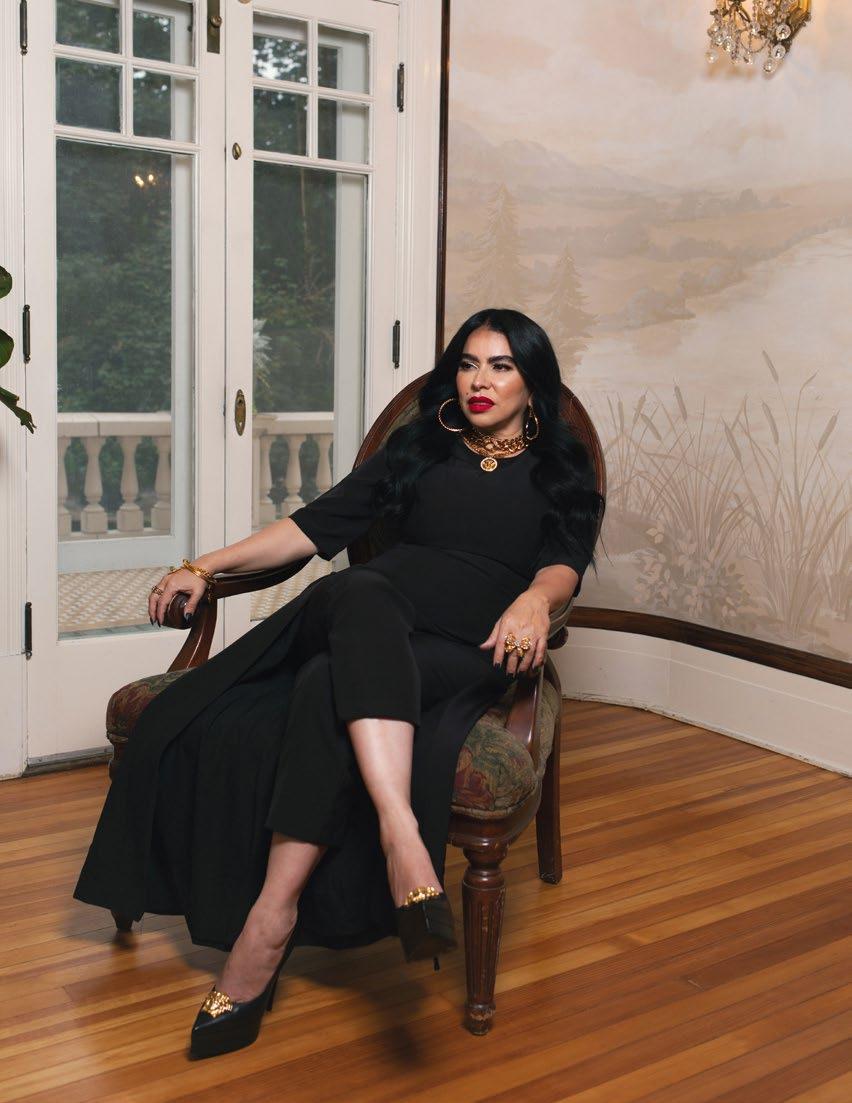
97
Hispanic Executive
 JULISSA SOTO CEO and Founder Julissa Soto Latino Health Equity Consulting
JULISSA SOTO CEO and Founder Julissa Soto Latino Health Equity Consulting
98 Leading Latinas
Sometimes your path in life seems pre-determined.
If your family has money and status, your future includes education, connections, and a wealth of opportunities. For the less well-off, success can be more of a dream than an actual possibility. Julissa Soto, CEO and founder of Julissa Soto Latino Health Equity Consulting, overcame the latter.
Her story began twenty-four years ago with her entry to the US from her native Michoacán, Mexico, via sixteen hours in the trunk of a car. “My then-husband brought me into the US that way, while my children were able to enter legally,” she recalls. “I immediately had to deal with the differences between new immigrants and what I call US Latinos—those who knew the ropes and had become successful.”
One thing, though, remained constant: brutal beatings inflicted by her abusive now ex-husband. “Because I was undocumented, I was afraid of calling the police, and so just endured them until I woke up in the
hospital,” she says. “My arms and legs were broken, and I had been in a coma.”
But an Anglo woman she calls her “white angel” helped her navigate the American healthcare system. “Without her, I wouldn’t have known the public health care system exists,” Soto explains. “I had no insurance, so I had been running to local emergency rooms. I didn’t know any better.”
Following her recovery, Soto set out to become a public health advocate for the Latino community.
The COVID-19 pandemic was her primary trigger for changing the status quo. The key to Soto’s work is healthcare equity. “To me, that means everyone has the same opportunity for access to care,” she says.
In early 2022, 77 percent of Colorado’s population was vaccinated, and about 39 percent were Latinos, according to figures from the Colorado Department of Public Health and Environment. “Many providers
99 Hispanic Executive
believed Latinos were vaccine-hesitant, but I knew the problem was access,” Soto says.
She organized the first of many “Vaccine Sundays”: church-based events where she addressed the congregation about the need for getting the shots and invited everyone to a vaccination clinic on church grounds.
Her program was a smash.
“The state sent us one clinic bus, but we ran out of vaccines in the first four hours. We had to call for two more buses,” she says. “By 11:00 p.m. that night, we had vaccinated 1,279 Latinos. I later said to the healthcare providers, ‘Does this look like hesitancy to you?’”
Since then, she’s been the engine behind the vaccination of more than 24,000 Latino adults, youth, and children in her community. Soto continued working

100 Leading Latinas
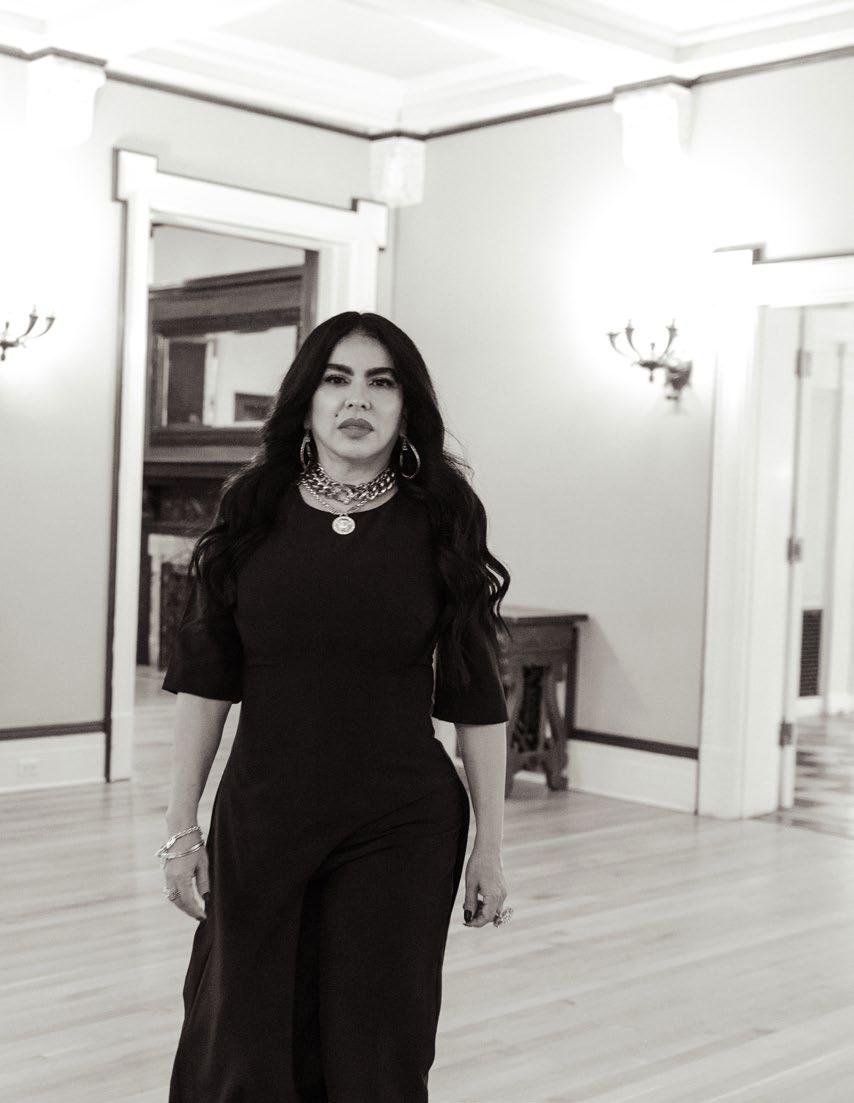
101
Hispanic Executive


with other community groups and the state to hold pop-up clinics at neighborhood fairs and parties, churches, schools, and even Latino grocery stores. Within a few months, her programs distributed 130,000 home COVID-19 test boxes and 70,000 masks.
Her keystone program—“One Vaccine, One School at a Time”—was modeled after Vaccine Sundays. Providers and families meet at local schools for routine childhood immunizations and parents learn about opportunities to receive additional care.
The program exemplifies Soto’s reliance on cultural validation, as well as her work as a “transcreator.” “Cultural validation creates genuine relationships with communities and meets communities where they are,” Soto explains. “It’s about connecting with people authentically and speaking in languages they
use, but not just translating information from English to Spanish.”
She cites one Coloradan school-age program originally named “Shots for Tots.” It sounds cute to American ears, Soto explains, but a straight translation could be fraught with potential misunderstandings for non-native speakers—shots of tequila? Gunshots? Rebranding it as “One Vaccine, One School at a Time” conveys the essential information more clearly.
While some have labeled her as a “disruptor,” Soto sees herself more as a change-agent. “That’s why I started my business,” she says, “to replace the old ways with better approaches to public health.”
And her approach has gained plenty of traction. Colorado Governor Jared Polis proclaimed September 20, 2021, as “Julissa
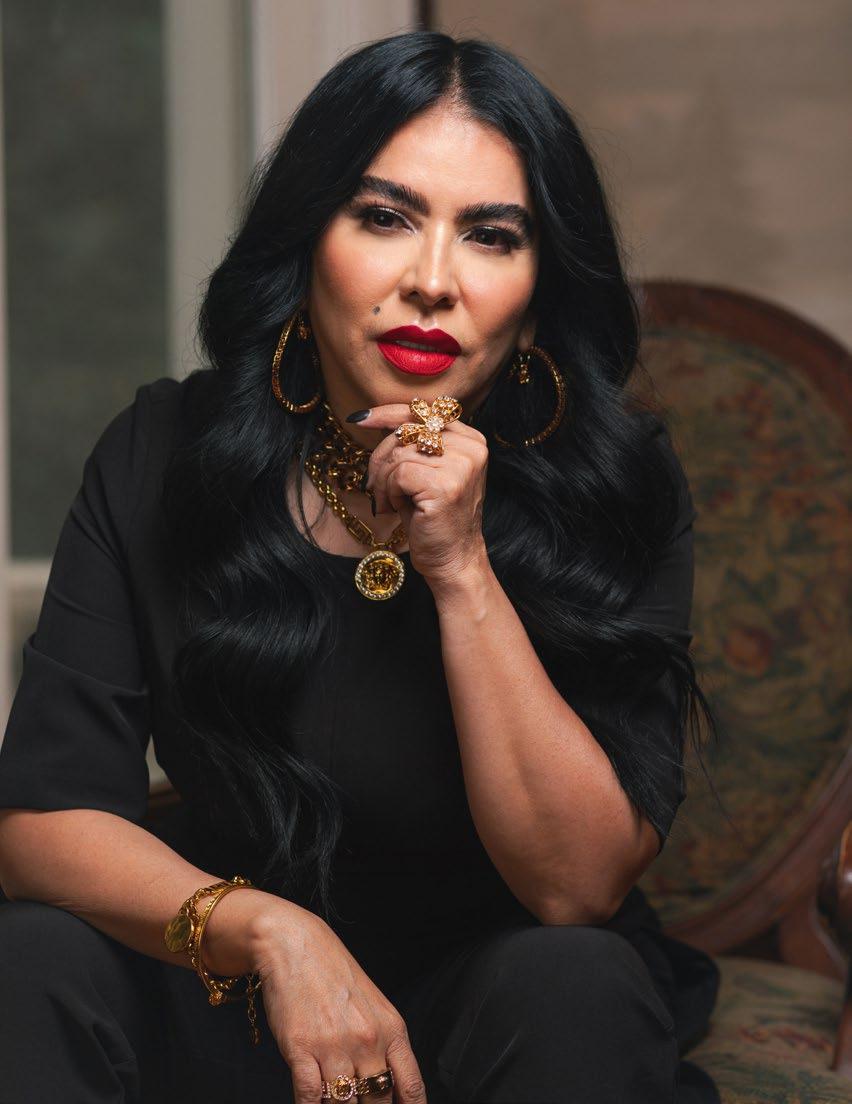
103
Hispanic Executive

104 Leading Latinas
Soto Day,” and her advocacy activity has been covered by NPR, Time magazine, the American Public Health Association’s Public Health, Religion and Spirituality Bulletin, and a documentary film from the Colorado Cross-Disability Coalition.
Soto hosts Prevention is Health on Tigre Radio, and her initial journey through the thicket of the US healthcare system was the subject of Mexicanos Exitosos, a documentary produced by Mexican television channel as part of a series that spotlighted the stories of Mexicans who have made it in America.
It’s been a long haul for Soto, but a fruitful one. And she offers some insights to immigrants who want to pursue their professional careers in the US.
“Don’t let people tell you how far you can go,” she affirms. “Richard Montañez, who was instrumental in the development and launch of Flamin’ Hot Cheetos, was hired as a janitor and eventually rose to vice president of multicultural sales and community promotions for PepsiCo North America.
Hispanic Executive
“ Many providers believed Latinos were vaccine-hesitant, but I knew the problem was access. ”
“People will often say ‘no’ to your new ideas,” she continues. “Don’t let their attitude keep you down. And don’t be afraid to persevere; when your path seems hard and painful, you’re usually on the right track.”
Despite her many accomplishments, Soto admits there’s still plenty more to do. And she has no intention of easing up until she attains her goal. “Our public health systems need to be easier and better for everyone. I’m focusing on the needs of Latinos and Spanish-speaking immigrants, but the result will be a public health system that really cares about all of us. Equity is for everyone. That’s what I’m aiming for,” she said.
105
 By Billy Yost
By Billy Yost
How Catalina Laverde took ownership of her life and career to set the course not only for herself, but also to show other Latinas how they can do the same
TKTKTKT
106 Leading Latinas

MARISOL CASTAÑO 107
Hispanic Executive
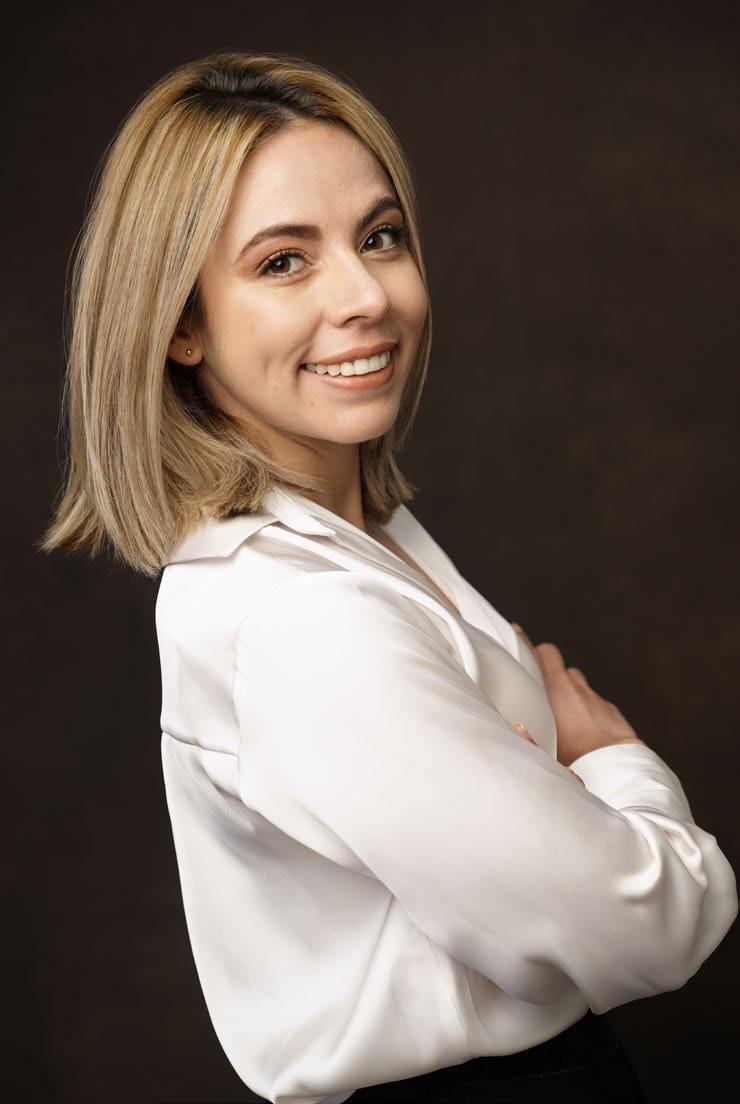
MARISOL CASTAÑO
108 Leading Latinas
CATALINA LAVERDE Senior Engineering Manager Spotify
When she was just fifteen years old, Catalina Laverde vowed to both of her parents that she would leave Colombia,
move to New York City, and make a life there. At the time, her father just laughed.
“I just remember him saying, ‘Cata, we don’t have the money for that. I don’t think that will ever happen for you,’” recalls Laverde, who is currently senior engineering manager at Spotify. “I don’t think he understood the promise that I had made to myself.”
Just a year later, she wasn’t getting much further with her parents. Her mother agreed to support her move, assuming that she would forget about it by the time she turned eighteen.
Laverde didn’t.
When she turned eighteen, Laverde had all of her paperwork ready to go. Without knowing a word of English and without a network of support or any real understanding of what life in the US looked like, she moved to the States in 2010.
Laverde will soon celebrate her tenth year at Spotify, where she first began as an engineering intern and has now been promoted through five roles. She leads a multidis-
ciplinary team of over thirty-five software engineers and engineering managers for Spotify’s Home and Browse Experience on its mobile client—the same that millions of people engage with every day at home, on a commute, at the gym, or at work.
Along with those promotions, Laverde has also continued her education, earning her executive master's in technology management from Columbia University in 2022, a challenge she kicked off at the height of the COVID-19 pandemic. The strain was substantial, especially because of the challenges she’d taken on behalf of her family.

One of her sisters is now a dentist; the other is a lawyer. When Laverde makes a promise, no matter the challenge, she will fulfill it.
But it’s not that simple. To see her life simply as a fulfillment of a promise or dream is to drastically undersell exactly what she has undergone to get where she is. And for Laverde, it begins with a simple mantra.
Laverde lost her mother to cancer in 2017, a devastating blow to her and her two younger sisters. The loss was paired with an incredible level of responsibility.
“My sisters were both younger than me, and my mother was so anxious about their futures,” Laverde explains. “I promised her that I would make sure they had successful futures, that I would help them graduate from college.”
“I believe that you are the CEO of your own career,” Laverde stresses. “It doesn’t matter how many layers of leadership there are above you. You have the influence and the power to change your current reality. If you need to have the skills—or learn the skills—to manage up effectively, start by asking for both what you need and what you want.”
That ask is something she wants to see more women doing. She knows what it means to instead wait to be given the go ahead, to be promoted from sheer hard work. Laverde calls it a “rescue fantasy” that might come with seeing too many Disney movies.
109 Hispanic Executive

And at Columbia, we will prepare you to lead the way.
“IT DOESN’T MATTER HOW MANY LAYERS OF LEADERSHIP THERE ARE ABOVE YOU. YOU HAVE THE INFLUENCE AND THE POWER TO CHANGE YOUR CURRENT REALITY.”
“The reality is that we have to take ownership of our own careers,” the senior manager says. “I had to do that by leaving Colombia by myself and without understanding English. I had to learn how to survive and adapt to the ridiculous cold of New Jersey to earn my degree while actively learning English. You have to make your own opportunities as much as you can.”
As a rising leader, Laverde says she’s increasingly aware of how important it is for those beginning their careers to see a Latina in a position of leadership. Laverde herself could have jumped into management, but she decided to pursue a staff engineer job because, after looking through the list of current employees, she didn’t see any Latinas with the job.

The senior manager’s education also never stops. When she took on her first people management role in 2020, her department was rocked by a beloved employee who lost his life in an accident. In yet another moment of intense grief, Laverde also had a responsibility to help her team navigate the pain.
“It was so hard, but we went through it together,” she says. “No one left. No one quit. We found a way to honor Isaiah and keep him in our hearts. It was a very hard moment to begin my managerial experience, but now I’m grateful I got to be there for my people.”
“Someone needed to blaze that trail,” she says. “People need to see that a role is possible, and they need to see someone that looks like them do it. I challenge everyone to improve diversity on their teams because it legitimizes the dreams of those from underrepresented communities."
For over a decade, Laverde has been fulfilling her promise to herself. She’s made a life in the States. She’s found incredible success. And she continues to be a role model for her sisters and for the countless Latinas who will know they can build a career in tech and engineering.
All because of the promise Laverde kept to herself.
110 Leading Latinas
Options
Master of Science Full-Time | Par t-Time
Exec. Master of Science 16 Month Program Learn more at sps.columbia.edu/TECH24
Scan for more info
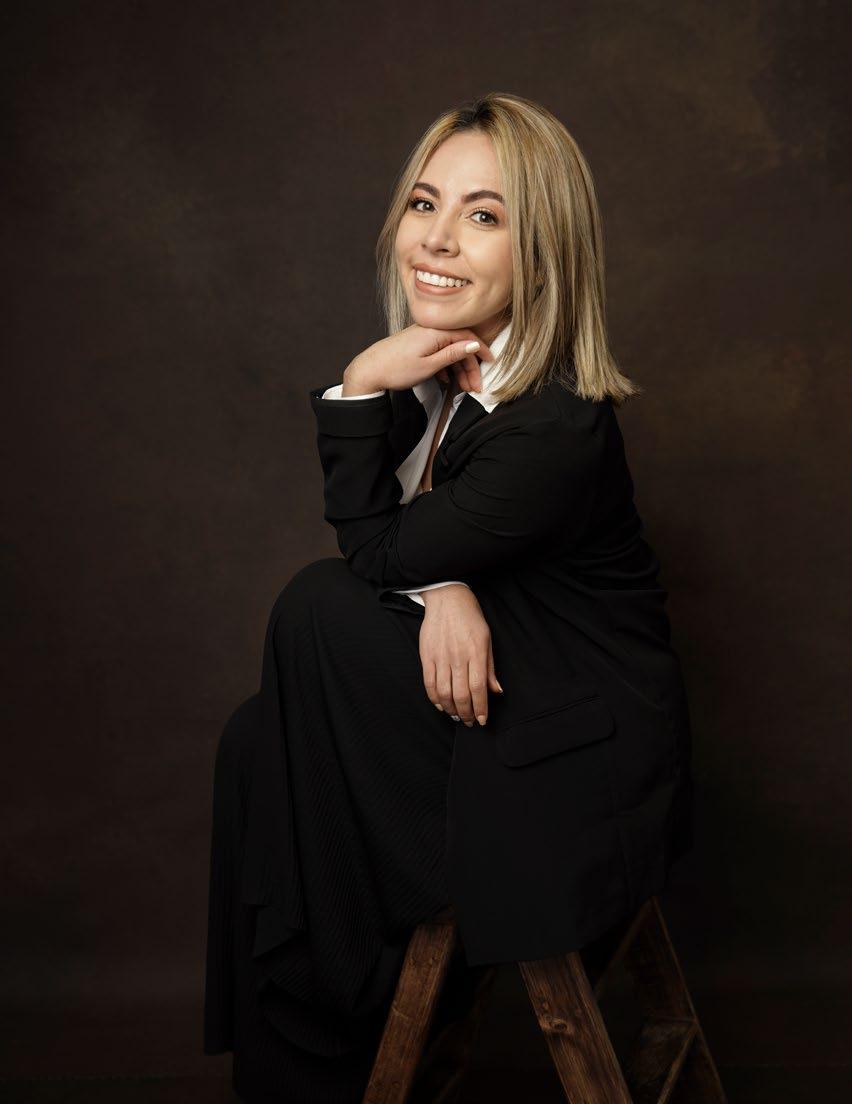
MARISOL CASTAÑO 111 Hispanic Executive
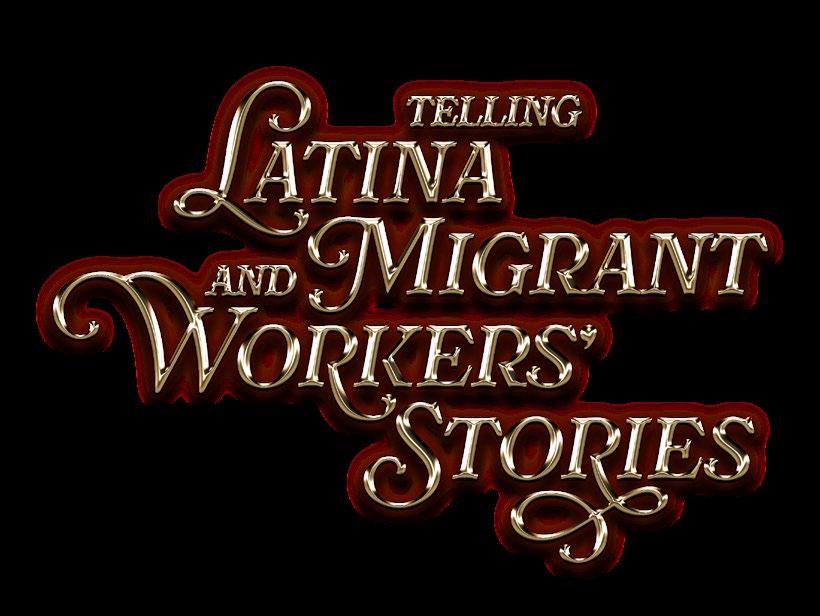 By Billy Yost
By Billy Yost
Mónica Ramírez reflects on twenty years of advocacy, the many issues afflicting Latinas and migrants, and the changing face of rural America
TKTKTKT
112 Leading Latinas
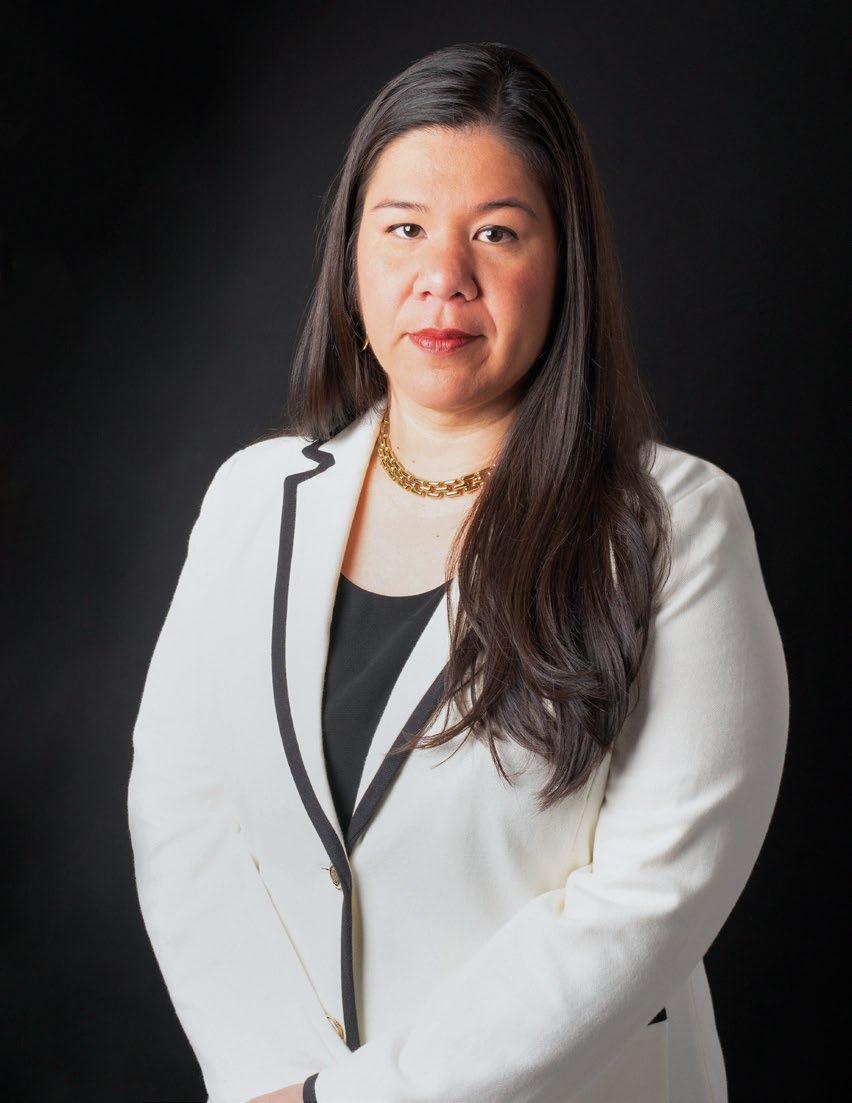
COURTESY OF JUSTICE FOR MIGRANT WOMEN
MÓNICA RAMÍREZ President and Founder Justice for Migrant Women
Mónica Ramírez walked into the newspaper office of her Ohio hometown at the age of fourteen with a question for the editor.
The paper had just done a full-page story welcoming back the seasonal fishermen who would arrive every June like clockwork. So why was there no welcome story for the migrant farmworkers who arrived at the same time to work the fields and prepare the land for a fall harvest?
“To his credit, the editor said it just wasn’t something he’d thought about, and he encouraged me to go out and write about it,” Ramírez says. “I’m grateful now because he could have just shooed me out and who knows what I’d be doing today. But that newspaper beat gave me the chance to start writing about farmworkers and the Latino community at the age of fourteen.”
That story is a perfect example of the casual indifference faced by so many communities in the US and of Ramírez’s passion and drive to share the experiences of those whose stories aren’t told.
Ramírez is an activist, a civil rights attorney, an author, a builder, and a storyteller. She
has created or been a partner in the creation of organizations that shine a light on the plight and struggle of Latinos. Justice for Migrant Women, Esperanza: The Immigrant Women’s Legal Initiative, the award-winning Bandana Project, Alianza Nacional de Campesinas, and most recently, both the The LatinX House and Poderistas have all focused on Latinas and migrants, how they are viewed by the larger public, and how to celebrate, support, and advocate for a population that is often forced to exist in the shadows.
The proud advocate has won countless awards for her work, her presence was requested at the 75th Golden Globe Awards by the actress Laura Dern, and her public letters, including the “Dear Sisters” letter that helped spark the Time’s Up movement, have been read by millions of people across the world.
“If there’s one person who doesn’t seem to give these distinctions any thought whatsoever,” the adage goes, but in this case it’s simply the truth. Ramírez has dedicated
114 Leading Latinas
her life to serving and advocating for people she grew up around, people like her parents’ families who spent most of their lives traveling the migrant stream starting in Texas and working their way around the US. Ramírez’s father started working when he was eight and her mother when she was five.
“Growing up, I didn’t understand the problems of migrant workers because the community I saw was so beautiful,” Ramírez says. “I’d see all of these people at church on Sunday, and they just felt like my family. They were my family. It wasn’t until I started asking my parents questions that I began to see the bigger picture.”
Ramírez began to understand the joy she saw in her community was undercut by pain, turmoil, and a system that, at best, ignored them and, at worst, did its absolute best to ensure they stayed poor, mistreated, and forgotten by society.
All these years later, Ramírez says the results of her work and the work of count-
less others is still mixed. She doesn’t say this with sadness or frustration. If you dedicate your life to service, she says, you cannot assume the change you desire will take place during your lifetime. It’s not about deriving some personal feeling of accomplishment; it’s about making the lives of the people around you better.
Latina Equal Pay Day still recognizes the gross disparity in the ability of Latinas to approach anything resembling economic parity. Despite a presidential regime change that promised different outcomes than putting humans in cages at the US-Mexico border, the Biden administration has quietly carried out largely the same policy of his predecessor, albeit one much more forgiving by the broader media narrative.
At times, Ramírez sees some aspects of the fight as worse off than when she started. But twenty years in, she has done so much good, and she believes there are others ready to do the same.
TKTKKTKTKTKT
115
Executive
Hispanic
“FOR THOSE WHO WANT TO BEGIN A LIFE IN ACTIVISM, IT’S A HUGE RESPONSIBILITY. . . . EVERY STEP FORWARD IS PROGRESS FOR THE LARGER MOVEMENT.”
116 Feature
“For those who want to begin a life in activism, it’s a huge responsibility,” Ramírez says. “But if you allow yourself to get overwhelmed by that responsibility, nothing you do seems like enough. You have to start small. Every step forward is progress for the larger movement. It’s never just about you. It’s about what we can do together. You can’t put all of that pressure on yourself.”
At present, Ramírez is doing her best work to try and help the US reframe the way it defines “rural America.” The Rural Civic Engagement Initiative is highlighting the fact that 19 million people of many diverse backgrounds live and work in the often white-washed “rural USA.” Those women often “live in poverty, face persistent inequality, and lack the services and the protections that they need to live
healthy and whole lives,” according to the initiative’s website.
The initiative is conducting outreach efforts to those women to create a voting bloc that can advocate for their rights as women, as Americans, and as human beings. The initiative is also focusing on ways to build local power across communities, like encouraging members to run for local elections, positions that can make huge impacts in small communities.
At this moment, this is where Ramírez is focused, but she is always being pulled in multiple directions at once. Making the lives of migrant workers, Latinas, people of color, and other minorities require approaching the roots of problems from every conceivable angle. It’s hard work. It can be incredibly dispiriting. But it can, and will, change the world.”
The Continuing Battle for Latina Equal Pay
Every October 5 in the US, we commemorate one of the more shameful milestones of our current reality. Latina Equal Pay Day shines a light on the fact that for full-time, year-round workers, Latinas earn fifty-seven cents for every dollar a white, non-Hispanic man earns.
The culprit? Everything from citizenship status to an overrepresentation in industries lacking even the most fundamental of workplace protections. That means Latinas are not only more often the victim of wage theft but also sexual harassment and other injustices no one should have to endure for the sake of earning a living.
“This has been a movement that we need to see continued support and passion for,” Mónica Ramírez explains. “We can’t forget about this disparity, or it will just keep getting worse.”
Learn more about how you can be part of the solution at justice4women.org/latina-equal-pay.
117 Hispanic Executive
 By Natalie Kochanov
By Natalie Kochanov
Lara Bueso Bach brings a fierce commitment to diversity and service to her first in-house role at TelevisaUnivision
TKTKTKT
118 Leading Latinas
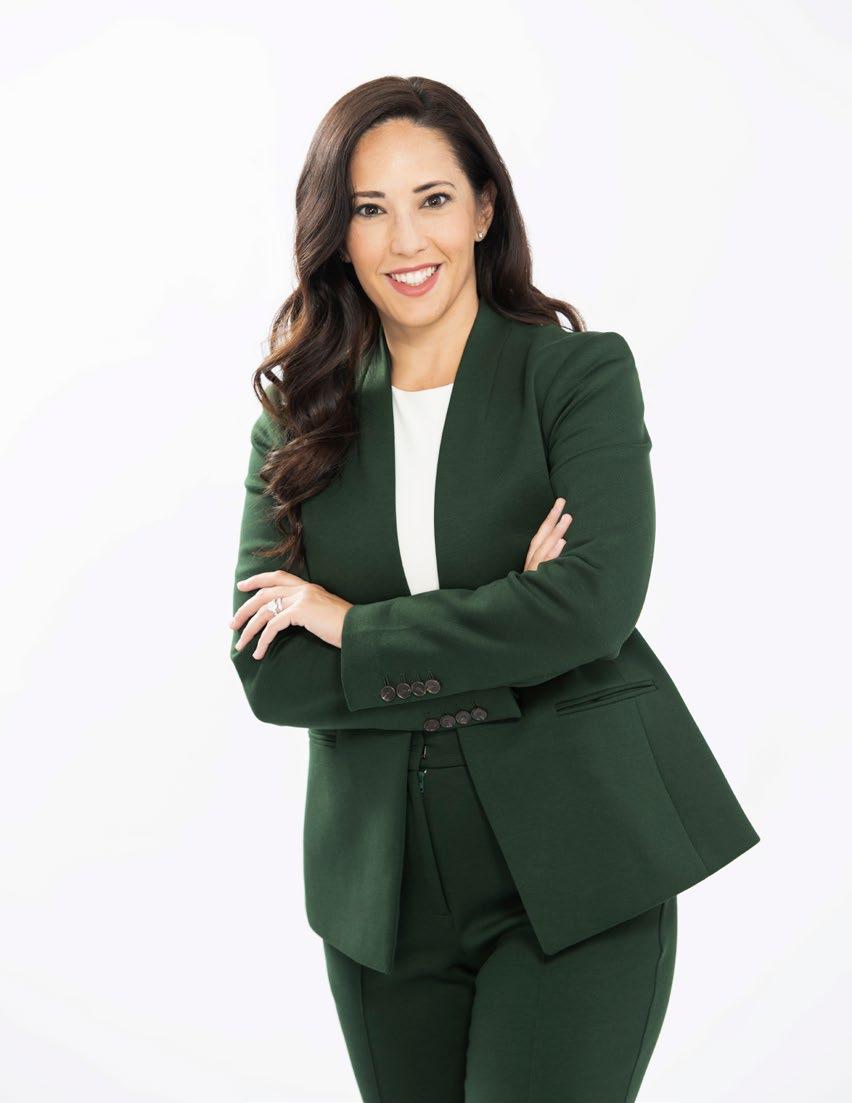
COURTESY OF LARA BUESO BACH
119 Hispanic Executive
LARA BUESO BACH SVP of Litigation TelevisaUnivision

Sitting inside TelevisaUnivision’s Newsport facility, surrounded by the buzz of the newsroom
with dozens of monitors, set lights, and cameras, Lara Bueso Bach often contemplates how different life can be on the other side of the same profession.
Before joining TelevisaUnivision in June 2022, Bach had spent her entire legal career working for a global law firm, where she focused her practice on highstakes commercial litigation across various industries. Although she had invested considerable time and energy in climbing the big law corporate ladder, she found that she couldn’t pass up the opportunity to take a hard left turn into the world of in-house legal work at TelevisaUnivision, joining Executive Vice President and General Counsel Pilar Ramos.
“I had been advocating for years and years for greater diversity in the legal profession, where Hispanics comprise less than 5 percent of the profession. And then, serendipitously, I met Pilar through a mutual friend, the Miami Dolphins’ general counsel, and she was sing-
ing the same tune,” Bach explains. “I jumped at the opportunity to join not only her but also TelevisaUnivision, which represented a chance for me to work for mi gente, my people. Overnight, I went from the only Hispanic woman in the room to one of many.”
Bach came on board at the company—a global leader in Spanish-language media—as senior vice president of litigation. Her role has since expanded to encompass labor and employment and immigration matters as well. Amid navigating the move in-house, she has continued to look to Ramos for inspiration, as a legal leader and steadfast supporter of diverse talent. Bach draws, too, on the values she learned during her upbringing in Miami, the Hispanic-majority city that she and her family still call home.
She grew up with a passion for the law—a career choice her parents were quick to endorse. “My mom is Cuban, and my dad is from Honduras. Like most immigrant
parents, they always had a desire for me to do better than they did. That meant I could be a lawyer or a doctor,” Bach says with a laugh. “Thankfully, I actually liked the law.”
Her parents instilled in her three basic tenets—education, service, and gratitude— that now guide her approach to everything from leading a team to parenting her two daughters. “The most important gift you can ever give your child is an education,” she elaborates. “They know school will always come first, but we also take the time to regularly practice gratitude, recognizing that none of us have excelled on our own, but rather, with the support of the proverbial village along the way. And we teach to give back to our community in any way possible—from charitable contributions to beach cleanups and pro bono efforts.”
Bach credits her parents’ tenets with motivating her pro bono work throughout her decade-plus tenure at the international law firm Weil, Gotshal & Manges LLP.
120 Leading Latinas
While there, she assisted dozens of survivors of human trafficking in expunging their criminal records. “The assignments were very difficult emotionally but incredibly rewarding,” she says. “Each case gave the survivor a fresh start to seek employment, higher education, or even basic housing that their records had previously prevented them from achieving.”
In addition to her pro bono practice, Bach advocates on behalf of women lawyers as the former president of the Miami-Dade chapter of the Florida Association for Women Lawyers, where she founded their non-profit scholarship program that has funded over $100,000 in law school scholarships.
Her arrival at TelevisaUnivision happened to coincide with the major merger between Mexico-based Televisa and US-based Univision. “It was a great opportunity to reset and launch our new streaming platform ViX,” she says. “Everybody has this sense of orgullo, this pride, to be working here for our Hispanic audience and to be taking the company to the next level.”
Bach has fully embraced that sense of pride over the past year, which has seen her adjusting from representing multiple clients in private practice to focusing all her energy on a single client in-house. “I had practiced
complex commercial litigation for twelve years before I came over here but never in the media industry, where everything moves more quickly, at the same pace of breaking news.”
She plans to take a page out of Ramos’s playbook by ensuring that her team has the necessary financial support to pursue career development and leadership opportunities. Beyond that, she is eager to leverage her power as an in-house attorney to hire outside teams that reflect the incredible diversity of TelevisaUnivision itself.
“As in-house counsel, we are in positions that enable us to ensure that business is being distributed to diverse talent across the legal industry, which I consider critical to empowering our community and the next generation of diverse leaders,” she says.
As she continues to serve others and to grow her own leadership skills moving forward, Bach will combine daily doses of gratitude with heartfelt pride in what TelevisaUnivision is achieving.
“This company, every day, is executing on a vision to conceive, create and deliver world-class content to a diverse global audience,” Bach says. “I want to make sure that I’m supporting their business objectives while balancing and mitigating risk—and ensuring that, whatever we’re doing, we’re doing it with integrity.”
Leading by Example

Sidley is proud to congratulate our friend and colleague Lara Bueso Bach, Senior Vice President, Litigation at TelevisaUnivision. We join in recognizing your outstanding leadership and accomplishments over the years.
121 Hispanic Executive
Learn more about our commitment to cultivating an environment within the legal profession that fosters diversity and inclusion at sidley.com/diversity AMERICA • ASIA PACIFIC • EUROPE sidley.com Attorney Advertising - Sidley Austin LLP, One South Dearborn, Chicago, IL 60603. +1 312 853 7000. Prior results do not guarantee a similar outcome. MN-21234
 By Claire Redden
By Claire Redden
The founder and CEO built the MRN Agency on the premise that every culture consists of a myriad of multifaceted identities—all of which get a seat at her table
TKTKTKT
122 Leading Latinas
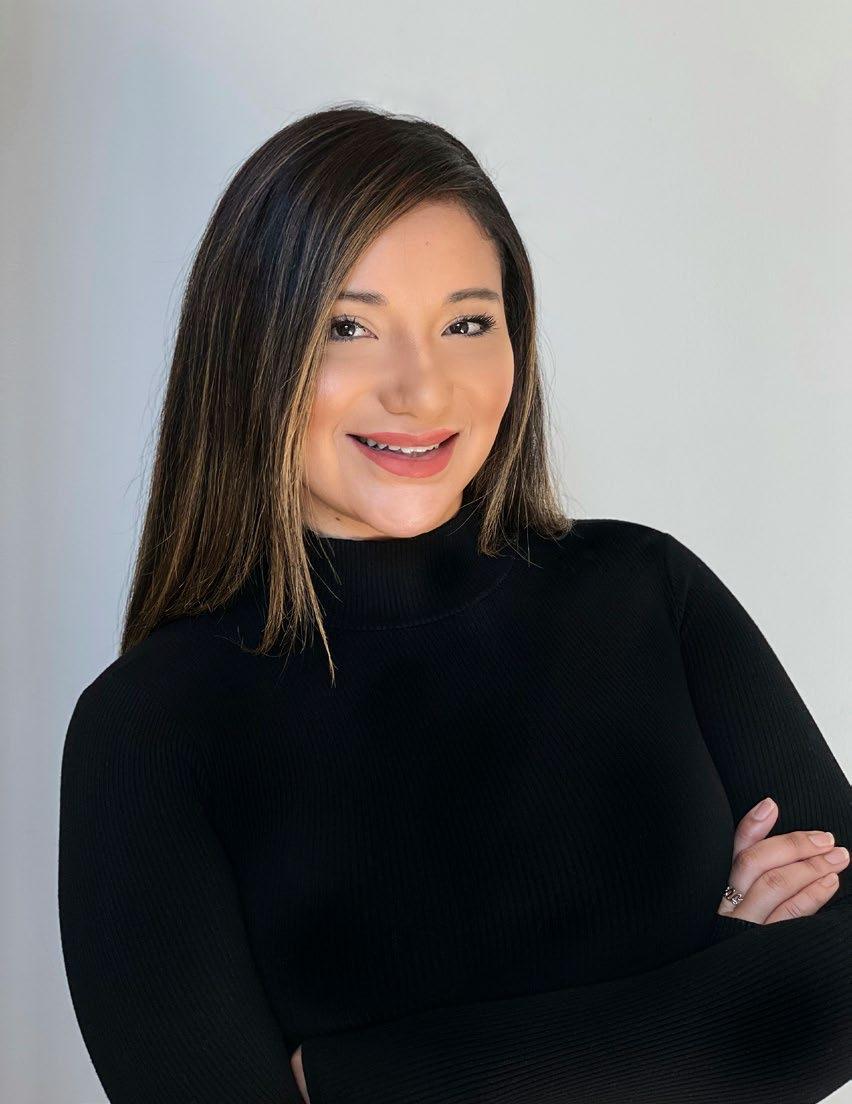
REBECCA NÚÑEZ
Founder and CEO
The MRN Agency
COURTESY OF THE MRN AGENCY
123 Hispanic Executive
There
is one image that has driven
Los Angeles native Rebecca Núñez throughout her career
and her life, really: her parents standing outside the city’s convention center, US citizenship certificate in hand.
“I love that photo so much. My dad is wearing bell-bottom pants, and my mom has a scarf around her neck because that’s what they thought American looked like,” she describes, laughing. “They’re so hopeful and proud standing on those steps. I’ve always carried it with me as a reminder to honor the sacrifice they made for me.”
But like many other first-generation children, Núñez long believed that the only way to honor them was through success. She spent the first decade of her career dedicated to doing just that: getting that important job title, the assistant, the big corner office, and the even-bigger salary. Only when she got it, she realized something.
“Even though I was invited to the table, my voice was never really heard,” Núñez says. “I realized that the way to really honor my
parents was to go back to that feeling of what they looked like holding that certificate.”
So, when Núñez’s big vice president role at a talent agency was impacted by the 2020 pandemic, she made a decision. “I decided what better time to bet on myself than when the world has come to a complete halt?”
She was right—the timing was perfect. “This huge shift was happening from a brand marketing perspective. Brands needed to reach out to their consumers, but they no longer had the budgets for these big agencies,” she explains.
Núñez parlayed the relationships with her past clients and started the MRN Agency right from her living room table. Within a few months, that table turned into her garage, and her garage into an LA office. Then, by the next year, she had another one in Mexico City.
What was the perfect time for her company turned out to be a devastating one for her family. At the earliest stages of
124 Leading Latinas
the COVID-19 pandemic, both of Núñez’s parents ended up in the hospital, where they tested positive for the virus. However, just seventy-two hours after her parents came home, it was her healthy, forty-year-old sister who ended up losing her life to the virus.
“It was incredibly turbulent for our family, to say the least,” Núñez says. But, at the same time, she had just started MRN. Unlike when she was working for a big agency where she could take time off to grieve, Núñez had to continue working.
“Her passing has been the foundation to continue with this agency because so much of it is in honor of her. She’s one of the first people who started in my living room with me,” Núñez says. In 2024, she plans to start a nonprofit foundation in her sister’s honor.

So much of that is at the core of the MRN Agency’s DNA, for women as well as for every culture and subculture its clients’ consumers represent. “I don’t believe that any one culture is a monolith. While, at face value, MRN is a 360 marketing and communications agency, our true value proposition is that we do our work through cultural intelligence,” Núñez explains.
That’s what makes MRN so special. Everyone not only gets a seat at the table but also receives a microphone before they sit down.
“[MY SISTER’S] PASSING HAS BEEN THE FOUNDATION TO CONTINUE WITH THIS AGENCY BECAUSE SO MUCH OF IT IS IN HONOR OF HER. SHE’S ONE OF THE FIRST PEOPLE WHO STARTED IN MY LIVING ROOM WITH ME.”
“We’ve differentiated ourselves by making sure that we eliminate echo chambers,” Núñez says. “Not only does that work to protect the client as a brand but also because all ideas are welcomed. Whether you’re the assistant or the CEO, everyone feels safe enough to raise their hand, and great ideas are born.”
Even with all the growth that’s happened at MRN in the past few years, it’s not always easy—not for any female founder and especially not one of color. But, as Núñez points out, women in business aren’t monoliths. She’s a testament to that herself.
“We are so multilayered, and our diversity deserves to be celebrated,” she says. “So many times, we hear these negative stats, and it stops us from trying. I’ve always been lucky enough to have mentors to tell me to take those leaps of faith.”
In many ways, MRN bridges all the gaps that Núñez experienced while working in agencies. And she’s also one of those bridges herself. “We’re still small enough that I get the privilege to watch the professional growth and to handhold, mentor, champion, and celebrate my employees. I feel like it’s my personal and professional responsibility to set them up for success,” she says.
With twenty-six employees and counting, Núñez has built a MRN family—and her parents couldn’t be prouder.
125 Hispanic Executive
 By Vivian Nunez
By Vivian Nunez
Latino Media Network CEO, CRO, and COO on how they were brought together by a shared vision of empowering Latinos through the power of radio
TKTKTKT
126 Leading Latinas
STEPHANIE VALENCIA & JESSICA MORALES ROCKETTO Cofounders
Latino Media Network
The
year 2023 was a big one for
Latino Media Network (LMN)
a media company with radio stations across eight of the ten top Latino markets. Stephanie Valencia and Jessica Morales Rocketto, the network’s cofounders, brought on Sylvia Banderas Coffinet and Rose-Anne Tifre to round out what is, as of fall 2023, the media industry’s first all-Latina C-suite.
“Women in Hispanic radio, at the executive level, make up less than 2 percent of the workforce—despite the fact that Latinas, as a demographic, are increasingly influential and are the primary decision-makers in household spending,” Valencia explains. “When you think about how underserved this demographic is, it only makes sense that we put them front and center and lead LMN with them in mind.”
Banderas Coffinet has been the company’s CEO since May 2023, after a long career in publishing and media that includes founding roles at Latina and Hola! USA and her most recent role as general manager of marketing, equity, and inclusion partnerships at Vox Media.
“I had the privilege of working and leading some of the best-known brands in the Hispanic market, like Latina, People en Español, and Hola! USA,” Banderas Coffinet says. “This is the first time that the owners and founders are also Latinas. It’s historic! Stephanie and Jess are visionaries, and part of their vision was to be ‘for us and by us’ and to truly serve our community, not just commoditize it or market to

RAY PEDRAZA
127 Hispanic Executive
it but to service our community. This begins with acknowledging the diversity within Latinos and embracing our differences to unify our community in what truly connects us: culture, language, traditions, music, familia, and raices!”
Tifre, who joined the team in June 2023 as the network’s chief revenue officer after nearly a decade at SiriusXM, echoes the CEO’s sentiment.
“The heritage radio brands we own represent the voices of our community and we want the content to be representative of all Latinos,” Tifre says. “I felt a personal connection to our founders, CEO, and president, but mostly, I knew that I could really make a difference in helping Latino Media Network succeed.”
THE VISION
Latino Media Network’s leadership team is building upon the founding team’s vision
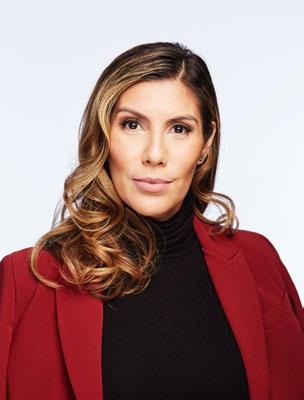 SYLVIA BANDERAS COFFINET CEO Latino Media Network
SYLVIA BANDERAS COFFINET CEO Latino Media Network
“I made it my personal mission to help create, change, and build media ecosystems that honored authentic narratives, representation, diversity, and visibility. These are more than DEI buzzwords; they are principles that help build belonging in our society, and that’s at the core of LMN’s mission.”
–SYLVIA BANDERAS COFFINET
READ MORE FROM SYLVIA
BANDERAS COFFINET
to help ensure that their brands and content meet the needs of Latino communities across its eighteen markets.
“When we first set out on this journey, our vision was simple: to ensure that these Spanish-language stations stay in Hispanic hands and that the content they provided would be representative of all Latinos and points of view, regardless of geography or nationality,” Valencia explains.
That vision is what intrigued Banderas Coffinet and helped her ascertain that she was in the right place, as her personal mission overlapped with the network’s in more ways than one.
“I have devoted the better part of my career to building equity in media because growing up undocumented, I felt invisible, misrepresented, and at times criminalized by media narratives that did not reflect me or my community,” Banderas Coffinet say. “I made it my personal mission to help create, change, and build media ecosystems that
COURTESY OF LMN 128 Leading Latinas
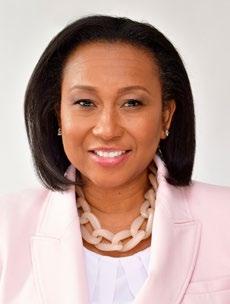 ROSE-ANNE TIFRE Chief Revenue Officer Latino Media Network
ROSE-ANNE TIFRE Chief Revenue Officer Latino Media Network
honored authentic narratives, representation, diversity, and visibility. These are more than DEI buzzwords; they are principles that help build belonging in our society, and that’s at the core of LMN’s mission.”
Together, the women behind Latino Media Network are building content that inspires and honors the Latino community, celebrates the community’s successes, and sparks conversations around the community’s most important issues and topics.
THE LEADERSHIP TENETS
Internally, they are tackling similar big questions like what kind of leaders they will be, what values will they prioritize, and how will they continue cultivating a team that can propel the network’s vision forward.
For Valencia, it comes down to ensuring that their team looks like the communities they are trying to serve. “On a broad scale, I think it is a powerful demonstration of our vision and mission of what is possible if you are committed to creating a more diverse and
“
As an Afro-Latina, it means the world to me to be part of the largest Latina C-suite. . . . Latino Media Network heard my story, listened, and knows that I will leverage my experience to ensure we succeed.”
–ROSE-ANNE TIFRE
inclusive corporate culture. It sends a strong message that women can and should be valued at the highest levels of leadership within a media organization. More importantly, that women in leadership can work together to foster an inclusive corporate culture from the top down, where individuals from various backgrounds feel welcomed and represented.”
As a cofounder, Morales Rocketto couldn’t agree more and adds how her activism shaped her leadership philosophy. “Creating a team is an exercise in figuring out how to blend your language, style, and experience to get the most out of the individual and together. We’re building a company and building a team and trying something new,” she explains. “In community organizing, we say that things ‘move at the speed of trust,’ and I love that process of building trust and relationships. That’s what makes start-ups so exciting—lots of possibilities that you turn into a reality together.
“It takes work to get to know each other and uncover everyone’s superpowers, but
COURTESY OF LMN
129 Hispanic Executive
when you are firing on all cylinders together, it feels so powerful,” she adds. “It really motivates me every day to get it right.”
While everyone’s leadership style is unique to them and the teams they lead, all four women come together under the umbrella of change and impact they believe Latino Media Network can harness.
Valencia reflected on this truth when asked about what makes their team unique and powerful.
“I think the most powerful tool we possess as a unit is that we truly are a snapshot of what the Latino community in the United States looks like,” she says. “From our family’s immigration drivers to our unique cultures and upbringings, the four of us are representative of the immense amount of diversity that exists within the Latino population in the US. Through those origin stories and personal experiences, we seek to create a space where all Latinos in each of the
communities in which we operate and the teams leading our efforts can be seen.
“If we can pour our authentic selves into this journey, together, we can help begin filling a void that has existed for so long,” she adds. “Our combined set of skills will also make us more adaptable and help to spur creativity and innovation as we grow and expand.”
AN ALL-LATINA C-SUITE’S ADVICE TO THE NEXT GENERATION
Each of these C-suiters has an impressive career trajectory preceding them, leaving a road map for the next generation of Latin xs who may want to follow in their footsteps.
“As an Afro-Latina, it means the world to me to be part of the largest Latina C-suite,” Tifre says. “Hispanic females and Black females are both sorely underrepresented in executive positions as well as sales positions in general. Latino Media Network heard my
130 Leading Latinas
“WE BELIEVE THAT OUR COLLECTIVE VOICE CAN REDEFINE OUR PLACE IN THE WORLD AND CREATE COMMUNITY COHESION THAT ALLOWS US TO BUILD A NEW FUTURE IN THE US AND ABROAD. THIS WAS, IS AND WILL CONTINUE TO BE OUR MISSION AND VISION.”
–STEPHANIE VALENCIA
131 Hispanic Executive
story, listened, and knows that I will leverage my experience to ensure we succeed. In addition, I know that my success will open the door for all young Black and Brown professionals to strive to be in the C-suite someday.”
When asked for her advice to those Black and Brown professionals hoping to follow in her footsteps, Tifre adds: “Every move you make in your career should be a strategic one in which you can contribute greatly but also a role where you can learn and keep things exciting! I also advise Latinxs to create their own personal board of mentors within and outside the community to inspire and encourage them for future growth.”
For Banderas-Coffinet, she hopes that Latinos who learn about the women behind this C-suite realize that they’ve put the cracks in the ceiling to uplift all Latinxs.
“I hope they see strength, resilience, grit, hard work, and inspiration to do great things, even when they seem impossible,” she says. “Stephanie and Jess made history by raising $80 million, one of the largest
raises by Latinas, who see less than 1 percent in venture capital funding despite being part of the largest and fastest-growing demographic in the US today. They saw an opportunity to serve and together made an impossible dream a reality.”
In similar but different ways, BanderasCoffinet and Tifre continue the legacy that both Valencia and Morales Rocketto had envisioned all along.
“In the end, we want this venture to create cultural pride for Latinos by providing content that is inspiring, and that celebrates our community including our language, our leaders, our stories, our concerns, and our possibilities,” Valencia explains. “We believe that our collective voice can redefine our place in the world and create community cohesion that allows us to build a new future in the US and abroad. This was, is and will continue to be our mission and vision.”
132 Leading Latinas
INSIGHTS
The philosophies of innovative leaders have the power to inspire and spark change. Read on for the thought-provoking insights of these successful executives.
134. Jose Aguilar, Converse 138. Evelina Rojas, On The Border Mexican Grill & Cantina 144. Patricia Diaz, PepsiCo
The Promises You Fulfill
BY WILL GRANT
As senior director of North American operations, Jose Aguilar takes a personal approach to leadership, development, and enabling operational excellence
JOSE AGUILAR KNEW HE WANTED TO join Converse for a number of years before accepting his role as senior director of North American operations in June 2022. He had spent eight years taking on progressively more senior roles at retail behemoth Nike to get its endless supply of shoes and apparel where it needed to be on time.
For most, Nike would seem like the high point, the final destination for anyone looking to grow in the operations space. While Aguilar loved his time at Nike and still has dozens of connections to the organization— plus, Nike acquired Converse in 2003—he wanted something more.
FROM ALL ANGLES
“I knew I wanted to come to Converse because of the opportunity to do so much more in this role,” Aguilar explains. “The opportunity
I’ve gotten here would have taken me years to achieve at an organization as large as Nike, and I’m lucky to serve a team of around 350 people across the country from a multitude of different perspectives.”
Aguilar oversees operations, transportation, trade and customs, distribution, inventory management, and third-party logistics for one of the most recognizable shoes on the street. The brand that was founded in 1908 has endured because of brand loyalty, a commitment to its roots, and a unique perspective on hitting goals.
To Aguilar, operational innovation is about something much bigger than tweaking practices or procedures. It’s about the promises that Converse makes to its people, its partners, and its vendors. Each objective met and exceeded is the fulfillment of a promise. That perspective makes the organization’s commit-
ment to advancing its operational efforts more personal, more invested, and more tangible.
“At Arvato, we have a natural passion for new technologies and innovation. Jose’s forward-looking approach in combination with continuously challenging status quo has been a driving factor to progress our operations,” says Mitat Aydindag, president at Arvato North America. “A big thank you to Jose and his team for this outstanding partnership.”
The senior director says that since coming to Converse, he’s been partnering with the organization to get product to its destination fast, sustainably, and without putting too much of a burden on employees who have a tendency to go above and beyond—even to their own detriment at times.
“We’re looking at redefining how we operate within our distribution centers to create more simple and scalable flow,”
134 Insights
Jose Aguilar Senior Director of North America Operations Converse
Aguilar explains. “Along with that comes how we operate as a human system. One of the most important issues there is how we enhance our sustainability so that we don’t overburden our team.
“We’re blessed to have such overachievers here that I think they can be unwilling to say no,” he continues, “and we need to make sure they have the appropriate tools to avoid burning them out and making their jobs more difficult.”
THE CHANCE FOR GROWTH
Aguilar knows a thing or two about burnout. The senior director’s early career was in the consulting world in Venezuela—an industry that drove its younger talent to the breaking point early and often. It was there that he learned about the kind of leader he wanted to be, sometimes by seeing that kind of leadership and sometimes by wishing it was there.
More than once, Aguilar wished a leader had stepped in to advocate on his behalf. His experiences are part of why mentorship has become such an important component of his leadership today.
While at Nike, Aguilar was an early participant in a leadership program that was looking to enhance its bench of talent into future lead-

RYAN STIFFLER
135
Executive
Hispanic
ers. The two-year rotational program allowed him to see Nike from four different functional areas within the organization.
“It was, without a doubt, the best growth experience I’ve had in my entire life,” Aguilar says. “Not only in my career but in life in general. It changed me on a personal level.”
He remains a mentor for that program today because he understands just how impactful the experience can be. His current mentee is from Mexico, and Aguilar says it’s an opportunity to contribute to someone’s growth in a way that allows them to celebrate their Latino connection. The pair may be from two different countries, but they still share the connection of making a life for themselves in a new environment.
FLIGHT, FAIRWAYS, AND FAMILY
The senior director is a prime mentor not just because of his career experience, but also in the challenges Aguilar continually takes on outside of his day job. In fact, he is a licensed pilot who, like so many pilots before him, was inspired to fly the first time he saw Top Gun
If he’s not in the sky, Aguliar can be found on the fairway. The avid golfer says both flying planes and working his way out of sand traps have informed his work life.
“You learn to accept those things that you cannot control and those that you can,” the executive explains. “You can control your thoughts and your decision-making. But sometimes you just have to learn to accept the results and learn from them. You can make all of the plans in the world, but sometimes the weather changes in the sky and sometimes your ball winds up in the water. You just have to do your best.”
As the father of four kids under the age of ten, Aguilar’s most challenging job might still be at home. He and his wife have made a concerted effort to travel with their kids, both back to Venezuela where both their families reside as well as to new and interesting locations that will expose their kids to the rest of the world.
“My family is my purpose,” Aguilar says succinctly. “I love what I do, but my life is really about spending time with the people I love and helping them find their way. As a leader, there’s a promise that I’ve made to give everything of myself for the advancement of my team. I owe that to my family, too.”
136 Insights

We take your business to the next level
We congratulate Jose Aguilar on the well-deserved recognition of his professional accomplishments and are proud to partner with Converse.
Logistics seems so simple – just goods in and goods out. For us there is so much more to it.
When it comes to complex fulfillment process, high peak volumes, increasing delivery speeds and more individual customer needs, we are the right partner for you. We combine innovation and physical logistics to deliver best-in-class service to your end customers.
Find out what we can do for you.

For more information, please visit www.arvato.com.
BY NOAH JOHNSON
Evelina Rojas shares her work/life balance journey and how it’s made her a better leader at On The Border Mexican Grill & Cantina

Advocate for Yourself
ASHLEY LUGO RIOS
138 Insights
Evelina Rojas VP of HR
 EVELINA ROJAS, VICE
EVELINA ROJAS, VICE
PRESIDENT
OF
HUMAN resources at On The Border Mexican Grill & Cantina, has spent her life advocating for others, both inside and outside of work. But it wasn’t until the COVID-19 pandemic when she realized she wasn’t advocating enough for herself.
“I joined On The Border in 2016 as a first-time mom who worked really long hours, trying to build solid relationships and to be everything for everyone. No one was asking me to take that kind of initiative, but I just wanted to prove myself,” she recalls. “But the pandemic put me in my place. I was coming back from maternity leave after having my third child, and we were doing mass layoffs the day I returned from leave. The next day, they said I’d be a part-time employee, who only worked twenty hours per week with no timeline on how long it would last.”
Though she would eventually be reinstated as a full-time HR director in 2020, the time she spent as a part-time employee was a reality check. It forced her to think about improving her work/life balance and to take inventory of what really mattered. Today, she shares lessons from that journey with her colleagues aiming to grow in their roles, women aspiring to be leaders, and
On The Border Mexican Grill & Cantina
139
Executive
Hispanic
other professionals who want to be successful in their careers.
“Advocate for yourself or have someone to do it for you,” she advises. “Be open to asking for growth, raising your hand, and say, ‘I don’t know anything about this, but I’d like to learn.’ The worse thing anyone can say is ‘no,’ but you need to make sure you advocate for that experience and that exposure. Keeping your head down and working really hard won’t get you promoted. You need to build relationships with stakeholders, to build a level of credibility so they see your potential.”
That commitment to growth and relationship-building is what helped Rojas as she reentered On The Border full-time. She was faced with a department that needed restructuring, a new leadership team, less manpower, and more responsibilities. Despite those challenges, her efforts have helped the organization bridge the
gap between support and operations while setting it on a path towards growth.
Recently, she’s turned her attention toward developing the company’s managers through face-to-face strategy meetings and situational leadership training. Her department is also working to do personality assessments to better understand the manager’s communication styles.
“We just want to understand who needs what level of communication. Do they need the pleasantries, or do they want direct feedback? We’re trying to empower our people to reach out and ask questions, and the best way to do that is to meet them where they are,” she says. “We also believe the situational leadership training will teach them to understand the leaders they are and allow them to better manage the workforce. They’re the ones on the front lines, and if they don’t have a great work experience, we can’t expect our guests to have one either.”
140 Insights
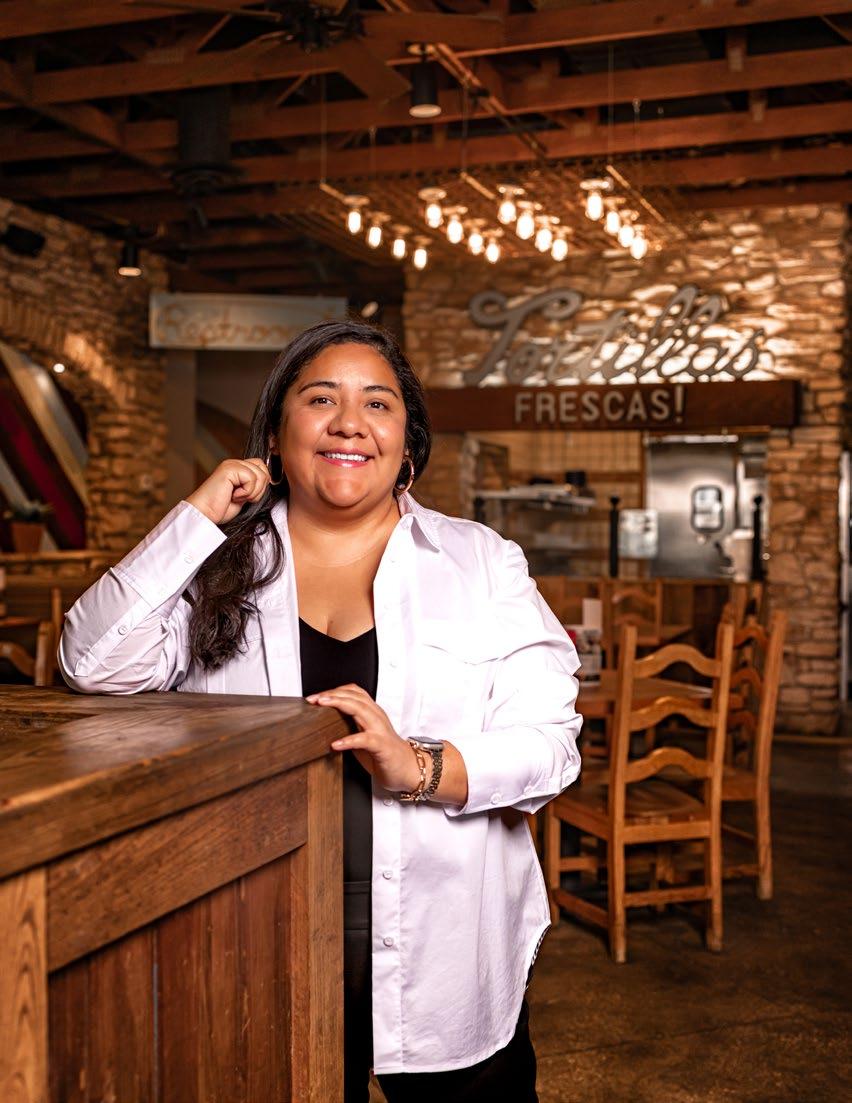
ASHLEY LUGO RIOS 141
Executive
Hispanic
Keeping your head down and working really hard won’t get you promoted. You need to build relationships with stakeholders, to build a level of credibility so they see your potential.”
142 Insights
Rojas, who was born in Mexico and moved to the US at two years old, has always been the “go-to” in her family. Her father always thought she would become an attorney because of the way she advocated for others and argued a point. At just fourteen, she leaned on those innate skills to translate during worker’s compensation claim negotiations with her dad’s employer. She told that story to a hiring manager during an interview years later and ended up getting her first HR role as a senior administrator of worker’s compensation.
“They had already decided on who they wanted to hire, and I came into the interview with no previous HR or worker’s comp experience. But I just shared my real-life story about how I was the liaisons between my father, his employer, and his adjusters,” she says. “I drew parallels between that and what the role would require of me. It
taught me to be well buttoned up, how to document things, and how to follow up.”
Rojas went on to work two years in that role before she was recruited as an HR generalist supporting five hundred Chuck E. Cheese restaurants. From there, she worked as an HR manager at Day Star Restaurant Group and an HR business partner at Focus Brands.
In addition to developing the On The Border’s people, the VP is focused on giving her team exposure to new areas to spark their curiosity and advance them in their careers.
“If you keep someone in a box, it turns off that inquisitiveness, freedom to share feedback, and to gain knowledge,” Rojas says. “You have to show your team how we support the business and how we build credibility so it can help them in the future.”

143 Hispanic Executive
A WORLD WHERE PACKAGING ISN’T WASTE
 BY JOSEPH STARK
BY JOSEPH STARK
How PepsiCo drives its vision for sustainability and sustainable packaging across its global footprint
BILLIONPHOTOS.COM / ADOBE STOCK
144 Insights
For the last few years,
PepsiCo has made its ultimate sustainability goals clear.
As a company that has products consumed more than a billion times a day in more than two hundred countries around the world, the powerhouse brand believes one of its responsibilities is to create a world where packaging never becomes waste.
It is a vision that’s especially critical, considering the company’s robust packing value chain and its potential impacts on human health and human rights. That’s why PepsiCo has showed its commitment to sustainable packaging through three (of many) of initiatives and strategies.
“SUSTAINABLE FROM THE START” AND DESIGNING FOR SUSTAINABILITY
The “Sustainable from the Start” program sees the company evaluate the environmental footprint of its products during the design stage. It analyzes emissions, water usage, and packaging materials to inform its product development processes. As a result, the company encourages the use of lowercarbon materials wherever it can, including the use of resources like post-consumer recy-
cled content, renewable biomass as feedstock, and reusable packaging.
The company leans on sustainable design standards specific to plastic packaging. As a signatory to the New Plastics Economy Global Commitment, PepsiCo has committed to eliminate plastic items it doesn’t need; to innovate so all plastic it uses is designed to be safely reused, recycled, and composted; and to circulate everything it uses to keep it in the economy and out of the environment.
SUSTAINABLE SOURCING OF FIBER AND OTHER BIO-BASED MATERIALS
One of PepsiCo’s ambitious goals has been to realize zero deforestation in company-owned and operated activities and in global supply chains, including fiber supply chains. From direct supplier to source of production, the company seeks to source wood fibers for packaging that originate from certified forests. For other bio-based packaging materials, the company aligns with globally accepted standards and gets certifications from credible third parties.
PEPSICO’S SUSTAINABILITY GOALS
Spread adoption of regenerative farming practices across seven million acres of land by 2030
Reduce absolute greenhouse gas emissions in its value chain by more than 40 percent and a 75 percent reduction in direct operations emissions by 2030
Improve operational water-use efficiency by 25 percent in high water-risk areas by 2025
Cut virgin plastic from nonrenewable sources per serving across global beverages and convenient foods portfolio by 50 percent by 2030
GOPAL / ADOBE STOCK, DMYTRO / ADOBE STOCK, CHELSEA91 / ADOBE STOCK
145 Hispanic Executive
Prystup Packaging congratulates our Innovation and Sustainability partner and friend - PepsiCo’s Patricia Diaz on her amazing career!
Prystup is a Nationally Certified Woman (WBEC) and Native American (NMSDC) owned manufacturer of printed paperboard folding cartons.
We maintain strict food safety (SQF2000) and sustainability certifications (FSC/SFI) to ensure our customer products are produced with the highest level of quality, safety, and sustainability.
Family-owned since 1980; we remain guided by our founding principles of Family, Integrity, and Excellence.

Visit our website at www.prystup.com or give us a call at 205.652.9583 and allow our packaging experts to demonstrate why Prystup is the premier independent supplier of paperboard folding cartons nationally.
As procurement director of paperboard and corrugate packaging in North America, Patricia Diaz spends a lot of time working with colleagues to bolster the company’s efforts on these fronts. She oversees initiatives related to all fiber-based packaging materials in North America, including cups, cartons, and anything in cardboard.
Like many other leaders in the company driving its sustainability strategy, she works to source materials, look at cuttingedge innovation, develop supplier partnerships, and implement strategies that reduce the use of materials.
PACKAGING PARTNERSHIPS AND ENGAGEMENT
To pursue its sustainability goals, PepsiCo has also leveraged a wide variety of
partnerships. It’s an investor in the Alliance to End Plastic Waste, a nonprofit organization partnering with business, government, and civil society to create and scale innovative solutions to end plastic waste around the world with a focus on communities vulnerable to the risk of plastic leakage.
It’s a member of the Business Coalition for a Global Treaty on Plastic Pollution, which brings together businesses and financial institutions committed to developing an ambitious and legally binding UN Treaty to end plastic pollution.
The company also is a founding investor in Circulate Capital’s Ocean Fund, which invests in solutions to reduce ocean plastic pollution in South and Southeast Asia.
BILLIONPHOTOS.COM/ADOBE STOCK
146 Insights 146 Insights
147 Hispanic Executive A guide
Industry Index
14 Lynn Trevino-Legler VP of Legal and Head of Litigation Yellow
96 Julissa Soto CEO and Founder Julissa Soto Latino Health Equity Consulting
122 Rebecca Núñez Founder and CEO The MRN Agency
Finance
20 Jeffrey Mercado Segment Leader and Senior Managing Director for Commercial Banking, Law Firm Banking Webster Bank
24 Nicolas Perez Stable COO and Chief Legal Officer Wings Capital Partners
38 Carlos Quezada Vice Chairman of the Board and CEO Carriage Services
56 Eric Chico SVP of Technology Finance East West Bank
76 Priscilla Almodovar CEO Fannie Mae
Food & Beverage
92 Sandra Martínez CEO Nestlé Oceania
138 Evelina Rojas VP of HR On The Border Mexican Grill & Cantina
Auto/Transportation
to the diverse professions featured in this issue
Consulting
Industry Index
42
68
50 Maria Ortega
88 Javiera
118 Lara
28
32
126 Stephanie Valencia
126 Jessica Morales Rocketto
126 Rose-Anne
126 Sylvia Banderas Coffinet
Healthcare
Alex Bernal SVP of Finance Humana
Richard Fernandez CFO Great HealthWorks Manufacturing
Rina Teran US Chief Counsel, Chief Securities Counsel, and Assistant Corporate Secretary Constellium
Estefania Souza Senior Corporate Counsel of M&A, Finance & Securities National Instruments Corporation
Media & Entertainment
Finance Transformation Sony Pictures Entertainment
VP of
Amazon
Balmaceda Head of Local Originals, Latin America, Canada & Australia
Studios
TelevisaUnivision
Bueso Bach SVP of Litigation
Latino Media Network
Cofounder
Latino Media
Cofounder
Network
Latino
Tifre Chief Revenue Officer
Media Network
Latino Media Network 148 Index
CEO
Nonprofit
Retail
Tech
A guide to the diverse professions featured in this issue
112 Mónica Ramírez President and Founder Justice for Migrant Women
134 Jose Aguilar Senior Director of North America Operations Converse
62 Adriana Torres SVP, Global Head of Customer Support Oracle
106 Catalina Laverde Senior Engineering Manager Spotify
149 Hispanic Executive

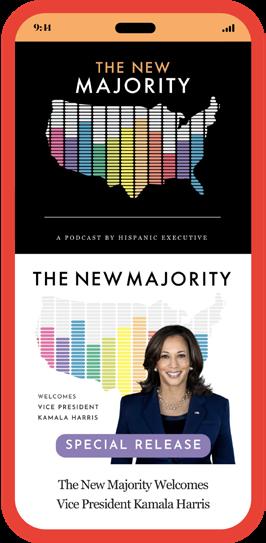
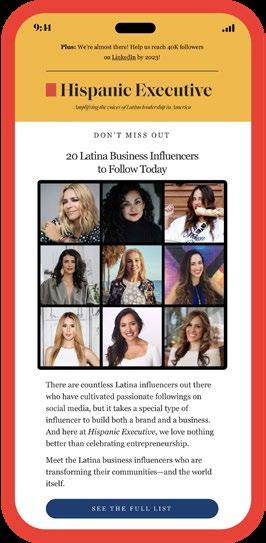
Sign up for the Hispanic Executive newsletter to access exclusive digital content including how-to, humor, and opinion articles, as well as videos, podcast episodes, exclusive events, and more. Free | Biweekly on Tuesdays Scan the QR code with your smartphone camera to subscribe to the newsletter, or visit hispanicexecutive.com/newsletter Let’s Take This Online Join the conversation with our network of over 15,000 Latino leaders and allies! The Latino Majority Welcomes Vice President Kamala Harris 150 Beyond the Magazine
®

Emtrain approaches topics on Ethics, Respect, Inclusion, and Belonging as skills to develop and strengthen based on our eLearning solution. But you can't change what you don't measure.
Emtrain measures the strengths of these skills in organizations.
Here's how we do that:

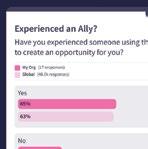








Our training courses showcase videos that illustrate the skill.
We pulse learners about how they’re experiencing your culture as it relates to these topics and skills.
We aggregate the responses, score the organizational skills, then benchmark based on those scores.
Your organizational scores can be segmented by function, division, team, location, and more, so you can see the areas of your organization that are strong in these competencies. Leaders will be able to focus on the teams that need improvement in the areas of ethics, respect, inclusion, and belonging. As a result, you will see positive culture outcomes that impact your key business outcomes.
Emtrain provides eLearning and analytics that measure the impact of social dynamics in the workplace. Emtrain's solutions go beyond compliance to develop inclusion, ethics and respect as professional competencies via video-based training to build skills. Emtrain's platform is used by more than 600 companies including Chevron, Degreed, Glassdoor, Genentech, Whirlpool and more.

Contact info@emtrain.com to see a free preview of Emtrain Analytics. www.emtrain.com
TAKE CHARGE OF YOUR CAREER
 Sandi ASSISTANT DIRECTOR SOFTWARE ENGINEERING
Sandi ASSISTANT DIRECTOR SOFTWARE ENGINEERING
AT NORTHWESTERN MUTUAL YOU HAVE ENDLESS OPPORTUNITIES TO MAKE AN IMPACT.
©2022 Northwestern Mutual is the marketing name for The Northwestern Mutual Life Insurance Company (NM), Milwaukee, WI and its subsidiaries CAREERS.NORTHWESTERNMUTUAL.COM

 The Leading Latinas Issue featuring leaders from Latino Media Network, Amazon Studios, Spotify, and more P74
The Leading Latinas Issue featuring leaders from Latino Media Network, Amazon Studios, Spotify, and more P74













 Vianni Lubus
VP, Hispanic Division and Head of Audience & Engagement
Vianni Lubus
VP, Hispanic Division and Head of Audience & Engagement



















 By Zach Baliva
By Zach Baliva








 By Natalie Kochanov
By Natalie Kochanov



 Nicolas Perez Stable reflects on the choices that helped him grow into more significant roles in private equity
Nicolas Perez Stable reflects on the choices that helped him grow into more significant roles in private equity

 ELIZABETH BOOCKS
ELIZABETH BOOCKS


 By Billy Yost
By Billy Yost



 By Billy Yost
By Billy Yost








































 Richard Fernandez CFO Great HealthWorks
Richard Fernandez CFO Great HealthWorks







 PRISCILLA ALMODOVAR CEO
PRISCILLA ALMODOVAR CEO












 By Noah Johnson
By Noah Johnson


 By Noah Johnson
By Noah Johnson

 By Frederick Jerant
By Cass Davis
How Julissa Soto’s experience with the US healthcare system compelled her to become one of Colorado’s leading public health advocates for the Latino community
Portraits
By Frederick Jerant
By Cass Davis
How Julissa Soto’s experience with the US healthcare system compelled her to become one of Colorado’s leading public health advocates for the Latino community
Portraits

 JULISSA SOTO CEO and Founder Julissa Soto Latino Health Equity Consulting
JULISSA SOTO CEO and Founder Julissa Soto Latino Health Equity Consulting






 By Billy Yost
By Billy Yost






 By Billy Yost
By Billy Yost

 By Natalie Kochanov
By Natalie Kochanov



 By Claire Redden
By Claire Redden

 By Vivian Nunez
By Vivian Nunez

 SYLVIA BANDERAS COFFINET CEO Latino Media Network
SYLVIA BANDERAS COFFINET CEO Latino Media Network
 ROSE-ANNE TIFRE Chief Revenue Officer Latino Media Network
ROSE-ANNE TIFRE Chief Revenue Officer Latino Media Network




 EVELINA ROJAS, VICE
EVELINA ROJAS, VICE


 BY JOSEPH STARK
BY JOSEPH STARK













 Sandi ASSISTANT DIRECTOR SOFTWARE ENGINEERING
Sandi ASSISTANT DIRECTOR SOFTWARE ENGINEERING